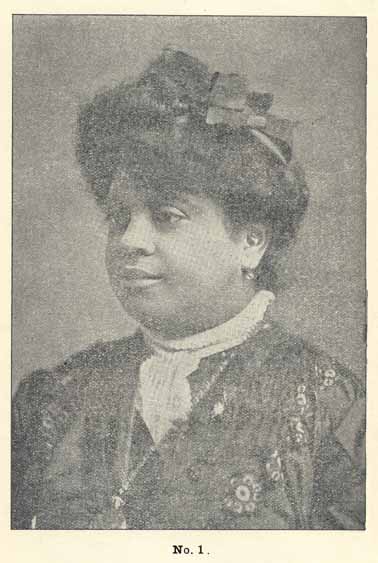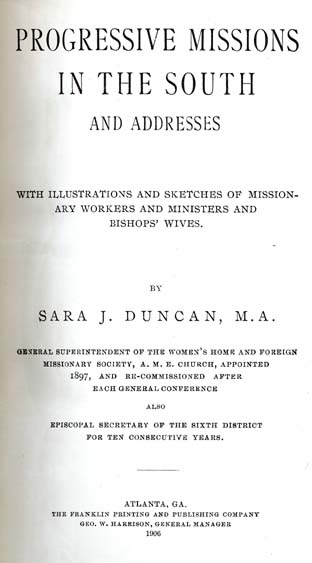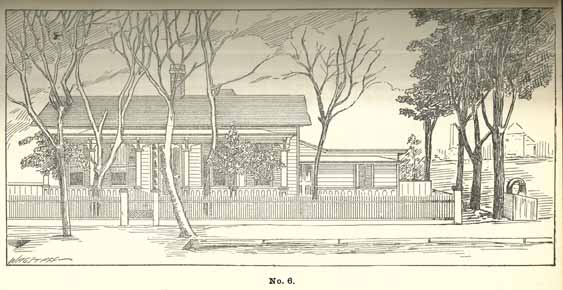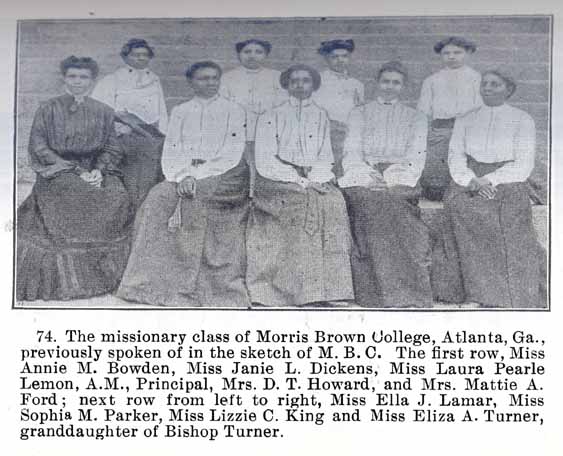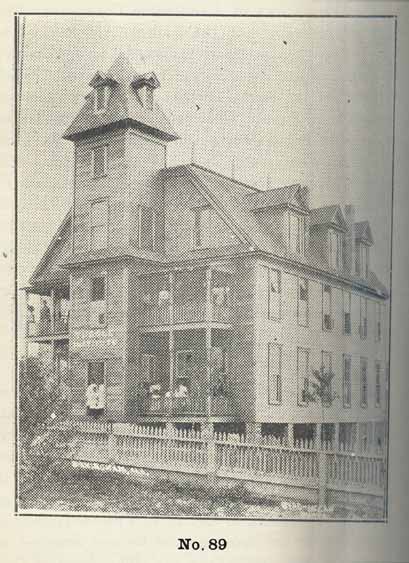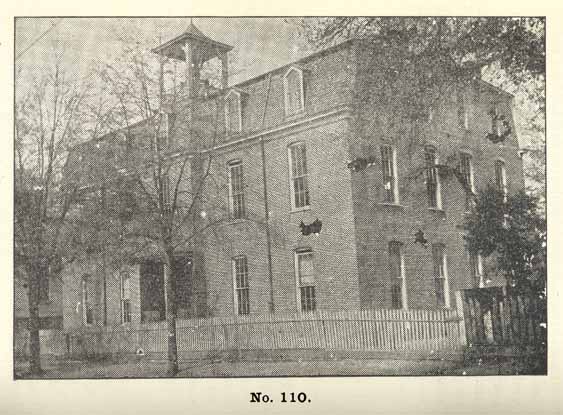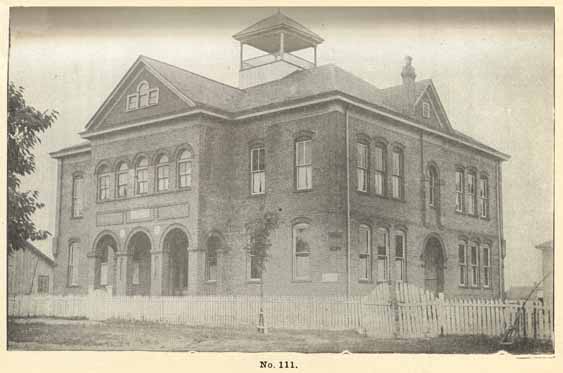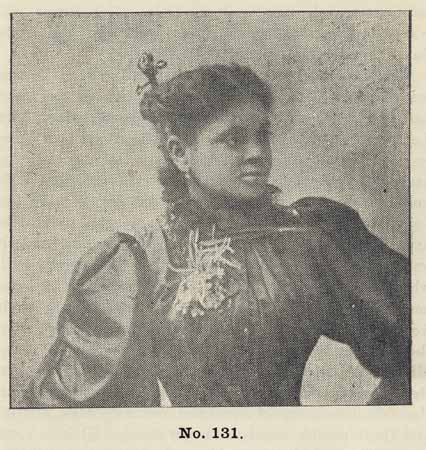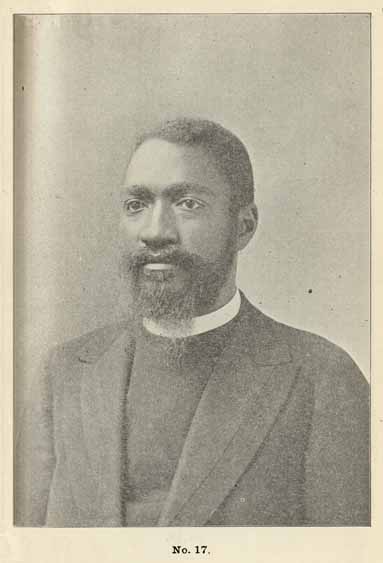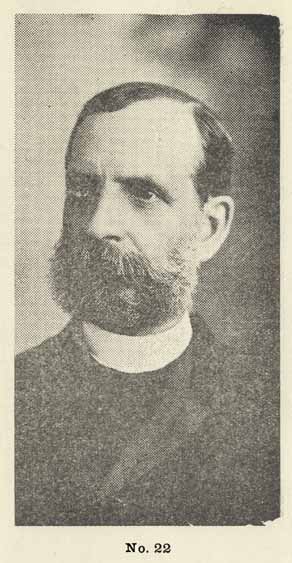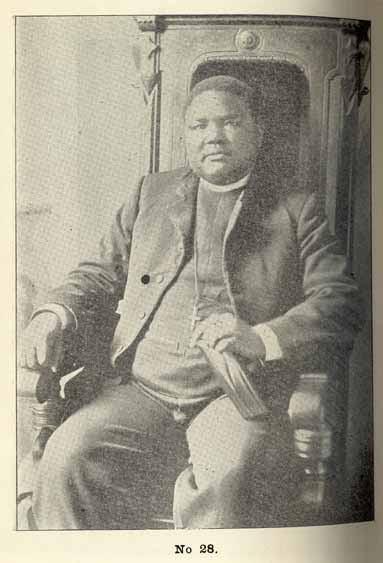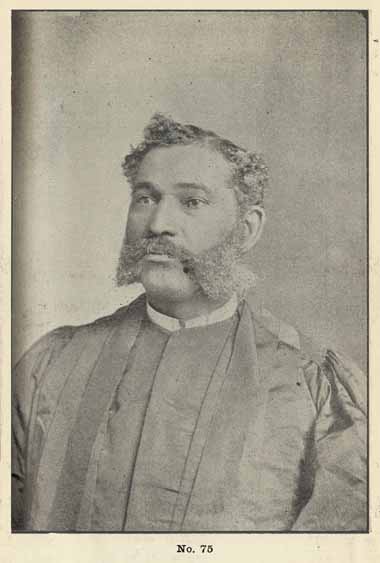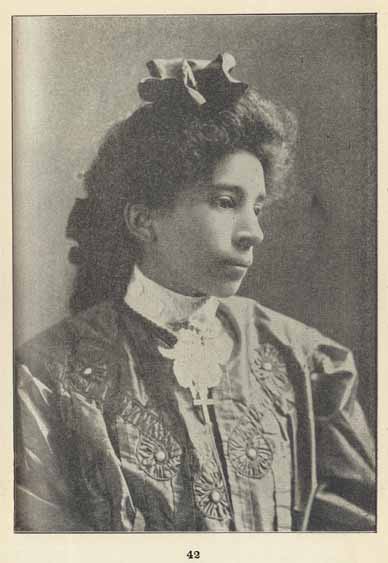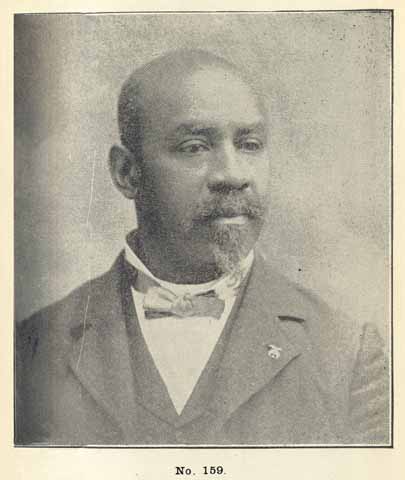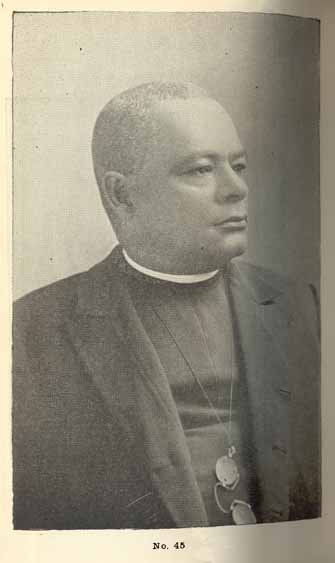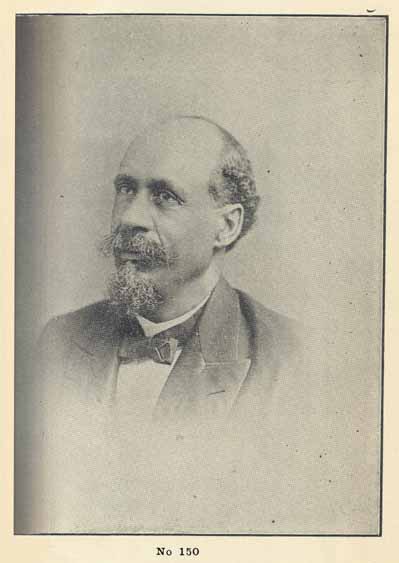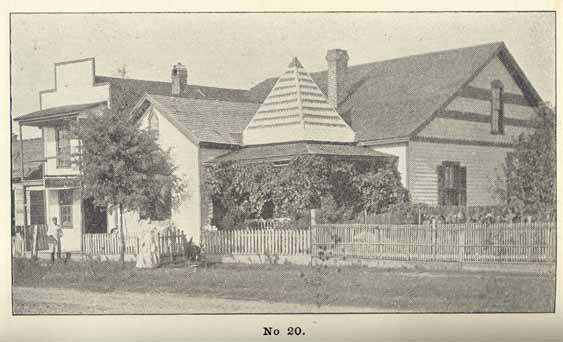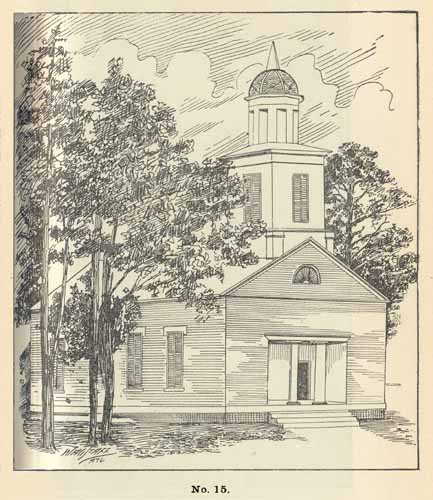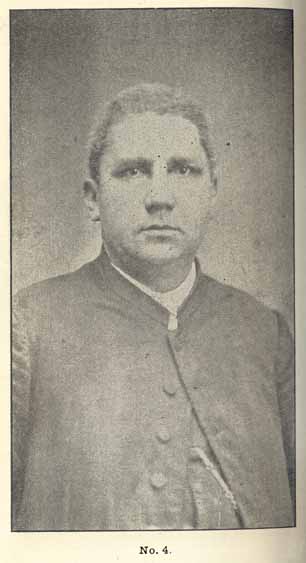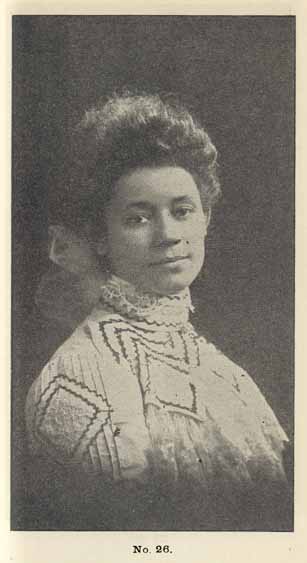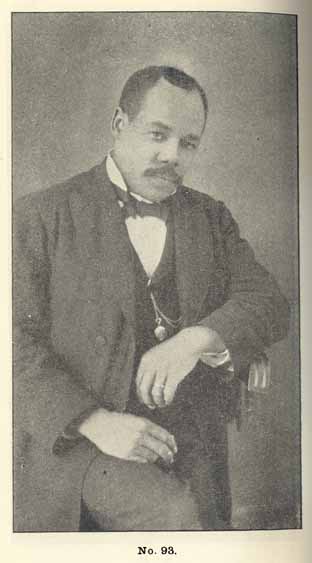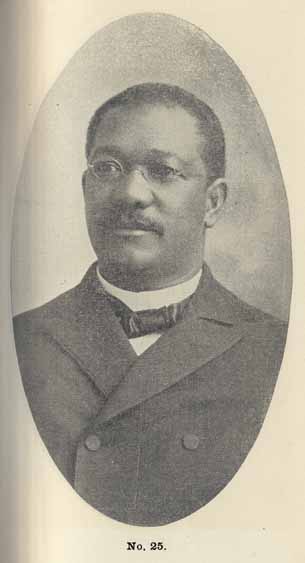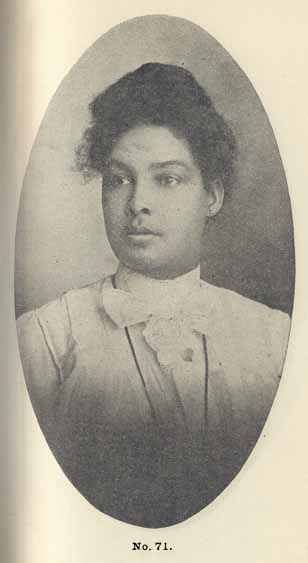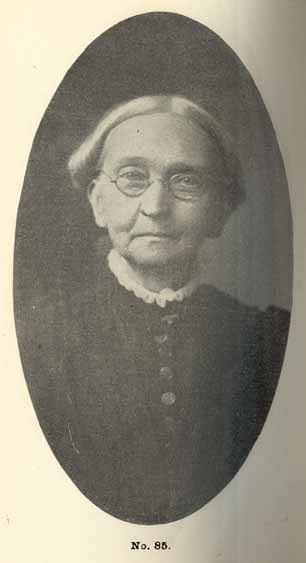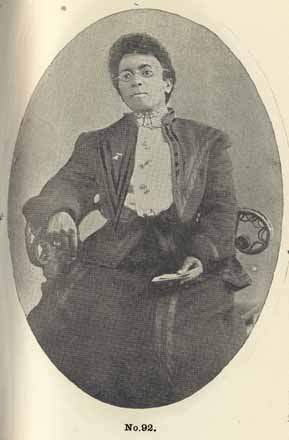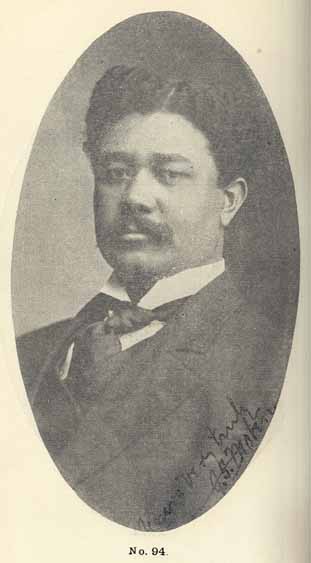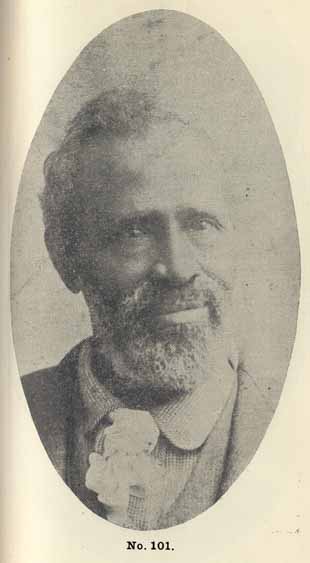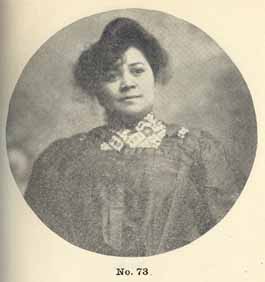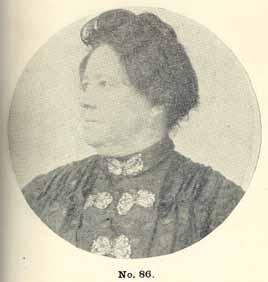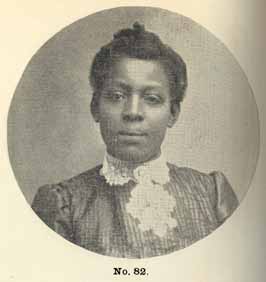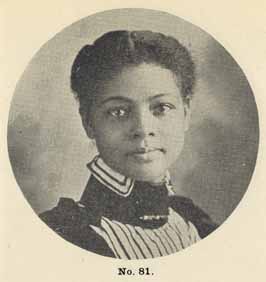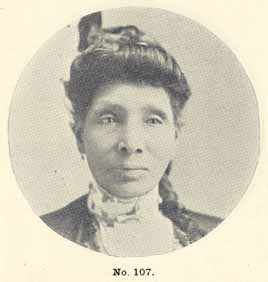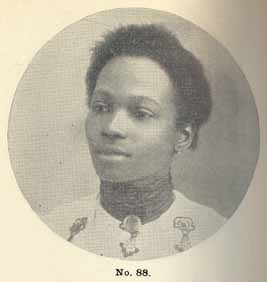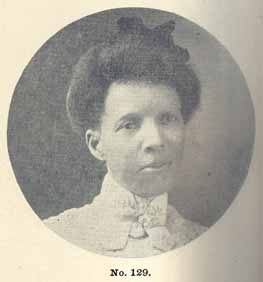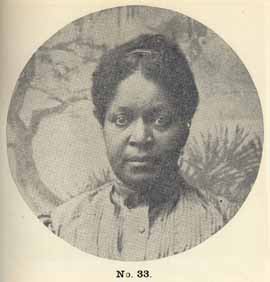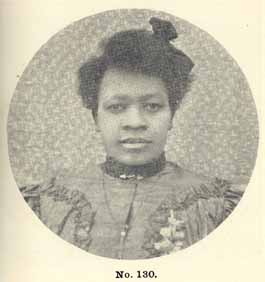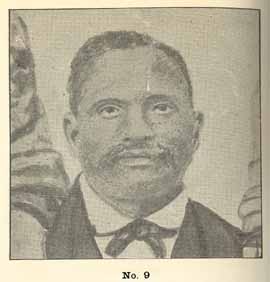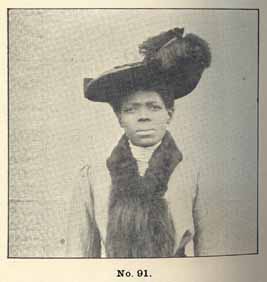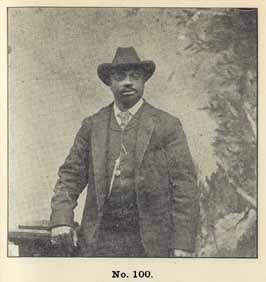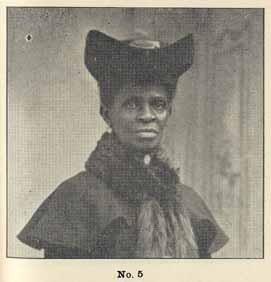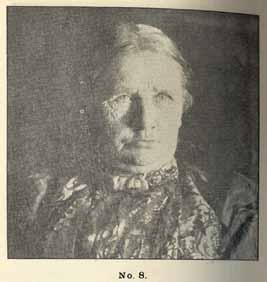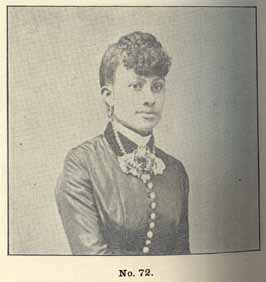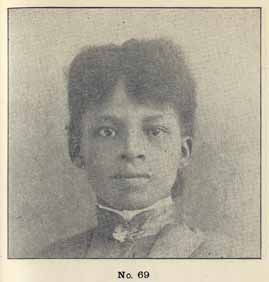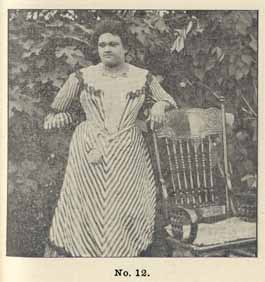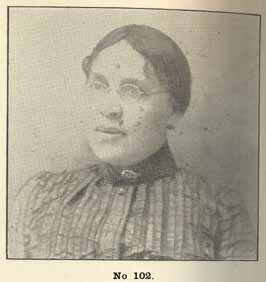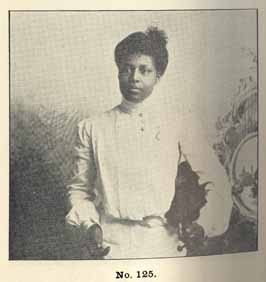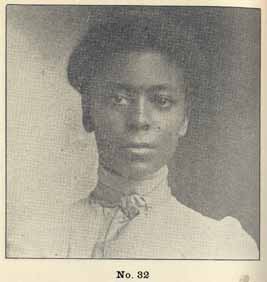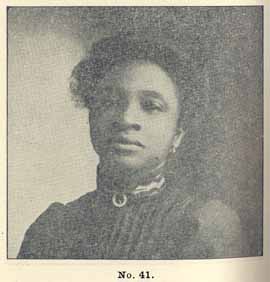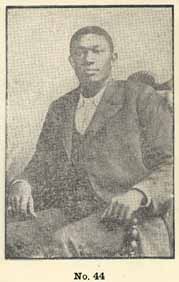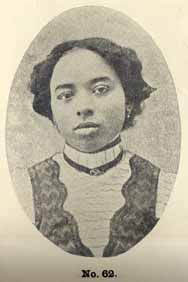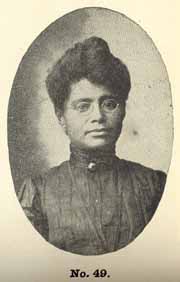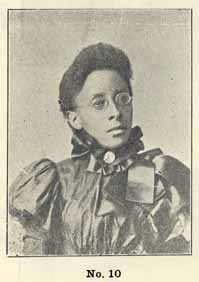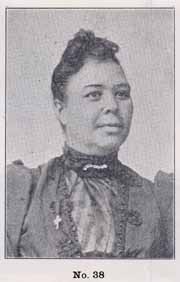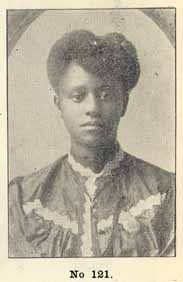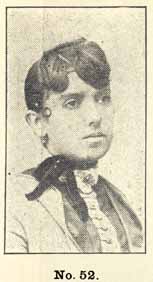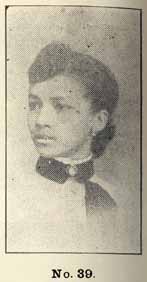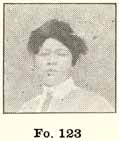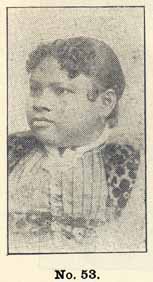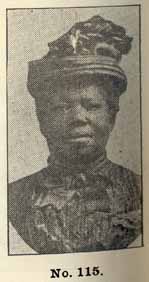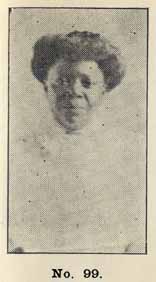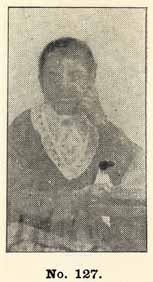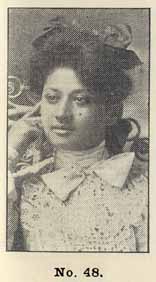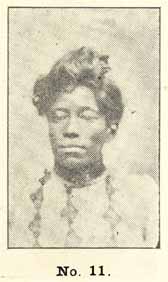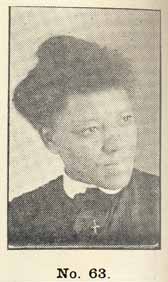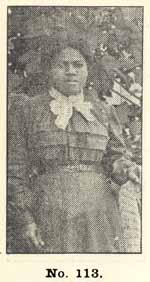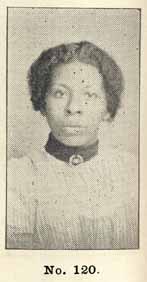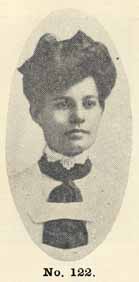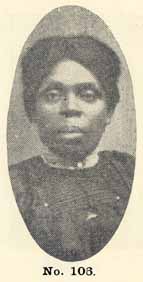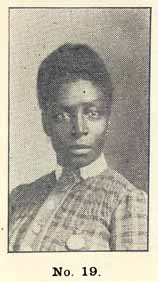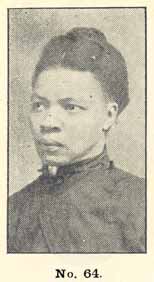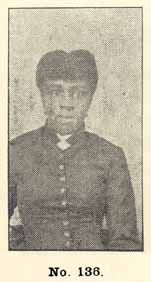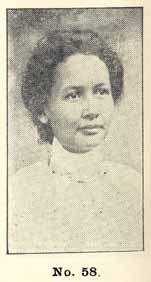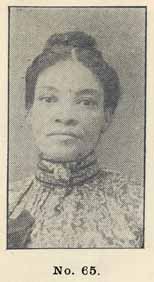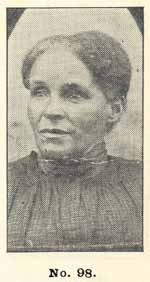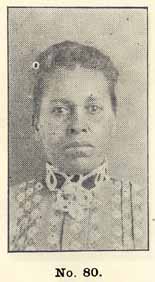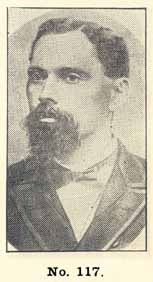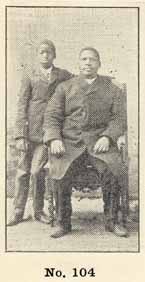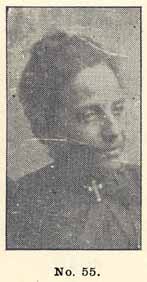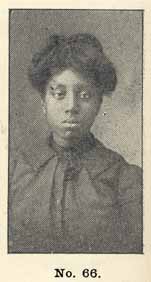Progressive Missions in the South and Addresses;
With Illustrations and Sketches of Missionary Workers and Ministers and Bishops' Wives:
Electronic Edition.
Duncan, Sara J.
Funding from the Library of Congress/Ameritech National Digital Library Competition supported the electronic publication of this title.
Text transcribed by
Apex Data Services, Inc.
Images scanned by
Sarah Reuning
Text encoded by
Apex Data Services, Inc., Courtney L. Vien, and Jill Kuhn Sexton
First edition, 2000
ca. 450K
Academic Affairs Library, UNC-CH
University of North Carolina at Chapel Hill,
2000.
Source Description:
(title page) Progressive Missions in the South and Addresses; With Illustrations and Sketches of Missionary Workers and Ministers and Bishops' Wives
Sara J. Duncan, M. A.
299 p.
Atlanta, Ga.
The Franklin Printing and Publishing Company
1906
Call number 266.178 C843P (Divinity School Library, Duke University Libraries)
The electronic edition is a part of the UNC-CH
digitization project, Documenting the American South.
The text has been encoded using the
recommendations for Level 4 of the TEI in Libraries Guidelines.
Original grammar, punctuation, and spelling have been preserved. Encountered
typographical errors have been preserved.
Any hyphens occurring in line breaks have been removed, and the trailing part of a word has been joined to the preceding line.
All quotation marks, em dashes and ampersand have been transcribed as
entity references.
All double right and left quotation marks are encoded as " and "
respectively.
All single right and left quotation marks are encoded as ' and ' respectively.
All em dashes are encoded as --
Indentation in lines has not been preserved.
Running titles have not been preserved.
Spell-check and verification made against printed text using Author/Editor (SoftQuad) and Microsoft Word spell check programs.
Library of Congress Subject Headings, 21st edition, 1998
Languages Used:
- English
- Latin
LC Subject Headings:
- African Americans -- Biography.
- African American women -- Biography.
- African American missionaries -- Biography.
- Spouses of clergy -- Southern States -- Biography.
- African Methodist Episcopal Church -- Missions.
- Missions -- Southern States.
- Missions -- Africa.
Revision History:
- 2001-06-28,
Celine Noel and Wanda Gunther
revised TEIHeader and created catalog record for the electronic edition.
-
2000-10-23,
Jill Kuhn Sexton, project manager,
finished TEI-conformant encoding and final proofing.
-
2000-08-21,
Apex Data Services, Inc.
finished transcription and TEI/SGML encoding
PROGRESSIVE MISSIONS
IN THE SOUTH
AND ADDRESSES
WITH ILLUSTRATIONS AND SKETCHES OF MISSIONARY
WORKERS AND MINISTERS AND
BISHOPS' WIVES.
BY
SARA J. DUNCAN, M.A.
GENERAL SUPERINTENDENT OF THE WOMEN'S HOME AND FOREIGN
MISSIONARY SOCIETY, A. M. E. CHURCH, APPOINTED
1897, AND RE-COMMISSIONED AFTER
EACH GENERAL CONFERENCE
ALSO
EPISCOPAL SECRETARY OF THE SIXTH DISTRICT
FOR TEN CONSECUTIVE YEARS.
ATLANTA, GA.
THE FRANKLIN PRINTING AND PUBLISHING COMPANY
GEO. W. HARRISON, GENERAL MANAGER
1906
Page 3
TO THE
SWEET MEMORY OF MY LOVING AND AFFECTIONATE FATHER,
S. G. HATCHER, TRUSTEE AND CLASS LEADER OF BROWN
CHAPEL, A. M. E. CHURCH, SELMA, ALABAMA,
AND ONE OF THE FIRST LAY TRUSTEES OF
PAYNE UNIVERSITY, A FAITHFUL WORKER
FOR CHRIST, DEPARTED THIS LIFE
SEPTEMBER 29, 1899;
TO MY SWEET, DEVOTED SISTERS, FRANCES AND GEORGIA, WHO,
BY PERSONAL HELP AND WORDS OF ENCOURAGEMENT,
HAVE BID ME GODSPEED;
TO MY DEVOTED AND FAITHFUL HUSBAND, WHO GAVE A HELPING
HAND IN TRYING HOURS OF NEED AND
RESPONSIBILITY OF THE WORK;
TO MY DEVOTED FOSTER-MOTHER, SARA J. MORGAN, WHO WITH
HER PRAYERS AND TEARS, UNDER THE WEIGHTY
RESPONSIBILITY OF A DEATH - BED PROMISE
TO NURTURE AND PROTECT A BABE
TO A USEFUL CHRISTIAN LIFE;
TO THE BISHOPS, PRESIDING ELDERS, MINISTERS, BRETHREN,
SISTERS, AND FRIENDS OF AFRICAN METHODISM, AND MY
FAITHFUL CO-WORKERS, WHO HAVE GIVEN THEIR
TIME, TOIL, AND HARD-EARNED CONTRIBUTIONS,
THROUGH SWEAT AND TEARS, TO THE
MISSIONARIES OF HIS CROSS;
TO MY ENCOURAGING FRIENDS OF ALL DENOMINATIONS; LAST,
BUT NOT LEAST, TO THE YOUNG WOMEN WHO WRITE AND ASK
PRAYERS AND ENCOURAGEMENT, AND ALL INTO WHOSE
HANDS THIS LITTLE VOLUME MAY CHANCE TO
FALL, WITH THE PRAYER FOR THE HIGHEST
LITERARY, MORAL AND SPIRITUAL EXCELLENCE
THAT CAN COME TO A RACE
OF USEFUL WOMEN, IS THIS
DEDICATED
BY THE AUTHOR.
Page 5
OTHERS shall sing the song,
Others shall right the wrong--
Finish what I begin,
And all I fail or win.
What matter I or they?
Mine or another's day.
So the right word be said
And life the sweeter made.
Whittier.
Page 7
INTRODUCTION.
BY BISHOP HENRY MCNEAL TURNER, D.D., LL.D., D.C.U.
Christian missions, in an organized form, is the propelling power that disseminates and extends civilization and knowledge in general, among the barbarous nations of earth, and brings mankind of every nation, hue and color to the threshold of intellectual and spiritual development. It possesses the basic elements as an institution or otherwise of all that evolves man's moral nature, and makes him the creature of order, law and the operator of just and righteous deeds, thereby enabling him to do unto others as he would that others should do unto him, which is made complete in loving God with all his heart, soul, mind and strength, and his neighbor as himself. It may sound strange, nevertheless it is true, but Christian missions contain every grace, every virtue and every ornament that will correspond with man's complex nature, and impart to it a finish that will enable him to revolve in the proper sphere in this life, and prepare him for the life reserved for him in the hereafter. David Hume, the great scholar and world-renowned historian, and thousands of his way of thinking and reasoning, have assumed that what we commonly call education, mere literary culture, will mould and fashion man into what he was originally designed to be, when he came from the hands of his Creator. But dry learning, in the abstract, through the ages and ages, has presented the world with no such specimen. Homer, the great Grecian poet, Euripides, who stood at the summit of earthly culture, and Edward Gibbon, of great fame, not only as a historian, but as
Page 8
the philosopher of history, should have been the most pious, astute and orderly of men if this kind of reasoning was true.
Industrial and mechanical education and skill, and the most sensitive touch in the studio of art has not presented the world with a finished man or woman. But these combined with the basic principles and teachings which come from Christian missions, have given the completed touch, and man has been made the master of earth and an heir of heaven. And nothing that can occupy his attention deserves more protracted and patient consideration. The fact that Christ Himself descended to earth, in His entirety, as a missionary, to offer everything to the world, that it stood in need of, makes Him the prototype or model of all who should be sent after Him till millennial glory shall extend from pole to pole, and this necessarily makes the subject of Christian missions the most exalted topic that ever engaged the attention of man. Literature, history, science, philosophy, logic, including all their branches, is a mere bagatelle when compared to mission work. In other words, the study of Christian missions should be the chief topic of our consideration, while the world of mankind is so barbarous. Murder and every form of outrage is the curse of the world, and will be till mission labors shall transform it.
We are glad to see that Mrs. Sara J. Duncan, of Selma, Ala., the general superintendent of the Woman's Home and Foreign Missionary Society of the African M. E. Church, who has occupied this exalted position for ten years, has prepared a sketch of the doings and labors of the women of our race, entitled "Progressive Missions in the South," and we have been honored by being asked to write a brief introduction. We regret, however, that a multiplicity of other business and the recognized inability of the writer renders him wholly incapable of performing this duty creditably.
Page 9
After carefully and deliberately reading the synopsis of its contents, with pleasure, and uninfluenced by motives of friendship for the author, we have consented to pen a few lines. Progressive Missions in the South contains narratives and addresses which will be of benefit to the women of our race, resulting in infinite good. We take pleasure in trying to write this introduction, First, because it is in no sense an imitation of any work of the kind. Secondly, it is a splendid presentation of the sacred cause of missions, especially for the women of the A. M. E. Church. Free from selfishness, and giving ample space to that of other Christian denominations, which is a manifestation of excellent judgment, and no ordinary skill. The author, though a young woman, yet in her thirties, has evidently given much time and careful study to the subject, and has in her a spiritual influence and power for saving the lost and helping to maintain the Gospel standard of life and the church of Christ.
While the author has made the book interesting and even fascinating, by giving illustrations and many points of interest from her own city and State, it exhibits a spirit of unselfishness and a desire to show that all can be of use, for the betterment of humanity and the uplift of the race.
The religious and pious tone of the book is worthy, and even merits mention, and is given in language well chosen and acceptable. We say without exaggeration that the religious sentiment which dominates the book, and the great rewards proffered, is presented in a most attractive form.
The A. M. E. Church is blessed with two missionary societies, composed of females. One is known as the Woman's Parent Mite Missionary Society, which was organized some twenty-eight or nine years ago. And the Woman's Home and Foreign Missionary Society,
Page 10
which was organized at South Bend, Ind., in the Summer of 1893. But the Mite Society existed chiefly in the North or former free States, while the Home and Foreign Society came South and was the first to organize our Southern women, which it did by establishing subordinate societies in Arkansas, Mississippi, Georgia, South Carolina and Alabama, and the sequel has been that thousands and tens of thousands of dollars have been raised for missions, giving one-half to our Missionary Department, to be sent to foreign fields and the other half to missions at home, to help the neighboring preachers extend the work at their doors. The Mite Society has rendered infinite help to foreign fields, however, and had been the custodian and distributors of their own moneys, while the Home and Foreign Missionary Society has presumed upon the better judgment of the General Missionary Secretary and the Bishop and managing ministers of the several Annual Conferences, where they have operated.
Mrs. Duncan, however, has not confined her labors to the Church she is connected with, but recognizes other denominations and their Christian labors, has tried to review the doings, successes and even the reverses of others of her race. This book should fall into the hands of the members of every denomination, and prompt an elevation and an aspiration that will honor heaven and promote the religious interest of our people.
Thousands and tens of thousands will purchase it, and be benefited and inspired by it, and may the God of Missions sustain and bless the author and make this work productive of great results.
H. M. TURNER.
Atlanta, Ga. Feb. 26, 1906.
Page 13
SKETCHES.
4. BISHOP H. M. TURNER, D.D., LL.D., D.C.L.
Bishop H. M. Turner, D.D., LL.D., D.C.L., is the senior Bishop of the African M. E. church, and although peculiar in his views, is said to be the greatest living Negro. He is now serving his third term as Bishop of the Sixth Episcopal District, the only man in the history of Methodism who has had the distinction of being returned in succession to the same diocese. He is president of the Bishops' Counsel, President of the Sunday School Union Department at Nashville, and Chancellor of Morris Brown College. He has crossed the ocean many times and planted the gospel in South and West Africa. It was during his administration as President of the Missionary Board of the A. M. E. church that we were appointed general superintendent. It is through him that many students from the foreign fields have come to this country and matriculated in the different schools and colleges, graduated with high honors from the different departments, and have since returned to the Fatherland to teach and preach to these native sisters and brothers. In May, 1905, was celebrated at St. Louis, Mo., his twenty-fifth anniversary as bishop in the church, which proceedings of this Silver Jubilee have been published in a journal called the quarto-centennial that will do ample justice to this great hero which, with our feeble pen we are unable to do.
Page 14
executive board of Interdenominational, International State S. S. Association, and editor of the Missionary Searchlight, a woman's church paper in interest of missions, launched by her in 1898, and adopted at Columbus, Ohio, and Chicago by the last two general conferences as the woman's missionary organ. She was the legal representative to both these distinguished gatherings. In June the A. and M. College, Normal, Alabama, at its commencement, conferred upon her the degree of M. A.
Page 15
No. 6. [Home of Early Training]
Page 16
OBITUARY.
The death angel knocked at the door of our family home and took from us our dear father. To me, the baby child, the wound can never be healed; yet in all things, from the blade of grass that withereth to the man who falls at the decree of God, we bow our heads and submit and say. "Thy will be done." To us he was mother and father, too, and we can only try to show how we wish to follow in his footsteps by ever striving and always working to make ourselves as useful as he was to the church of God for near fifty years of the sixty-three years and nineteen days of his life.
The Lord enabled us to reach his bedside two days before he left, although 300 miles away, and to have the pleasure of having him know that we were with him, as had always been his living request, that each of his three daughters to be at his bedside during his last moments. He kept me near him to the last holding my hand, and was conscious of my presence. He seemed to feel that I was stronger than the other two girls, and seemed to feel that I understood that he was going and the others did not, and although I knew it, and the pain was almost unbearable. We prayed that God would enable us to have strength to be calm, that he might have peace to pass over the river, and God gave me strength to sit quietly and hold his hand as he crossed the river, and to listen and call others to listen, while he would whisper to me, "Angels," a part of the band being composed of thirteen of his own little ones, saying, "I'm coming, come on, come along. Alright, I'm coming." And then beckon his head and wave his hand, beckon his finger and repeat the words, "coming, coming."
The most beautiful sermon we have ever heard in our lifetime was preached by our pastor, Rev. J. W. Walker, D. D., the theme being, "True Greatness." Text, Second
Page 17
Sam. iii, 38: "A great man is fallen this day in Israel."
The choir sang the beautiful songs, "Jerusalem, My Happy Home," "Servant of God, Well Done," "It Is Well with My Soul," "We'll Never Say Good-bye in Heaven."
Oh, the consolation of such a sermon, such a beautiful life picture of usefulness as a servant of Christ, the pastor saying it was no trouble to preach such a sermon, when in the life of the deceased he would ask him to rest from such duties as class leader and other offices of the church, he would say: "No, I want to die at my post."
He was a member of St. Mark's Lodge, No. 4, A. F. and A. M. He was buried with Masonic honors. He was also one of the founders of Daughters of Conference, who lost a faithful member. A large concourse of people, one of the largest processions ever witnessed from Brown Chapel. We beg that our friends pray that we may continue to gain strength from on high, and that we may never tire of doing the will of the Master, looking to Him in this awful time of trial, who doeth all things well, and pray that we may receive a double portion of strength to help pour the oil of consolation into the hearts of his dear wife, and our dear sisters, who can not see God's will as we do, although Christian women, need more strength, pray for them and help me to help them to make this covenant--
TRUSTING.
I can not always see the way that leads
To heights above;
I sometimes quite forget He leads me on
With hand of love;
But yet I know the path must lead me to
Immanuel's land.
And when I reach life's summit I shall know
And understand.
Page 18
I can not always trace the onward course
My ship must take;
But, looking backward, I behold afar
Its shining wake
Illumined with God's light of love, and so
I onward go,
In perfect trust, that he who holds the helm
The course must know.
I can not always see the plan on which
He builds my life,
For oft the sound of hammers, blow on blow,
The noise of strife,
Confuse me till I quite forget He knows
And oversees,
And that in all details, with His good plan,
My life agrees.
Geo. Hatcher died as he had lived, a faithful and worthy citizen, enjoying the respect of all classes. He was a brother of Burrell, so well and favorably known here, and who died a few years ago; was a son of that familiar character of Reconstruction days, Jordan Hatcher, who for many years after the war held the position
of postmaster at Cahaba, and at one time a member of the famous Constitutional Convention of 1868 in this State. After the death of Jordan, which cancelled his official commission, George was awarded the contract for carrying the mails between this city and Cahaba, a position he held with credit to himself and with honor to the general government. In addition to a wife, three daughters survive him, viz.: Georgia Anderson, Frances Brown and Sara J. Duncan, superintendent, lecturer and general organizer of the Woman's Home and Foreign Missionary Society of the A. M. E. church. Funeral takes place this a. m. at 10:30 from Brown Chapel A. M. E. Church. Geo. Hatcher, one of the best known colored citizens of Selma, died at his home in this city Friday night, after a brief illness. He has been engaged in the jewelry business in Selma for more than twenty-five years, during which time he has, by sobriety, honesty and faithfulness, gained for himself friends, among both white and colored. His funeral takes place from Brown Chapel this morning at half-past 10 o'clock.--Selma Daily Times. Whereas, It has pleased Almighty God to remove from earth Brother S. G. Hatcher, a leader and trustee of Brown Chapel; and, Whereas, Brother Hatcher was a Christian gentleman, loyal to his church and race, for which he gave his life since Reconstruction days, was a devoted husband, an
affectionate father, and was held in high esteem by all who knew him; therefore, Resolved, That in the death of Brother Hatcher the church loses a loyal member and faithful worker and the race a true friend. Resolved, 2d, That in Brown Chapel's loss of so useful a member we implicitly yield to the Divine will. Resolved, 3d, That in token of our sorrow we revere his life, labors and memory, and that the secretary of the church be and is hereby instructed to transmit a copy of these resolutions to the family of our deceased brother, and for them we invoke the consolation of the Christian faith. R. M. GOODWIN. JAMES W. WALKER,
Mrs. Sara J. Morgan was born in Virginia, and is now about eighty-three years old. She has the distinction of being one of the old school, being sold from her mother while quite a child and reared in the house with her mistress. She is an excellent house-keeper a good manager, a splendid seamstress and in her day received prizes for her beautiful and artistic handwork on undergarments and tailoring. She has had the distinction of being the mother for eight unfortunate children and a
faster mother for five, the youngest being a young man now grown whose mother died when he was seven days old, and little Sara, the author, whose mother died when she was a year and one month old. To each of these she tried to give as much of an education as they would willingly receive. She is an earnest worker and consistent Christian woman, and in whose crown will be many stars for being a mother to the motherless and handing a cup of cold water to the least of these, my little ones.
S. G. Hatcher, the father of the author, was one of a large family of boys, all of which are now dead. Their father, Jordan Hatcher, was considered in slave days a very well-to-do colored man. He hired his own time and that of his boys from his master at so much per day and taught them the trades, blacksmithing, wheelwrighting and carpentry which these boys as fathers have handed down to their posterity and some of their children are now teaching these trades in the schools and making a fair living for their own families. Jordan Hatcher was also a teacher in the public schools of Dallas county, and was ten years postmaster at Cahaba, Ala., the old capital of the State. He was also one of the three colored members of the first Constitutional Convention of the State, after the emancipation. He was a devout Christian and lived to be seventy-three years of age. S. G. Hatcher was, by trade, a blacksmith and silversmith, but after some years, owing to ill health, abandoned that occupation, taking up gunsmithing and silversmithing, having successfully run in two different towns a wholesale and retail grocery business and bar-room. After some years' reflection, his
decision was that the sale of whiskey was not for Christian men, and he, without hesitation, gave up the same. He was married four times, first, to Miss Laura English, second, Miss Eliza English, third, Miss Virginia Tarte, fourth, Miss Fannie Mumford, who still survives him. To these unions were born sixteen children, all of which are gone to the better land, save the three daughters, Frances, Georgia and Sara. All children of the second wife, Miss Eliza English, who was from one of the oldest and best families of white and colored in the State. At the time of his death he was class leader and trustee, having held all other positions connected with the church. His example in church work was worthy of emulation, and among his last admonitions while on his deathbed was, "Conference meets here in a few weeks, and be sure to pay my dollar money." He was over sixty-three years of age at the time of his death.
Mrs. C. M. Wilson, relict of Dr. M. R. Wilson, one of the most prominent pastors in the State of Georgia, and was at the time of his demise pastor at Americus. Before his marriage to Mrs. C. M. Aldridge he was a son-in-law of Bishop J. M. Shorter, from which marriage survives one daughter, Miss Bessie E. Wilson, a young lady of excellent parts, who is a graduate from the academic course of Morris Brown College, of Atlanta, Ga., and who is also, by trade, a tailoress and a milliner, all of which she has attained through her stepmother and a scholarship from the Southwest Georgia Conference. Mrs. Wilson is now a confirmed invalid, having worked very hard, and going through the most heroic
sacrifices for Bessie's education. She has been a great missionary and church worker, and was the first manager and associate editor of the Missionary Searchlight, and was also assistant general organizer of the Sixth District for three years. Died on July 18, 1906.
Miss Ella J. Lamar was born and reared at Shelman, Ga. Her school days were few, owing to a feeble mother and no one to push her education. She joined the church quite early and has been instrumental in spreading the borders of Christianity and continuing to study, being tutored by such gentlemen as J. P. Vandergriff, D. J. Jordan and W. J. Thomas. In 1905, she matriculated at Morris Brown College and, in connection with her other studies, took the missionary course under the principal of that department, Miss L. P. Lemon. Miss Lamar, of Dawson, Ga., is a teacher in the public schools and declares that she would lay down her life for the cause of missions, and her greatest pleasure is when in discharge of her Christian duties. Though poor and an orphan, she given her time and means to the great cause of missions, and is at present president of the Albany District W. H. and F. M. Society.
Mrs. Georgia A. Levens, Mrs. Frances Vaughn, sisters of the author, good Christian women, helping in all causes of the spreading of the gospel; kind and loving in family relations and benevolent to the poor, both members of the Ladies' Aid Society of P. U.
Since entering upon the threshold of the twentieth century, let us pause for a moment before taking a seat in the reception-hall, awaiting the entrance of the mistress who will preside over the next few decades. But while waiting her coming in answer to the summons of the doorbell, let us take a retrospection somewhat regarding our race, that we may be better prepared to take in the living photographs of the future. In asking the question which shall it be, to form or to reform? we would not discourage you with the first view which presents itself regarding the dear mothers who have prayed for the future generations for, all things taken together, they have done well. But it is to the coming mothers and those of the present time principally in viewing their pictures is the why of the three chapters. For, regardless of their ignorance and superstition, and the schoolrooms of slavery through which they had to pass, these old mothers worked hard for the future of the children and thought more of example and practice in the homes and around the fireside than these of our present day. We feel like stopping just here to pay a tribute to Sister Johannah Moore, the organizer and founder of the fireside school. How she labored and toiled among us. May God bless her. For, as Dr. Thurkiel, that eminent teacher of theology, when taking leave of Gammon Theological Seminary, said to the brethren, "I come not among you because you were ignorant, but because you were men; I come not among you because you were black, but because you are brethren." Many of us are enemies to ourselves and our future posterity.
It seems that we, as women, are more of an enemy to ourselves than any one else, yet we quarrel with the men a great deal about hindering us, which is true in many instances, by those who are jealous of the progress made by some of us and fear that we will take their places in many things. But have we stopped to think what enemies we are to ourselves? If we have not, let us do so now and at once, for at the rate we are traveling now, some of us will have nothing but close-fisted, jealous, inquisitive, gossiping, meddlesome children for the next three generations, for what the mothers are, the children will certainly be, yet we talk of having a better race, but how, we, for one, can not see. Let us stop calling the men our enemies, when we are the worst enemies to each other to be found anywhere. We are so much afraid that some one will have more recognition than we, that we will not accord them what is due them, instead of bidding them godspeed. For some of those who are so very jealous of the progress made by others, who get what they have, attain what they know and reach what little eminence they can, by hard study when others are asleep, expect to go on till they reach the very highest round in the ladder of fame, for some people are not so easily "scared," and while we are trying to pull others down to a level with us from jealousy because they have done and are still doing that which we can not, and will never be able to accomplish, we should be trying with all our might to do something in some line equally as good that the future generations of our race will be able to make some history. For anything in this life ever attained that is worth having was gained by hard work and devotion for the same, so bear in mind the same ladder stands yet for you to begin to climb, and if you take precaution in every way, perseverance as a knapsack, a love to help those who are trying to follow, and to reach back now and then to lend a
helping hand, and if one climbs a little faster than you to stand aside and let her go by, you yourself still keeping on, you will reach whatever you are striving for, for the ladder of fame and distinction has no easy rungs. As he came so came she, and has done much for the elevation of our race. Her teachings has helped the mothers, reminding them to sow and they will reap a harvest, and sowing a harvest will reap a character, and sowing characters reap destinies. After all of the encumbrances pictured to us of the future through prospective views as the wheels of time roll on, we have much to be thankful for, for while other races have reared a Benedict Arnold, the Negro woman has reared a Chrispus Attucks. While other races were bringing up a John Wilkes Booth, the Negro was bringing up a Henry McNeil Turner, while other races have tenderly cared for and brought up an Emma Goldman the Negro woman has brought up a Frances Harper. Other races have reared a Leon Czolcoltz to assassinate presidents; the Negro woman reared up a James B. Parker to ward off the deadly weapon. Poor woman! No marshaling troops, no bivouac songs, no banners to flaunt and wave, but oh! their battles, they last so long. From the cradle to the grave. The daughters in this day and generation are not taught what the lack of obedience means, and but few mothers have implicit confidence in the daughters; neither are they taught to have abiding and faithful confidence in the mother. They never think mother knows best, forgetting the injunction of the Holy Bible: "Honor thy father and thy mother, that thy days may be long in the land which the Lord thy God giveth thee." Then
some stand up and shudder at disobedience; others shed tears when the girl goes astray and all groan under the weight that follows the soul when the girl or boy turns into the wayward path; yet this would not be if we would guard the infant in the younger days, being sure that it is so much better to form than to reform. As Christian mothers, be more diligent in prayer, seeing that faith moveth mountains. Be faithful to the trust imposed upon you as mothers in bringing up the dear children in the nurture and admonition and fear of the Lord. For upon them depends the future of many generations to come. You mothers of the Nineteenth Century, have you faithfully served your calling; did you form or did you depend upon reforming? Dear sisters, was there not some child whom you could have snatched from the coils of sin, some wayward boy or girl, you could have saved had you put yourselves to some little trouble or have gone a little out of your way to have done so. If not, begin now, for a life, the life of the child upon which depends the future should be formed in its early age. Don't say to yourselves, the dear little thing, how cute; oh! my, who would have thought that he knew that? dear me; where did he learn it? Teaching him to knock the thing that hurts him, to beat the cat that scratches him; to strike the chair that bumps him, forming the spirit of retaliation for every little hurt he receives, forming in him the spirit of a fighter, later to become, maybe, a revengeful murderer. Then, when he stands upon the gallows, ready to be hurled into eternity, comes to your heart and conscience that you should have formed instead of depending upon reforming. Thoughtless mothers, either from curiosity, or more often ignorance, witness tragedies, look upon crimes, at times when they should guard every tendency that would weigh upon or influence the tender, developing being,
which God is preparing them soon to bring forth into this world of misery. Thus forming tendencies which will lead in the future to make murderers, cut-throats and lecherous young mothers; for the sake of humanity stop before it is too late and consider the tendencies you are bringing up in the children For children have souls to be provided for and the character of the child should be formed, yes, ere it is born in the mother. The boys that are allowed to play in the back yard that they are having a lynching-bee with the dog or cat and sometimes another child, as the criminal, will indeed make first-class lynchers when they get a little older. Crime formed in young children can not be reformed out of the man. When the great case of evil-doers and crime increase was up in Georgia in 1899 many things were written on the subject, but among the many none caught the attention of the writer more than the following from Mrs. John King Ottley: "As long as there is one girl, white or black in the State, who is in need of reformatory influences, every woman in Georgia should stand firm for her having them." Is a criminal woman less harm to society than a criminal man? The arrest of minors in the police court quoted below will show: "In 1893, white females, five; 1893, colored females, ninety-six; 1894, white females, twenty-one; colored, forty-nine; 1895 (exposition year) white, forty-four; colored, 590; 1896, white, twenty-nine; colored, 558; 1897, white, fifty-five; colored, 654; 1898, white, sixty-seven; colored, 773. In six years in city, 221 whites and 2,790 Negro girls tried in the courts." Now, dear sisters, can we see the need of form instead of reform? For in these statistics something must be wrong. Then, I pray you, let it be form instead of reform. "Opportunity has hair in front, behind she is bald; if once suffered to escape, Jupiter himself can never catch her again."
FINES IN POLICE COURT REACHED NEARLY $100,000. IN 1905. POLICE COURT LAST YEAR NETTED REVENUE OF $55,149.60. A total of $55,149.60, as shown by the annual report of Recorder Broyles, was paid into the city treasury in police court fines during the past year. Almost $100,000 was imposed in fines, the remainder of the amount having been worked out in the city stockade. The following figures show the interesting results of the police court for the year:
I can not always know and understand
The Master's rule;
I can not always do the tasks He gives
In life's hard school;
But I am learning with His help to solve
Them, one by one;
And when I can not understand, to say,
"Thy will be done."
SKETCH OF HIS LIFE.
Page 19RESOLUTIONS UPON THE LATE S. G. HATCHER, ADOPTED BY THE OFFICERS OF BROWN CHAPEL, SELMA, ALA., OCTOBER 6TH.
Page 20
B. S. NIXON.
W. F. CLARK.
C. G. BROWN.
E. W. STONE.
MORRIS GRAHAM.
A. D. EVANS
Secretary.
Pastor.8. MRS. SARA J. MORGAN.
Page 219. S. G. HATCHER.
Page 2210. MRS. C. M. WILSON.
Page 2311. MISS ELLA J. LAMAR.
12 AND 13. MRS. GEORGIA A. LEVENS.
Page 24WHICH SHALL IT BE, TO FORM OR REFORM?
CHAPTER I.
Page 25
Page 26CHAPTER II.
Page 27
Page 28
Page 29
Number of cases docketed
15,439
Cash received from fines
$55,149 60
Amount of fines worked out
42,461 90
Fines remitted by the mayor
2,359 75
Total fines imposed
99,971 25
Of the total cases, 1,011 were against juveniles, apportioned as follows:
| White boys | 188 |
| White girls | 4 |
| Negro boys | 777 |
| Negro girls | 42 |
| Total fines imposed | 532 |
| Cases dismissed | 338 |
| Bound over to State courts | 90 |
| Put on probation, under direction of Probation Officer Gloer | 47 |
--Atlanta Nervs.
Just so it is with a child, mothers should take heed to the above, while the child is young, yet if having failed in the start out feel assured that they are never too far out of the reach of God's grace, saying within your hearts: "Rescue the perishing." If it be not your child it is "some mother's child." So reach out a helping hand
Page 30
with this prayer in your heart, "what would Jesus do?" The women of the Negro race have more to contend with than any other race upon God's globe, when it comes to virtue and morality. I will not invite you to take a view of that photograph, for it is not a picturesque one. They have every race to contend with, and yet they are trying to climb, and there are yet a few gallant men of the race who have lain their lives upon the altar, and others who are helping us to prove that we have all the integrities, virtue, morality and all other high qualities to be found in other women, and many times as the years pass by and we feel that we are being ushered into some far beyond; some wide, extensive sea, whose depths we are unable to fathom and that God's hand is the only true hand that is tried and true, stretched out to us in the darkness. We go on, not knowing what awaits us, for the way is dark and the clouds obscure our sight; yet we mean to work, watch and pray, for ourselves and the future generations, remembering that the boys and girls of to-day will be the men and women of to-morrow. For as a race we must be trained and disciplined, coaxed and driven, petted and punished, for who prays and helps to save the morals of his country saves himself, saves all things. Who lets the morality of his country die lets all things die and dies himself. Young women, who are interested in the welfare of this proscribed race let your young lives be well formed, for form is better than reform. While laying the foundation broad and deep for intellectual training and setting forth the great importance of industrial and material training, pray do not forget your moral and religious training, for what the race needs now more than anything else is character.
Brains are good, skill in the industries are good, but my dear one, nothing can take the place of righteous conduct and righteous lives. The spiritual workers for
Page 31
humanity are now seeing the need not so much in the problem of civil, political and social rights with the great progression of agriculture and labor, neither the problem of education, but the problem of morals. A better status in home, church and State will mean great things for us as a race, for formation is better than reformation. Which shall it be?
When Mary Church Terrell was president of the National Association of Colored Women, in her address she made our hearts glad. We quote some of her sayings:
As individuals colored women have always been ambitions for their race from the day when shackles first fell from their fettered limbs till now. They have often, single-handed and alone, struggled against the most desperate and discouraging odds in order to secure for their loved ones and themselves that culture of the head and heart for which they hungered and thirsted so long in vain. What a revolution we should work, for instance by the time the next generation stands at the head of the children of to-day, if they were taught that they are responsible for their thoughts; that they can learn to control them; that an impure light is the result of impure thoughts; that crime is conceived in thought before it is executed in deed.
Homes for the orphans and aged must be established; sanitariums, hospitals and training schools for nurses founded, unfortunate women and tempted girls encircled by the loving arms of those who would woo them back to the path of rectitude and virtue; class form for cultivating the mind; schools of domestic science opened in every city and village in which our women and girls can be found. It is useless to talk about elevating the race if we do not come in closer touch with the masses of our women, where we may correct many of the evils which militate so seriously against us and inaugurate the reforms
Page 32
without which as a race, we can not hope to succeed.
As a mother of the dominant race looks into the sweet, innocent face of her babe, her heart thrills not only with happiness in the present, but with joyful anticipation of the future, but how bitter is the contrast under the feelings of joy and hope which thrills the heart of the white mother and those which stir the heart and soul of her colored sister, for, before her babe she sees the thorny path of prejudice and proscription his little feet must pass. She knows that no matter how great his ability or how lofty his ambition, she knows that no matter how skillful his hands, how honest his heart, or how great his need, trades unions will close their doors in his face and make his struggle for existence desperate indeed. So rough does the way of her infant appear to many a poor colored mother as she thinks of the hardships and humiliations to which he will be subjected when he tries to earn his daily bread, that instead a thrilling with joy and hope she trembles with apprehension and despair.
"In spite of rock and tempest roar,
In spite of false lights on the shore,
Sail on nor fear to breast the sea,
Our hearts, our hopes, are all with thee.
Something over twenty years ago parents were more careful regarding the rearing of children than now. In
those days could be found little ones under good control, but now it is a rare thing to find one or two out of ten under any control whatever. It was at that time considered impertinence for a child to make the second request for anything after having been refused, but now I have known children even eight years old who cry, whine, fume and fret, pout, fuss and everything else that can be done for even a half day at the time, till their requests are granted. Now, mothers, what do you intend to do with such children? You have failed to form, shall you depend upon reform? Many children practice falsehoods and every-day punishment does not matter. As a child I remember telling one falsehood, and my lesson then was well learned. I was placed in a crocus bag and tied up trembling with fear that a whipping while in the bag was forthcoming. Just then a tap was heard at the door. My mother picked me up and stood me behind the door telling me to hush crying for some one is coming and having been taught that punishment of any kind was a disgrace, I tried to be very still, but being in a very cramped position and trembling with fear and suppressed sobs my heart was thumping so hard, I must have jumped, for I tumbled and there being no way to catch myself I rolled out into the floor before the company, which was punishment enough for me forever; no other punishment was needed forever after. But now parents laugh at the simple falsehood told by the child, and if you do not teach them in time what falsehoods are they will go on and on and pretty soon the simple falsehoods practiced from early life turn to lies. There are women personally known by me who indulge in great exaggeration even in every simple conversation. They have practiced this so much that now, lying has become with them a disease that is eating up their very
beings and we take authority to announce it incurable. Was it not better to depend upon form than reform? One woman writing upon the rearing of children tells us to teach the child the difference in lying and imagination. The child comes to the mother with some little incident he has witnessed, adding to and continuing to do so till the story is finished. The mother should teach the child at this juncture what is wrong and the difference between imagination and exaggeration. She says further when the child begins to draw on its imagination, she should say that is a beautiful story and I will write it down for you. This will form in the child a great desire for writing stories and relating what he has seen or heard with additions of his own. And it will further give him a great desire for truthfulness, and form in him the great difference in imagination and reality. Thus we will have one liar less in the race. One has said, give me the first five years of a child's life and you may have him for all time afterwards. It is also true that the first five years of a child's life is influenced greatly by its mother. Though it is a custom of some parents to have brought up their children to obey only from threats. The idea of a mother threatening the child with "never mind; I'll tell your papa when he comes," which instill in the child that father must be obeyed because he is father, and if he should ask the father why, the answer would promptly come: "Because I say so." Well, why not teach the child to obey mother, because it is mother. A mother should confide in the father about things passed among the children during his absence, that he may show her some way out, or get comfort from him. He should not stir the matter the second time, but should say to her quietly and alone what he thinks right or wrong. And never criticize her actions before the children. company or servants,
for the mother will soon lose that confiding sweetness after so long a time and things that happen he will never know it. And the children will be less careful about doing things, for mamma will either be afraid to tell papa, fearing that he will punish me again or scold her for punishing me. Instill in these young hearts love, and that father and mother has perfect confidence in me and I must come up to their expectations. I am personally acquainted with some fathers who do not allow the mother to punish the child in any form. Then what does the child say? "I'll tell my papa when he comes." These words are the first lessons in disobedience, revolt and disrespect and they go on and on, and if the father should die and leave them she will be unable to make their daily bread. And their end will be reformatories, prisons and ofttimes the scaffold. Love, perfect love, for father or mother will do wonders. Disobedience can be so candidly placed in the child's mind that he can soon feel and remember what the parents' desires are; I so loved my foster-mother that I would not disobey her in so simple a thing as changing directions to and from school to be with my chums, but would always go or come the way she told me, and knowing that she could not see me I obeyed, for the all-seeing eye of God was upon me, and if she labored under one impression regarding any of my actions I could not close my eye in sleep till I had confided in her while lying in my little bed. That is true love. She would say to me often, "Sara, I do not watch you, for I have confidence in you, and if you love me you will obey me. For your mother placed you in my arms, her last act on her deathbed, and I am to guide you safely that you may be able to meet her, for she is waiting and watching for you and me. And when I meet her I want to be able to say: 'Eliza, I have taken
good and perfect care of the charge you gave me at your bedside and have not betrayed my trust.' You must tell no falsehoods, for that will bring shame and disgrace upon your family name. Falsehoods make very bad, bad women; liars make robbers and a robber will do all degrading things." Dear mothers, truth leads to heaven; it matters not how otherwise we may strive, truth will take us across many a precipice, and let us set an example of, "Do not as I say, but come with me and let us go together." Practical training will do more to bring up children than all the books read. At the home of a dear friend some time ago, while listening to the prattling of her little six-year-old one, all during his narrative he would say: "Mamma, it is really true and if you do not believe me you may ask my teacher." The mother said, "No, Jimmie, I will not ask your teacher, for I do not doubt your word. I have no cause, for you never tell me falsehoods." This formed in the child the thought always of his mother's confidence, and as far as truthfulness is concerned, in this large family of children, little reforming will be needed, for the older boy will help those under him to tell the truth; then is not form better than reform? I ask my readers if it seems that I have referred so much to my child life in these three chapters, that you take these lines in the spirit they are given and believe me that it is not egotism but a prayer that some mother may see the result of practical training. I know that there are a few mothers this day and time (though very few) who are doing all they can to rear their children who some day will be a great ornamentation to our race, but the writer is not acquainted with them, and she did know and was personally acquainted with her mother and her mother's little girl. She can only ask forgiveness if the subject has become a bore, her only excuse being
her love to deal with practice more than theory and to illustrate realities, believing them greater than imagination. So strive, watch, pray and wait, asking yourselves which shall it be, form or reform?
St. Paul A. M. E. church, at Cahaba, a brick structure, recently renovated and one of the oldest landmarks of Christianity in the State, and the spiritual birthplace of the author.
We are now standing upon the threshold of the twentieth century, but have paused to look back over the last declining years of the nineteenth century, regretting our long delay; but as we do so, let us call to the Watchman and ask, "Watchman, what of the night?" When we wish to know what the time is during the day or night, without hesitation we look upon our time-pieces which tell us in a very few moments. But now the question confronts the race, "What of the night?" And we should know all of the conspicuous phenomena to see how we are progressing. Therefore, we call to the watchman and ask him to tell us of the night. The answer comes first from the industrial sources that we as a race are making strides that forces
us to be recognized as fit for other positions than the "hewers of wood and drawers of water." When freedom came to the Negro, he had neither education nor money; neither education nor money; neither did he own a foot of land. The nation treated him as though he was nothing. It gave him freedom to save its own life, and left him to struggle for a livelihood or die. A careful and conservative estimate sums up to us about one-third that have fallen to a lower level than before emancipation, another one-third that is ten per cent. better or above that level, and the remaining third have risen to a state of superiority that rivals the energies and enterprises of the Anglo-Saxon race. Then, "What of the night"? As one eminent writer of the race says that society advances everywhere by minorities, just so industries. In society it is the few who lift up and give character to the many. In industrial enterprises it is the same. We have industrial enterprises of which we need be proud; also mechanics and builders of which few races can boast. Granting that now and then we come to one of whom we are ashamed. But that being common to all races, we, the Negro, feel not one bit less; knowing that in due time "Ethiopia shall stretch forth her hand." The watchman on the wall tells us that today the Negro is possessed of wide domains of land; immense tracts have been brought into cultivation, and this people have become producers of the most valuable staples of this whole Southern country. We own in the principal Southern States something over 600,000 acres of land, and if prejudice was not so high, we would go down in history side by side with the predominant races and not be compelled to prepare a history of our own.
Why, within the last few months three mills have substituted colored labor for white, viz., a cotton mill, one shoe factory and one knitting mill. Now, pause again, and ask "What of the night?" When looking over the time past and recalling even this much the answer comes to the question thus: The bell has rung for seven. Seven? Why, we did not hear the first, second, third, fourth, fifth and sixth bells! Because some of us were asleep, some in slavery under the whip and the lash; but when the proclamation of liberty rang over America some three decades ago and proclaimed us a free nationality, the awakening came. Well did that great Southern man and President of the Confederacy, Jefferson Davis, say, as he surveyed the Southern picture with his searching eye, "Gentlemen, I do not like the picture." And his astounded listeners asked the question, "Honored sir, why?" "Well, the Negro is now asleep beside his bale of cotton, but the question that now comes to my mind is, What will that Negro do when he wakes up?" Well, when the awakening came some of us went to work with a will after the abolition of that great curse--slavery. That is why the result of industry is so grandly portrayed. Already knowing that agriculture and some of the other industries made the ladder of three decades much easier to climb, yet in the distance ahead I see another mountain! "Watchman,"--socially--"tell us of the night." In our race we have both gentlemen and ladies that can cope with other races in society, and whose social abilities are second to none, and we find them doing all that can be done to make this Negro race of the twentieth century prove to be a race that, regardless of discrimination and prejudice, all nations will be proud. Therefore the watchman, who is ever watchful, looks
over the battlements of the tower and with trumpet in hand, blows a thundering blast to the question, "What of the night?" answering back these words: Work, for the night is coming, when no man can work, for the bell has rung for eight, and still there is another mountain. Financially, the Negro race has concluded that education, morality and money will have more to do with solving this great problem than anything else. Having reached this conclusion, we have gone to work with a will to accumulate wealth, and the last history points out to us not only men worth their thousands, but four colored millionaires. And we can emphatically say to you that morality and education have just as high a standard in this race of ours as in any race to whom we should look for example; for our advantages are limited and our time has been counted, not only by the years, but by the hours. The great and good men of our race, who have already climbed so many mountains, scanned so many cliffs, and reached next to the last round of the ladder, with torn and bleeding hands, cut and blistered feet, have been considered by the predominant race as the very scum of civilization. Nevertheless they have reached next to the last round with the right hand on the top ready to ascend. The grand and queenly women of our race (for we have them) who have reached a successful eminence, have gone through every chasm to which others have seen fit to push her; and those who are now trying to climb have every hindrance put in the way that will lead them from the path of virtue and morality. For have they not every race on the globe to contend with? Yet through it all we mean to climb and reach the top. Though the mountain is high, the sides rough and steep, the clinging rocks rend and break, we take courage in the thought that "Into each life some rain must fall,
some days must be dark and dreary." For from behind every dark cloud will come the "silver lining." Therefore, call to the watchman, as we see his beckoning hand, and ask was it not we, the Negro women, that helped you to answer "What of the night?" It has been truly said that "The hand that rocks the cradle rules the world." Yet the caution is still repeated, "Work while it is day for the dial points to nine." Commercially, "Watchman, what of the night?" Will you tell us? Yes, I can tell you. The Negro oversees his own farm, keeps his own store, can mix his own drugs, visit and prescribe for his own race in sickness, and run his own bank. Has he not made great advancement? The dial has nearly reached the hour of ten; but before the bell rings he will have achieved more, considering the many disadvantages he has undergone, and the time he has had, than any other race. Yet there is another mountain. But run the race with patience. Educationally, the Negro has excelled any race gone before him. Fifteen or more years ago you may have passed and heard them say, "The Negro is coming," and in their hearts say he must be kept back, and all that I can do must be done. What do you hear now as you pass them? "The Negro is not coming, but is already here." Our advancement compels these remarks. We have our own institutions of learning, where we graduate our own ministers, lawyers, doctors and teachers. We have philosophers, poets, authors, editors, and, in fact, every calling that the white race has had since the discovery of America by Columbus, from the lowest to the highest. We, the Negro, have acquired them since the emancipation, and we are still keeping pace with everything that comes. Some of the finest school buildings in America are controlled by and belong to this race of ours. We have had twenty-five thousand teachers and professors in
schools and colleges and fifty thousand educated men and women in professions, even to the Congress of the United States as Senators and Representatives. Now, this has been accomplished in a little more than forty years, despite the prejudice and hatred we have had to fight against; for, regardless of small wages and needy circumstances, the Negro will educate. We had occasion some days ago to be conversing with one of the ladies of our race who has four daughters and three sons, all of whom she is trying to give a respectable education. The oldest daughter, having received her education some time ago at home, desired a higher education, and this noble woman, hearing our commendation and opinion, said: "I have decide that the greatest legacy I can leave to my children is an education. Though it will be hard for me, and many sacrifices must be made, yet I must try." Now, the watchman, who is ever watchful, looking from the tower and listening to such noble words from a hard-working woman of this despised race, takes up the bugling trumpet, and to the question, "What of the night?" answers back that the dial points to eleven; but before the noon, which is only one hour away, some great work must be done. And when the bell rings at the end of the next three decades, this race of ours will have made such progress that other races will lift the hand to the brow in astonishment, and will be compelled to hoist their hands to shade themselves from the great heat and intense light made by this colored phalanx as they come marching up the dusty road through trials, temptations, mobs, lynchings, lash and oppressions of every kind, and with amazement say, "Of everything we have done, of all the besetments we have put in the way, of every obstacle we have planted, must we now stand aside and let them pass us by unnoticed?" For the "one
man up the road," whom the Negro has kept in sight, has been overtaken. Then that will be the fulfillment of the prophecy that "Ethiopia shall stretch forth her hand." But in all of these lines of Industry, Commerce, Society, Education, Finance, and every standard of life that is worth striving for, besides having energy, pluck, and race pride, remember that on ahead, through the mist of many obstacles, we must fight our way; and if the way seems not to be found, make it. For the solving of this great problem that is before the world must be found. If to-day we find that we have accomplished more than we had a year ago, why, persevere on, remembering that the mountain ahead has been climbed and must be climbed again. Then, after the above precautions, during the next three decades, at the end, call to the watchman and ask him, "What of the night?" Now, ask him religiously what he will tell us of the one great flag that has trailed in the dust so long. Listen attentively and hear what he will say. Religion is the grandest theme of earth, for the Son of God left this mark of high calling, and we must bend our heads and read the inscription: It is a subject before talked and preached by many divines, but at last the speaker for the "Woman's Home and Foreign Missionary Society" and will in a few humble words try to impress upon your minds the great need of this band and the work to be done by them. The women of the African Methodist Episcopal Church, and others loyal to the race, have taken up this trailing flag and are trying to carry it across the mission fields. As she lifts the banner high, see the golden letters
written thereon, "Home and Foreign Missions." This is our new field of labor, and pray that we may not labor in vain. As we launch out across the mission fields, we ask you to lend your ears to catch the sound of the trumpet, for the trumpeter stands afar off and blows with a loud voice, "Watchman, what of the night?" He returns the answer across the ocean to Africa's strand and the isles of the sea that the women of the Home and Foreign Missionary Society have those at heart who are in those benighted lands, and that in a few more risings and settings of the sun the darkest jungles shall know there is a watchman on the wall pointing out the path to heaven, offering life and peace to all. This is an age of missionary zeal, and we should rejoice even now that the Bible and hymn book are being carried to the heathen the west coast of Africa, in the interior, in the southwest of Africa is the banner of missions seen to wave. We have asked the watchman, What are the women of the African Methodist Episcopal Church doing for missions in the foreign lands? The answer comes that in our own Liberia we have our own teachers and missionaries. What answer do we need to this part of the question, "What of the night?" Only to work, watch, and pray If we call again to the watchman for home, he will tell us that some years back our dear women, but few of them, knew what the word missions meant; but God in His great providence saw fit to send them missionaries, and now they understand and are trying to be missionaries themselves. And we have grasped hold on this great theme of Christianity, and feel that at last we, the women of the African Methodist Episcopal Church, are able to stand upon our own feet and, besides helping the people in foreign lands, we are doing
much good in helping to plant our mission churches, and our poor ministers carry the gospel to the poor. "For this gospel shall be preached." We are learning to go into the byways and lift up the fallen and search the hedges to find the erring ones, and when found, bring them to the marriage supper of the Lord. We are trying to make our march steadily into dark places and help all whosoever will to come. There are many great and demanding needs in our great church, and, dear sisters, continue to fall in line, for through discouragements and difficulties "marching must be done." I appeal to you; humanity calls to you. The "Watchman on the wall" of Zion cries aloud for you to turn your faces toward Zion and move onward and upward, and pray that as you march to be joined to thousands of women, waving their banners toward the cross and crying "The world for Christ!" Every day comes the answer wafted on the breeze that the women of America can not give their thousands, but they will give the widow's mite, knowing the least done for Jesus is very precious in His sight. Isaiah, 21st chapter and 5th verse, says: "Prepare the table, watch in the watchtower. Eat, drink, arise, ye princes, and anoint the shield." We are first commanded to prepare the table, and to do this we must get our hearts in readiness to spread upon the board that which is acceptable to the Lord. Now, to know what He would have us put upon the table is very simple. Everything must be clean and neat. The dust must be brushed away before the cloth is laid. Then set the table with the china, silver, and glass, all rubbed to their complete brightness. If you would know how and with what this must be done to make it acceptable to the Lord, go first to the
secret chamber, fall upon your knees, pour out to the Lord your unclean heart, is how. Then ask His forgiveness with an humble and contrite spirit, is the brush wherewith the work is done. The delicacies which He would have us spread upon the table must be all that our Lord and Master would require of His servants. Vigilance of the eye, that the enemy may not come upon us unawares; trusting the Word of God that His promises are everlasting; love for His commandments, knowing that we will receive our reward; Hope as the anchor on which we must lean, knowing that it is steadfast forever. Faith that the waves upon which we step will not let us sink, for the Master is near, ever ready to stretch out to us His hand as He did to Peter on the sea and say, "Follow Me." The drink of which He commands us is the pure and living water, that cools the panting heart, thrills the soul, and calms the troubled breast, and makes us to thirst no more. Now we have prepared the table with vigilance, Trust, Love, Hope, Faith, and the pure water of life, which has been drawn from the fountain that never runs dry. Now we must watch in the watchtower. Upon whom can we call to fill such a responsible position? We call upon the presiding elders and ministers of our grand old church. With Rt. Rev. H. M. Turner and other bishops in the lead for missions, we will be able to lay trophies at the feet of Jesus. Brethren, will you stand upon the tower and watch while we lift the banner high that we, through your aid, may be the cause of the heathen at home, over the ocean, and in the isles of the sea to come to Christ and live. We can not all go to foreign lands, but our mites can, and we who stay at home must stand on "Zion's wall."
pointing out the path to heaven, showing that indelible scroll that "I am the way, the truth, and the life." Jeremiah says make the watch strong. What is the best strength we can give to the watchman? Prayer. Therefore, when the trumpeter calls from across the ocean and asks us, "What of the night?" we may send the answer floating on the breeze that we both watch and pray. The working women of the African Methodist Episcopal Church, who have so loyally taken up the cause of missions, ask your prayers that we may make valiant soldiers in the cause, and to give us strength; keep the words of Mark before you; "Watch ye, and pray." "Arise, ye princes, and anoint the shield." We now call to the princes of the African Methodist Episcopal Church, for every true born soldier is a prince of God, the King. The daughters have aroused themselves with the thought that "I must be up and doing," for "the harvest is white, but the laborers are few." Then what of the night? As we go up to stand upon the watchtower we must anoint the shield. As we take up the shield of faith annointed with prayer and the power of His might, let us put on the whole armor of God that we may be able to stand against the wiles of the devil, and that we may be able to quench the fiery darts of the wicked. Then the God of heaven will hand to us the shield of faith and the helmet of salvation, which is the Word of God. The question, "What of the night?" often makes us spiritually strong. When the pathway ahead seems to be blockaded, and the light of prosperity has gone out and we have to grope our way as best we can, stop and ask ourselves the question, "What of the night?" They make up our minds that our destination is the City of the Throne.
The night is passing away. The morning cometh. Arising in the east is the beautiful star of the morning for which we have looked so long. As the beautiful star arises and gives light in the blue sky, we see coming with it the working women of the Home and Foreign Missionary Society. The banner they uphold to view has written thereon, "Wanted, Missionaries for This and for Foreign Lands." As I tell you, the women of our church are being aroused to the sense of their duty. She has decided that there is more for her to do than the common routine of household duties that surround the home of wife and mother. She has begun with missions but where she will end will the God of heaven only tell. What other example do we need than Christ with His disciples going from place to place, shedding the beautiful light of the gospel, which is the grandest theme the world has ever known? His chief object while on earth was to lift up the fallen one and seek out the erring. Our Savior suffered and died on the Roman cross that we through His blood might have a right to the tree of life. Heretofore the women have sat silent, listened and waited, but at last the thought has inspired her heart that "I must be up and doing, for women are wanted, women are needed." The result is, those who can are leaving their homes at every convenience to carry on the mission work, and those who are compelled to remain at home are seen to push the cradle with the foot and the pen with the hand, for they are interested as to the welfare of their sons and daughters, husbands and brothers. The grand work done in foreign lands has begun to shine out in many bright places, it is true, but the half has not been done. Ere long Africa will help illumine America with an unexpected light, but write this motto on your hearts that "Africa must be redeemed."
Brethren, as well as sisters, you must bestir yourselves because of missions. You who can not give your thousands, give what you can to carry on the Master's Kingdom. We ask you to be our armor bearers for God and Africa, and pray that we may not let the bloodstained banner of Christ trail in the dust. "Finally, my brethren, whatsover things are true, whatsoever things are honest, whatsoever things are just, whatsoever things are pure, whatsoever things are lovely, whatsoever things are of good report, if there be any virtue and if there be any praise, think on these things."
Dr. H. B. Parks, the great Secretary of Missions in the A. M. E. church, one of the greatest preachers of the age and on whom the church expects to confer the honor of the bishopric.
Bishop James A. Handy, D.D., one of the pioneer bishops, who was president of the Missionary Board for four years and who confirmed our second appointment as G. S.
Dear Sisters and Brethren, Ladies and Gentlemen:
Our hearts, our hopes, our prayers, our tears,
Our faith triumphant o'er our fears,
Are all with thee, are all with thee."
CHAPTER III.
WHICH SHALL IT BE: FORM OR REFORM?
Page 33
Page 34
Page 35
Page 36
Page 3715. ST. PAUL A. M. E. CHURCH.
WATCHMAN, WHAT OF THE NIGHT?
THE NEGRO INDUSTRIALLY, SOCIALLY, COMMERCIALLY, FINANCIALLY, EDUCATIONALLY, RELIGIOUSLY.
Page 38
Page 39
Page 40
Page 41
Page 42
Page 43"MISSIONS."
Page 44
Page 45
Page 46
Page 47
Page 48
Page 4917. DR. H. B. PARKS.
18. BISHOP JAMES A. HANDY, D.D.
THE DUTY OF CHRISTIAN WOMEN.
Again the time has come for me to try, in my humble way, to present to you some of the grandest causes that today is fast becoming the greatest theme in the churches of every denomination and every nationality.
Page 50
In this age of missionary zeal of the African Methodist Episcopal Church it behooves all of its members to help in this grand cause. The women of the church must be loyal to every undertaking that has been planted by the head of the church. And the sons of Allen must hold up the arms of the women in order to make the cause a great one.
We are in debt to Africa; we are in debt to the heathen of the islands of the sea, and every place on which the A. M. E. Church is called to help. We are also indebted to this world of the Negro race, for our church is a leader in every undertaking of civilization.
Picture yourself on this grand continent of Africa some centuries ago, looking on at what was called the slave trade, when ships were anchored and men were sent ashore to buy up human souls as they would so many beasts, to bring them to America to till the soil and to make brutes of them and treat them as if they were so many dumb animals, not thinking that the twenty slaves and their descendants would in a few centuries make them squirm with fear and trembling lest they should surpass them in every and all of their undertakings.
But such is the case, and we are reminded that of the twenty slaves brought to this continent in a Dutch ship there are now 10,000,000 descendants; and of this number, we have connected with this church of ours 700,000. And the most of them are true, loyal Christians and loyal African Methodists.
Has not the "morning star" arisen in the African Methodist Episcopal Church? Who dares to dispute its truth? None. For if we turn our face toward the east and look into the blue sky, we there see the rising star of African Methodism; for just a little more than century ago Richard Allen arose from the communion
Page 51
altar and walked out of the church where he was not allowed to take the blood and body of Christ with faces whiter than his own.
As he stepped out he resolved that, "I am a man. I am a Christian. I will step right down the street here, and go into the blacksmith shop, and there lay a cornerstone, there establish a tabernacle, there plant a nation that shall be gathered under His feet, and He shall keep them forever, and there shall we stand forever, till 'Shiloh comes.' "
The stones have multiplied one upon the other till now the children from generation to generation have seen the work of the fathers and know what these stones mean.
The fame of the tabernacle has been noised abroad, and numbers have come to worship, for He has said: "On this rock will I build my church, and nothing shall prevail against it."
This great nation of African Methodists has been gathered under His wings, "sheltered under His everlasting arms," and are standing on the promises of Christ our King; and there we shall stand and not be removed till "Shiloh comes."
From that one man, Richard Allen, has sprung one of the greatest churches of history. No church has so prospered under besetments and hindering causes as the African Methodist Episcopal Church, of only a century's growth.
She stands today dependent upon her own resources for sustenance and livelihood. Every department that any church has we can today point with pride to one under the same head or for the same purposes, granting it is not always known by the same name.
But in all the great moves of this day and generation there is none to which we point with more pride than the great missionary movements. We, the daughters of
Page 52
Allen, have looked in the distance and see ahead that there are mountains that we can climb, there are cliffs which we can scale, there are streams which we can wade through and help bring about this millennial day.
In the churches of every denomination and every nationality the women of the church have taken hold and are doing what they can in every field and on every plain to do the work that can not be done by their brothers, husbands and ministers. There is a certain amount of good work allotted to woman alone. The women of our church at one time thought that it was unladylike to try to go to the front and work for the upbuilding of the Kingdom of Christ, and very often met with discouragement from the ministers and brethren, saying, "You must stay in your places."
But, thanks to the Great God of heaven, who gave the first great commission of earth to woman, again moved it upon the minds of the Bishops of the African Methodists at the last General Conference to make the work of missions an official establishment of the church, that the women who were trying to help bring about the establishment of the Kingdom of Christ would find work enough to do, for woman has a certain sphere in which she can move that man and the ministers of the gospel can not reach.
So, sisters, in this great work which you have been commissioned, take pride therein, and go to work with a will, for there is much to do. Do not be discouraged; be like Peter when they were in the fishing boat. When we feel His presence near, call to the Savior, and ask Him to let us venture out on the waves and come to Him; and when the waves get too high around us, if we ask His help He will lift us up, and if the storm is too great and we fear that we will be shipwrecked. let us step up gently to the Master and awaken Him and say, "Master, the storm is raging; we perish;" and He will say to us,
Page 53
"Have faith," and will rebuke the storm and say, "Peace, be still!" And the billows around will cease their raging, the thunder will withdraw, the lightning subdue its flashings, and the ocean of sorrow and tribulation will be as quiet as the babe in its mother's arms.
We know there are persons in all churches whom we would not like to take for associates in everyday life; we acknowledge that there are persons whom if we should be in their company, society would frown down upon us.
Dear sisters, society is one thing and Christianity is another. It, of course, does not become us to take any person who is frowned on by society and make them our associates in life, for it is true society judges us "by the company we keep." But in our homes, by our firesides, around our table, making social visits, is as far as we must let this institution, formed by man, rule in our hearts, for I am one who loves you all, am sent to tell you that we are bringing sociality too much into our churches, and that is causing strife, and some of us are tearing down God's Kingdom where we mean to build it up.
In the Stewardess' Boards, the Auxiliary Boards, the Woman's Home and Foreign Missionary Societies of our churches, now and then comes the cry from some member to the minister, "Mrs. So and So is on such and such a board, and I will not work on it."
Now, come and let us reason together for awhile: In the first instance, is it not true that any person coming to God's church and asking for admittance and we accept them, do they not come into the church promising to work for God and for the church? And have we any right to try to prohibit them from so doing? And if they disobey any rules which the church can not tolerate, can we not call them to task in keeping with the church laws and have them removed?
Page 54
Ah! dear sisters, let us take sociality out of God's church, for the holy words say, "There is none without sin," which means if we are upright in one thing, we are sinful in another. Therefore, let us pray more, work harder, and lay these things aside, for He says; "Other sheep have I which are not of this fold," but "when I come there will be one fold and one shepherd."
Now, when Christ was on earth He was the only man born without sin, for He was "born of the Virgin," so as to be free from human passion. He could endure all things and not be tempted, and fill the demands of the prophecy. Is it not true that He came, suffered, died on the Roman cross that "all men might be saved by His blood?" Then does not Christianity bid us help the weak, we that are strong, and to set our faces toward the city of our God, and reach down as we pass by and lift others out of the mire?
Again, dear sisters, if Christ is our King, and we do our duty as Christians, who will receive the reward? Are we to care more for the statute and government of man than we do the commandment of God? When He comes He will "separate the chaff from the wheat," and the wheat will be gathered in His garner.
Dear sisters and brethren, we must learn to obey God rather than man, and we must obey God and love His commandments before we can reverence the Son.
Some of us in our everyday life would crucify human hearts, send souls to perdition, cause human beings to be lost, because of some social wrong, which so long as it does not come into our own homes, around our tea-tables, in our social clubs, leave it to our God, who doeth all things well. Must not the poor have the gospel preached to them? Must not captives of vice, drunkenness, the gambling dens, houses of ill-fame, all be set free? "It may not be in your time, and it may not be
Page 55
in my time," but in "God's own time" every knee shall bow and every tongue confess that "Jesus is the Christ," the Son of the living God; for He came to bring deliverance to the captives, gospel to the poor, sight to the blind, hearing to the deaf, and to "heal the broken-hearted."
Therefore, if we take the second thought, instead of shutting out the poor, passing the blind without a word of cheer, never giving the deaf a pleasant look, and no healing balm to a poor, downtrodden woman, who has at last seen that her only refuge is the house of God.
What will become of those whom Christ bade us to go out and search for? Let us treat all men as brother and sister. Let us not nail them to the cross of crucifixion with the social hammer, and when asked, "What wrong has he done?" as the friends of Jesus did of the Roman soldiers, what answer can we give? But instead, as Christians who would leave every man's sin with God, and pray for forgiveness of our own, let us take a new start. Lend the poor a helping hand, for this gospel shall be preached to them; and blind, halt, and deaf, help them to see one ray of light. Take them by the arm and help them one step toward Jesus. And put the ear-trumpet and say to them that "Jesus is the way, the truth and the life," and it is time for you to "repent of your sins." And the poor, struggling piece of humanity in woman's garb, don't turn your back on her, but show her by your pure living and upright steps that if she will turn and come to Christ, you will help her on the way. For the man that caused her ruin spurned her and married another woman, and society lifts him high. But the poor woman who has fallen, no one will give her a helping hand. She has gone from home; even that door was locked upon her. She tried to drown her sorrows in vice, but that did not help. Her friends who used to speak to her now pass her by
Page 56
unnoticed, for she is a sinner. And, lo! where must she turn? She is ashamed to go to the church, for she used to go there, and to the Sabbath-school, but now every one looks across the street when she approaches.
But, dear sisters, the poor woman who had sinned was brought to Christ and He said to her accusers: "He that is without sin among you, let him first cast a stone at her."
Now, let us take the fallen by the hand as Christians, and say: "If you will go with me to yonder garden and see where Jesus rested on a stone, with the sins of the world on His shoulders; if you will climb Golgotha and view the cross, so you may look to Him who died thereon, I will help you with my prayers. I will give you my encouragement, for He died that all men through His blood might have a right to the Tree of Life."
There is no gambler that by looking at Him can not lay aside that which impedes his progress. There is no thief, although his sins may be many and grievous, whom He will not "remember in Paradise," if he ask "Lord, when Thou comest into Thy kingdom, remember me." Why, then, can not any woman, the weakest vessel of earth, be forgiven of her vilest sin? O yes! if your faith is not too weak. Only touch the hem of His garment and He will speak the life-giving word, "Go in peace, and sin no more."
Dear sisters, let us decide to love one another, and that we are all the daughters of one King, and if perchance we find one whom we desire to turn into our own path, we can show her the way better than we can to scorn her, for scornful Christians are not the children of the King, for "in forgiving one fault we may inspire a virtue. The gospel means not law over men, but law to love them."
It is indeed high time for the Christians to awake out of sleep. We have now entered into the twentieth
Page 57
century, and as we pass on in everything let us also gird on our Christian armor and work for God.
This can not be done in a better way than to begin with missions. God has now in His providence, opened a way for gospel in the whole world, and this church of ours must be one in the lead in the cause of Christian missions, as in every other line.
The lost world is pleading. Christ's call to action is: "Awake, Christians, awake!" Church of the living God, go forward to victory and to conquest.
Not a year hence, not a century hence, not a generation hence, but now! for the harvest is white but the laborers are few. Arise and shine and fight for the everlasting right!
If these thousand millions of generations perish through our guilty failure to obey now our God's command, we can not escape responsibility and judgment.
Let each Christian move forward obediently in his place, and that will mean the moving forward of all Christendom. Then will come the speedy and final conquest for missions in this one glorious opportunity of the ages.
In these times is almost needed the clarion call from prophets as like Jeremiah of old to arouse Christendom to the realization of the fact that all men must come to Christ through those who have already come.
The one great failure of the church today in thought is, they do not seem to understand the situation. One thing is needed, to study the Word of God, so as to be able to give the great commission sent by the Master; and that is Christ's call upon his people to give the gospel of salvation to all the world now, without delay.
The next essential thing is to pour out the Holy Spirit that the church may be filled with the Holy Ghost to the work which the Master calls. When these two things are supplied we may expect an onward march
Page 58
of the Christian hosts which will reach and conquer the world for Christ.
And in this work for the Woman's Home and Foreign Missionary Society let us make up our minds not to see it in the light of "Ladies" Home and Foreign Missionary Society. But see the word woman, and that takes in the woman universally. For Christ said let all come. "Whosoever will, let him come and drink of the water of life freely. The spirit the bride say come. Let him that heareth come. Let him that is athirst come and drink of the water of life freely."
In one of John Wesley's poems he says:
"Now, though the ancient dragon rage
And call forth all the hosts of hell;
Though earth's self-righteous sons engage,
Them and their god alike I dare.
Jesus, the sinner's friend, proclaim;
Jesus, the sinner's friend the same.
"Outcast of men, to you I call,
Harlots, publicans, and thieves;
He spreads His arms to embrace you all--
Sinners alone His grace receive.
No need of Him the righteous have;
He came the lost to seek and save.
"Come, ye vagabonds in lust,
Ye ruffians fell, in murders old;
Repent and live, despair and trust;
Jesus for you to death was sold.
Though hell protest and earth repine,
He died for crimes like yours and mine."
Page 59
As we see, the church is largely missionary in character, and the church will not fully comprehend its main duty until the true missionary spirit permeates its every fibre.
Do we know that the lack of a missionary conscience is an unmistakable sign of an incomplete Christian character?
The cry from the missionary fields into which our church has entered is imperative and should be heeded by all true Christians. From South and West Africa, also Central Africa; from Haiti, South America, and the islands of the sea comes the cry of those who need the ministration of the church.
Our missionaries are crying for help. Those to whom they are ministering are looking to our church in America for what they need in the way of religious instruction. Shall they not have it? We claim to have nearly 700,000 members on this side of the sea. Just think what one cent per month would enable the Secretary of Missions to do for the foreign work!
Some say we have the heathen at home. To some extent this is true, for we have some parts of this heathen country yet to contend with; but the few here have the immediate Christian influences and their chances for salvation are infinitely better than those of the brethren in far-off lands. For the real heathen is not in America, but this grand old A. M. E. Church is, and upon her rests the responsibility of enlightening at least a portion of the heathen in foreign lands.
Let the missionary conscience of the church be aroused. Let the greatest Negro organization on earth do the greatest amount of work in Christianizing the heathen in the fatherland and other parts of the globe.
We have Bermuda, Nova Scotia, Barbadoes, Demarara, in South America; Tuscumbia, British Guiana, San Domingo, in the West Indies, and Turks Island
Page 60
and Monte Cristo in Hayti; Port Depax and Port-au-Prince, besides our own fatherland, Africa.
This church of ours, finding encumbrances in other churches, came together in one phalanx, and with Richard Allen as a leader, named herself the African Methodist Episcopal Church. This church, that was established in a blacksmith shop in the city of Philadelphia, where now stands the beloved edifice, the mother of African Methodism, from which sprang this great church. And now in every State in America stand today many handsome edifices, brick and stone, besides frame structures, that are dotted over every land, even the isles of the sea and foreign lands where the Negro can have rights, and voice as loud as he please to praise his "God under his own vine and fig tree."
Dear sisters and friends, this effort brought about by the first Negro Bishop Richard Allen, a slave from Africa's soil, was the founder of this great church. And the footprints he has left behind him have been stamped in the earth and independently has done more grand work, owns more property and has more members than any Negro church in the world. It is one of the greatest movements of civilization.
And Ethiopia shall continue to "stretch forth her hand" till the wilds of our fatherland, the jungles and cliffs shall re-echo to the ringing of bells calling the slaves of previous nations, the heathen from the darkest crevices of earth to come to the house of God, for before the "end of time" "every knee shall bow and every tongue confess that Jesus Christ is our king, and Him only will we serve."
I entreat you in behalf of the Woman's Home and Foreign Missionary Society to let us join heart and hand, agreeing for one purpose, with faces turned toward Zion, working with one aim to bring the heathen to Christ.
Page 61
Do we not hear them calling, asking for assistance? In 1896, 3,000 members from the Ethiopian M. E. Church in Southwest Africa came seeking and asking admittance into this church of ours. They, being already established in Africa came to us with their property and asking to take us by the hand and help carry all to Christ.
Although in America, among a grand and civilized nation, we are proud of this adoption, and hope by the grace of God to be ready in a few more years to render an account of our stewardship, that we have taken this ten talents and have a double portion.
In an illustration of the "River of Death," which I had the chance of once reviewing, showing the two roads, the railroad to heaven, No. 1, was Holiness Railroad; No. 2 represented Lost Souls Railroad, to eternal doom.
No. 1 is absolutely safe and sure, beautiful scenery, delicious fare, delightful company. For particulars, consult Bible. Now, our duty is not done until we helps as many as will go on this railroad.
The illustration says all trains on No. 2 make fast time, and though they pass through the Swamp of Sin and plunge madly over the fearful Chasm of Doom, yet it is very popular; and the fare on this road is the soul.
Then the Cross of Mercy, with Salvation, Prayer, Faith as the mileposts--will we not point out the way?
Then, again, the question is asked on the chart, "Which road are you on?" And again, "Have you your ticket for heaven?" Soon the office will be closed and the Gospel train will be gone.
So don't let us, dear sisters, wait for tomorrow or the next day to do good, but let us do now before it is too late. Let us try to show them their lost condition by putting our pennies together and sending them the Word of God. Show them the need of a Savior and
Page 62
that Christ comes to their rescue, and the acceptation of Him is life eternal.
Millions have been lost in this "River of Death." Millions are still perishing. So sisters and brethren, haste to the rescue. We know that "Life is like a mountain railroad," but the blessed Savior will guide us all our journey through.
Song--"Some Mother's Child."
20. HOME OF THE AUTHOR.
Home of the author, 305 Franklin street, Sehma, Ala. This home is not very palatial in appearance, but on the inside is comfortable and inviting.
WELCOME ADDRESS TO MRS. E. L. J. MIXON AS BRIDE OF REV. W. H. MIXON, D.D., AT THE LITERARY EXERCISES AND BANQUET AT BROWN CHAPEL A. M. E. CHURCH AND SYLVAN STREET HALL, JUNE 20, 1898, IN BEHALF OF STATE AND CITY.
The great Buckeye State and the land of Here We Rest has joined both heart and hands by blending two lives in one, in the holy bonds of wedlock, and it gives us unbounded pleasure to welcome this the beautiful bride in our midst, who come to us with heart of love full to overflowing, and re-echoing to the vibrating response of our honored son and brother. We welcome you, first, to our picturesque State, whose lovely cities are always glad to welcome honored visitors. But with what infinite pleasure will they throw open their gates to welcome the lovely daughter of Ohio, who has sacrificed
Page 63
much to come under the protection of this our beloved son of Alabama--whose prominence in the State not only in the African M. E. Church, make the members of the State, regardless of denomination, proud of him. Then the city of Selma, with her quiet and serene loveliness, throws wide her portals and invites you to freely partake of all her pleasures, perhaps not so elaborate as some of other cities, yet with open hearts and outstretched hands, in behalf of these her most honored citizens and loyal-hearted friends. We welcome you. We invite you to the lovely streams and beautiful fountains whose everflowing waters leap out in plenty, and hope as flows their bubbling streams, so may the love of your hearts made one always flow to the end. We also invite you to sit under the shade of our lovely oaks, and as they send out their zephyr breezes and spread their branches to protect you from the glare of the sun, so may the protecting care of a beloved husband and the great God of heaven watch over you. Our homes, not so beautiful as some to which you have been invited, but whose "latch-string" is always on the outside, open wide their doors to show you in, where all things are made ready for your comfort, to have you feel not as an adopted daughter, but as one born and reared with us, and to these we freely welcome you. Suffice it to say that we, the citizens of Selma's quiet vicinity, in welcoming Mrs. Elizabeth Jackson Mixon into our midst, hope that as time rolls on, in the home made happy by her coming, that the life of Rev. Winfield Henri Mixon, D.D., Acting Bishop of Alabama, may have only clouds enough to make the sunshine brighter when the sky breaks through. As his bride we welcome you, and our entire wish is that the three P's--peace, plenty and prosperity--attend you. Again, we welcome you.
Page 64
22. BISHOP C. T. CHAFFER, D.D.
Bishop C. T. Chaffer, D.D., who is at present president of the Missionary Board, who has confirmed our third appointment.
FIRST REPORT OF G. S. TO P. E.'S COUNCIL AT AMERICUS, GA., AUGUST, 1898.
To the Bishop and P. E. Now in Council:
The pleasure it gives me to be with you in this assembly can not very easily be expressed, for as a coworker and laborer in the cause of Christ I feel near to all.
I come before you as acting superintendent of the missionary department of this great church of ours, and as successor to that great woman of the North, Rev. Mrs. Lillian F. Thurman. I would be glad were I able to lay before you the miles traveled, the organizations effected, number of members since my appointment; but owing to the misfortune of losing my "hand-grip," lost all of these reports, and am only able to lay out from the beginning of this year. I have traveled, January, 1898, 5,250 miles, organized societies since January, 1898, 58; lectures given, 116; annual conventions of women held (both State and district), 10. Now, this is an account of my travels since the beginning of the year, but it is impossible for me to remember previous to that time, having lost my reports.
Now, my brethren, I have endeavored to hold up the missionary banner of the church since my appointment, and I have had great pride in the same; first, because the honor conferred is the first in the history of the church to be given a woman of the South, and although feeling my incompetency as a public speaker at the beginning to
Page 65
follow such a noted woman of such wide experience, with willing hands, yet with some reluctance I made a start, and continued to pray that the responsible position should be jealously watched over and so well taken care of that your children in after years could look upon my grave or the book containing my biography and there pledge themselves to not let the missionary banner trail in the dust; secondly, because I have felt that from my earliest existence, from the time of my mother's death, when only a babe of one year and one month old, that "there was a destiny that shaped my end." And having been reared in the African Methodist Episcopal church, and taught to be a missionary from my earliest childhood by a good foster-mother, I felt that this great man of God whom the world reverences one of the greatest men in the church, the greatest Negro in the world, had me pointed out to him by an unseen hand, as in the days of old, saying, "Mount the iron horse, go to the city of Selma, Ala., in the church of Brown Chapel; there will you find an earnest worker, a willing servant, who is willing to do my bidding if you point out to her the way. Tell her, her time, her talent, though but small, is required of her by the God of heaven, to overlook the seeming difficulties and the usual besetments that attend such work, and Go, for lo! I am with her always, even to the end. That when she passeth through the waters I will be with her, and the rivers shall not overflow her, and when she passeth through fire, she shall not be burned; neither shall the flame be kindled against her." And God has been with me. But, my brethren, how often in the hours of disappointment, solitude, want and deprivation have I wondered if I had the sympathy of the P. E. and ministers who should be my standard bearers, and if they could understand that with the little experience had in the hardships of life, and knowing how
Page 66
much was before me in such a position, how much I sacrificed to carry on the work.
And that my husband must have been a good man and a Christian to allow me to take such a responsibility and have to remain from home for weeks and sometimes for months, to help carry on the work of the African Methodist Episcopal church. And for the sake of the church and the honor of the men composing the same, I have borne my trials in silence, not telling even him. Now, brethren, the disappointments came in numbers of ways. When a P. E. would get me to take up his district to work through I would look to him, as chief, to notify the ministers of my coming, and some engagement made for my board. Then the ministers in some places have, instead of preparing for me, left the place, not even telling the people of my coming, and some invited minister of another denomination having charge of the church--having, then, spent $3 to get to that place and had to hire public conveyance to get to the next place at $2.50.
And not only that incident, but more often have I left a place with not means enough to get to the next, and telegraph my husband to send me money to the next place to pay my railroad fare. Then meet up with some who say, "Well, sister, you have done a lot of good for the church and people in general, and I am sorry we can not get up your expenses, but we hope, if you come again, to do more for you." I have spent as much as $7 to get to a place and received only $2.35 for expenses; and just so have I gone on till I find myself already in debt for traveling to the amount of $47.85. Such has been the disappointments; yet the most of the ministers and presiding elders have given me a hearty encouragement, and have done what they could, but too much of "Sister, you can't meet the women of the church to-day; this is the Baptist day, and next Sunday is ours." In
Page 67
solitude have I gone to the Lord in prayer and asked him to help me to bear my burden and to be able to stand through evil report as well as good. When having been turned away from doors where I should have been comfortable with "I wish I could take you, but I am unprepared"; and "Rev., I would take the missionary, but what kind of a looking woman is she? Well, I will go down to the train and see her"; and upon seeing me getting off the train, "Reverend, let me have her," and "Please let me have her." But your humble servant went to the home of the poor widow and shared her bed, and ate fruit till the night train came. The poor woman, who by her ways and actions said, "Silver and gold have I none, but such as I have give I unto you," for the minister of that place was so very indifferent as to the cause of missions he had not even prepared to give me a cup of tea.
Some have sent me from the parsonage after speaking at night and closing at 11 o'clock, to walk through sand ankle-deep for one and a half miles to spend the night with one of their members, to sleep upon straw and cover with my wearing clothes that I did not take off, to keep warm, with only a collection of 35 cents. Yet this minister wishes the church to know that there is no gift in the A. M. E. church which he does not expect to reach. And he is a nice looking man, and does wear a beautiful suit, but the generosity of his heart and love for missions does not fit or hang like his handsome coat. Again in the darkness of the night, when I have reached places at 10 o'clock and no one meet me, and strange men looking upon me as I take the road, would take compassion on me and say: "Lady, I will take you where you can spend the night if you go with me. It is through the woods, though, but if you will trust yourself I will take you there safe. I am a member of that church, but I did not hear the pastor say anything about you coming,
Page 68
and he is not at home." After arriving at the place, where I was made more than welcome to such as was there, with a man, his wife and six children, with one room and a shed made on the outside, where the "bunk," beside the wall, floor and all made of rived boards, bed of straw taken from under the children and across these but I bowed in prayer and thanked God for even that rough place to lay my weary bones, and arise next morning to take the train for the next place where my destination was directly to the church, to speak and not have anything to eat till 1 o'clock. But I have found fruit to be a great help to appease hunger, when able to buy it to carry with me. Yet it may not be so healthy going to new places, so often. But, my brethren, I was born in the African Methodist Episcopal church, not in some other church, and come over here to reap now the few loaves and fishes, for there are none; but for the love of the church and its promotion have sacrificed my home and school-room, where I have made $40 per month and over, and suffered the hardships laid out to you without compensation. It is with my heart and soul that I love the work assigned me.
But I ask in the name of heaven, is it right; is it justice to myself and husband or does God require such of me to wear out myself, my time, without sympathy, much less compensation, for my labor--not even enough to keep me from the real wants of life, if it was not for the dear husband who helps me, that I may not make a failure. There is a saying that it takes "grace, grit and greenbacks" to run the A. M. E. church, but I have been running this work with grace and plenty of grit, minus the greenbacks. I feel that I am willing to tender my resignation to the Bishop and all present, and resume my labors in the school-room.
For the sympathy and broad-heartedness is only about
Page 69
one-third of the ministers and presiding elders of the Sixth Episcopal district; and if they know of any woman of the Southland whom they are willing to support, who is able to do the work--one whom they will not allow to go half clad and where it will not take all that her husband can make to help her to hold the honored position, I will willingly bid her "God speed." Although I will feel that God will not be pleased, my resignation will be forthcoming if you can find one who will take hold where I leave off. I pray to you to support her, let her feel that you sympathize with her efforts, for the work is hard, for even now the call to me is not only in Georgia and Alabama, but Mississippi, Tennessee, Texas and South Carolina, and this last week Massachusetts sends in a request concerning the work.
But, dear brethren, if there be one whom you choose if my resignation is accepted, be her standard-bearer, that she may be able to show to the world that the women of the South, as well as in any part of the country, can help carry on the plans of God's church and are willing to march onward and upward, to push the battle of the Lord to the gate, that Christ may say to them "Well done, thou good and faithful servant, enter thou into the joys of thy Lord."
My brethren, have you quite understood that if you take care of the W. H. and F. M. Society that very soon the Home Department will be able to help you buy church land, build churches and take others from under the auction block. And in communities where African Methodism is needed, put competent ministers, who are able to do good among the people. And, brethren, if you have any ministers in your district who seem to have so much jealousy in them against the women concerning their work, tell them that we are not trying to take their pulpits; for my part I have studied the history of the
Page 70
church since my connection with the same, when only eleven years old. I have studied its laws seventeen years and, had I been aspiring for the pulpit, could have taken an examination for elder's orders ten years ago. So tell them to "let not their hearts be troubled." Brethren, a close-fisted man will not prosper; there are P. E.'s now present who have invited me to visit their districts and to go around among their churches. They have given no attention to the work, afterwards, much less to me. And as yet my board bill has not been paid, my hopes had been that the P. E.'s and ministers of the sixth Episcopal district especially would some day be able to point with pride to me, their first daughter, belonging by birth to Alabama and a member of the Central Alabama Conference, and to Georgia by adoption, in marriage to one of her sons, with seven years' hard work in the school-room and church, and a member of the North Georgia Annual Conference, I felt that you, my brethren, had so long wanted a woman of the South to make some representative mark that if I made a start I would receive your hearty support. 'Tis true that there are some good, kind and open-hearted ministers and P. E.'s who have put their hands into their pockets and have helped me unsolicited, little knowing how much such help was needed. To these I extend my heartfelt appreciation, and feel that the interest of the church is nearest their hearts, and that when this, the venerable head of our Bishop and other silver locks before me, shall have gone to make their last and final report, that the cause of missions, with the other interests of African Methodism, will left in good hands.
Page 71
SECOND REPORT.
His Grace, Bishop H. M. Turner, D.D., LL.D., D.C.L., Primate of the A. M. E. Church. Presiding Elders and Ministers of the Sixth Episcopal District, here assembled:
Dear Brethren--Having entered the third year of my work as General Superintendent of the Woman's Home and Foreign Missionary Society, I herewith tender you my report, and hope the same will meet your approval. My report is better to some extent than that of last year. After reading to you my report at your last meeting of the work done since my appointment I offered, as you know, my resignation, that I might resume my work in the school-room, but the earnest appeal and almost unanimous request was that I hold the said position, and you pledged your support. I started out to do more, feeling that you all were my armor-bearers. Whether I have done any real, effective work through my travels, writings and efforts, is for you to say. I can say to the credit of the most of our P. E.'s and ministers of the whole district that the most of you forgot not the promise; some have done the best they could to help my sisters in an humble way to do something for the cause of Christ and lift them to a higher standard of recognition. As this department of the church is only a baby, just beginning to walk, and as a child that clings to parent for support and strength to move along, just so is this department looking forward to the ministers of the church for a helping hand to lift it over the roughs and carry it around the rocks in safety to the beautiful path ahead that it may be able to walk alone. As this is the last assembling of your body before the General Conference, I wish to impress upon your mind the importance
Page 72
of the work before us. Although having done well along many lines in the past year. we must make more strenuous efforts now than ever before. When the labors of our present Bishop will be over in this field, we must not let the work become a failure, but, like the work planted in other States by him, let it bring forth fruit for the Master as well as a monument to his administration. If we work to this noble end we will see grand results in these States of Georgia and Alabama. There are not less than 900 workers in the State of Alabama and 300 of that number have joined the ranks since the last annual Conference, In the State of Georgia we have 986 workers, and we know that by God's help the seed already sown will not be eradicated, and we hope to inaugurate a new plan by the next year that each of these women will do something directly for the cause. We wish your help in arranging to go to the General Conference. We mean to draw up a set of resolutions in the form of a petition to be represented at the General Conference. We know, dear brethren, that in the A. M. E. Church there is no North, South, East or West, but there are some little changes necessary to suit this section of the country, which will help the work greatly, to accomplish this we ask your cooperation. You can see from the number, and the increase over last year, that we have moved along spiritually, and the reports to the Secretary of Missions will show that we have kept the watchword before us, that "Marching must be done." At the State conventions we find requests for help to build churches, buy lands and plant school-houses that the flag of Allen may be hoisted in the breeze. In many sections there are complaints that the P. E.'s and ministers at some of the annual conferences do not help the mission charges and poor pastors, as the money is sent them to do. Again, comes the claim that the P. E.'s do not give as much to
Page 73
the poor mission pastors as the minutes show; so they want immediate help, which is unlawful as the Constitution now stands. Dear brethren, let me beg you to keep an eye open along all lines. We must have no broken links, but Christian acts in matters of this kind, which means Christian duty and an "everlasting crown of rejoicing." We are burden-bearers for the cause of Christ and humanity, and we must be what we profess, for we expect not honor from man, but from God, who will say, "Well done, thou good and faithful servant, enter thou into the joys of thy Lord," for if we are right God is pleased, and if God be for us who can be against us? I come to you not as a complainer or grumbler, but as one "jealous for the cause of our God." My privations have been more numerous than I shall mention, and yet not so hard as last year, but in many cases could have been avoided, yet, with God before me as a light shining through the darkness, I have with undaunted courage kept march with the drum of progress and I have put as many women to work with the faith that loved ones at home and other old veterans of the Cross whom I have met, have laid their hands upon my head, invoking the blessings of God upon me in my travels and saying, "My daughter, I shall pray that you may live long and do much good for the cause you represent, and the uplifting of humanity." Their prayers have helped me, although this has been the hardest year of my life, the hardest work I have ever experienced, making new efforts and trying to have you proud of me, as well as I was desirous of making the work assigned me shine more brightly for the minister and P. E., and when the darkness would come down deep over my soul, I have stopped and thought of the time, near twenty years ago, when I first joined the Christian army; then, although young, counted the cost of a Christian. So I say, "Lord, give me strength." And often this year have I left an
Page 74
assembly, gone to some quiet room for ten minutes and shed tears, prayed another prayer for strength, and go in again, feeling a little more encouraged, knowing that by our fruits we are known. Some of our ministers do not know what it takes for a woman to travel, and forget that she can not get off the cars and tramp through a town with her luggage upon her back. Brethren, you who are broad-hearted have no conception of the narrow heart of some of the ministers and P. E.'s of our great church. Some of you have helped me all that you could, when you and many who are not now present have met me on trains, on streets, you have brought me food, and at times when I was more hungry than you had any idea; you paid car fares, hack, bills and numbers of little things to help me on my weary journey. Not long since I got to a district meeting on Sabbath day, having only arrived on the night before from one of the State conventions, and because I could not spend a part of the whole week or the whole session, they would not even give me street car fare, which was only 20 cents, and I spent from 9:30 a. m. to 11:30 p. m. with them; and when I met the P. E. one day after and spoke to him of it, he said: "You come too late, and the committee would not give you anything." So I decided that one of our great big little professors was on that committee who don't believe in woman's work. So I said, "All right." Now, I spent three days at this same meeting last year and got $2, which was two cents over my railroad fare. A few weeks ago I spent $18.35 to get to and return from a certain place, and I got $3. Again I went to hold a missionary meeting at a place and the cost was $18.93, and I got $15; and at another time $8.95 and the returns were $7; and another, $12.35, returns $1; and again $3.88 and return $2.07. So you see I can never get enough at all the other places to overbalance my loss, as the losses are so frequent. Last
Page 75
year when I rendered my report, I had borrowed $48. Some of you helped to carry on the work and this year I have borrowed only $28. I have answered every appeal this year, but two of those I could not reach on account of the distance and the finance. I have worked in the cause two weeks in January and from March 2d every day and night this year up to now. I have traveled about 4,800 miles, my railroad fare amounting to near $144, and my returns have been only $107,93 by donations, to say nothing of the wear and tear of clothes, shoes, hack bills, wash bills and often board. I have confined my work this year principally to the North Georgia, Macon, Ga., Central Alabama and Alabama conferences, feeling it my duty, as I had worked in the others principally all last year. The following donations are:
| Rev. R. D. Brooks, D.D., Greensboro Dist., Alabama | $ 4 00 |
| Rev. W. W. Frazier, Demopolis Dist., Ala | 5 10 |
| Rev. J. S. Shaw, Troy Dist., Ala | 4 00 |
| Rev. J. A. Lindsay, D.D., Marietta Dist., Ga | 13 60 |
| Rev. W. H. Mixon, D.D., Birmingham Dist., Ala | 7 00 |
| Rev. C. C. Cargile, B.D., Milledgeville Dist., Ga | 15 15 |
| Rev. Daniel Brown, Camden Dist., Ala | 5 00 |
| Rev. J. D. Bush, Eatonton Dist., Ga | 3 00 |
| Rev. J. A. Davis, Macon Dist., Ga | 5 61 |
| Rev. D. Strickland, South Atlanta Dist., Ga | |
| Rev. S. L. Mims, B.D., Selma Dist., Ala | |
| Rev. J. H. Hilson, Monticello Dist., Ga | 2 07 |
| Rev. Wm. Decker Johnson, D.D., Athens Dist., Georgia | 10 60 |
| Rev. R. D. Stinson, D.D., Griffin Dist., Ga | 5 00 |
| Rev. D. C. Edmundson, Union Springs, Ala., for Alabama Conference Society | 10 00 |
Page 76
| Rev. J. B. Lofton, D.D., Cuthbert Dist., Ga. State Convention | 7 00 |
| Rev. P. G. Simmons, B.D., Anniston Dist., Ala., State Convention | 7 00 |
| Rev. C. L. Bradwell, Atlanta Dist., Ga | 5 00 |
| Total received from all sources this year | $107 93 |
Stationery this year for work done by correspondence in the States of Georgia, Alabama, Mississippi, North and South Carolina, Arkansas, Tennessee, Texas and Florida, said stationery, stamps, postal cards, official envelopes and paper and sending missionary literature, such as Constitutions, etc., $17.92. Now, dear brethren, you see how the work stands, and I beg you, as the general conference is fast approaching, that you bear in mind the work I have done as a worker and sacrificer. If at that time you still find me worthy of the position I now hold, and if you see in me anything that is worthy, that you will remember that this is a portion of the general conference, and I beg that you petition the president of the missionary department and members thereof to make some provision that I may get some help to carry the work on. I love the work with my whole heart, but I fear I can not hold out much longer as to the matter of finances. I make more sacrifices than you know of. I am trying to help educate two young women, one 17 and the other 18. One of these I support entirely, as well as trying to pay for the music of one African student now at Wilberforce, Miss Tantsi, from my other little resources which I give freely and willingly. You are all aware that I have started upon the "journalistic field." The Missionary Searchlight for the women of the church, the merits of which I will say nothing, only that if there be any honor I will and do gladly share it with your own wives and daughters, who are my sisters of the Southland. The paper has cost me already $248;
Page 77
which cost is not included in any of the other accounts already presented to you. I ask your co-operation in that also. I have sent papers to nearly all of the ministers and P. E.'s. Some have helped me, others have thrust the papers in the waste basket. I have not on my subscription book over eight P. E.'s in the whole district, and not over twenty-eight ministers who subscribe or take bundles. And the women and ministers of the other portion of the country and of other churches seem to care more to help this Southern daughter than her own immediate brothers. I have about nine different States represented with subscribers and bundles and the circulation is 1,500 now for each month. Dear brethren, as to the hardships and privation of the last three years you can see that I will not be discouraged; so now help me you who have not. Bishop Grant writes that it is one of the grandest enterprises the women of the church could have ever begun, and that his prayers were for my success in this new department. Brethren, other churches have taken us as example.
I have been asked by one of the bishops of a very prominent church of our race, also by the secretary of missions of that church for information along that line, as they wish to start the same in their church among the women; but, brethren, of all the sad hours and with all the trials of such a work, I ever keep "my eye on the mark of high calling," and as one has written these sweet lines:
When courting slumber
The hours I number, and sad cares cumber my wearied mind,
This thought shall cheer me, that
Thou art near me, whose ear to hear me is still inclined.
Page 78
My soul thou keepest who never sleepest, mid gloom the deepest. There's light above.
Thine eyes behold me,
Thine arms enfold me;
Thy word has told me that God is love.
All of the above report, I hope, dear brethren, will meet your approbation, as many of you who are familiar with my work, even before entering this position, know that I have never been satisfied without working, having been taught industry from my early childhood. For work means compensation, and I ask now for nothing if there is nothing worthy in me. But as I find you willing that I should succeed, I beg that you carefully consider that portion of this report pertaining to the general conference. But in all my trials and the many hindrances of my work, nothing humiliates me so much as to have to ask favors of strangers, and more especially those not of my own rank--which I have had to do.
Dear brethren, it is the hardest lesson that I have to learn; how I have shed tears often at the thought I must ask some individual person for assistance, and I beg that you will not forget that I must have help another year. And at this the close of the nineteenth century pray for the cause of missions as never before; lend your aid with more earnest efforts and God will crown the African M. E. Church with more members, and the twentieth century will crown the church with brighter laurels, and heaven will smile down to us blessings which will never be obliterated.
"Could I with ink the ocean fill,
Was every single stick a quill
And every man a scribe by trade,
And all the sky a canvas made
To write the love of God,
Would drain the ocean dry."
Humbly submitted.
S. J. D.
Page 79
WELCOME ADDRESS TO THE FIRST STATE CONVENTION OF W. H. AND F. M. SOCIETY, ORGANIZED AFTER THE GENERAL CONFERENCE OF '96.
To our Venerable Bishop and Christian Women, Ministers and Presiding Elders of the Woman's Home and Foreign Missionary Society First State Convention:
In behalf of our Society, Church and city, it has fallen to my lot to welcome you.
First. Our band of workers is small. We need strength, which we hope to gather from this meeting, and for that strength we ask your earnest prayers. Our hopes for the future are brighter than they seem at present, and our success is founded on the interest taken from this convention. The religious interest of our city is second to none. We have every denomination within its bounds, consisting of nineteen colored churches, and to them all, we welcome you. Our educational interest is worthy of mention; every denomination is identified along this line, and the small city of Selma, from an educational point of view, is indeed an "Athens."
To the street-car lines traversing the beautiful streets, we also welcome you. Though run neither by electricity nor cable cars, as some of our larger cities, still the lovely shade trees and picturesque location will make you forget for a moment that you are not in some lovely dream. The commercial facilities of our city is equal to that of the metropolis of our State, or near so. You are also welcome to these. We invite you to the banks of our lovely river, which sometimes overflows its banks, but now is smooth, placid and lovely to behold. The watering facilities of our city is the best in the State, and at almost every few blocks you can stop at a fountain
Page 80
and receive a cup overflowing with fresh and pure water. To this, too, we welcome you.
But, that which far transcends all that we have mentioned is the most cordial welcome we now extend, and that, to the hospitality of our homes, with hearts and hands opened, and with prayers that your visit to us will leave behind you the wide determination, and inspiration needed to make earnest and diligent workers for missions in this and in foreign lands.
Again, we welcome you; welcome, thrice welcome.
25. PROF. W. H. COUNCILL.
W. H. Councill was born in Fayetteville, N. C., in 1848, and was carried to Alabama by the traders in 1857, through the famous Richmond Slave Pen. In Alabama he worked in the fields with the other slaves. He is a self-made man, having had only few school advantages. He attended one of the first schools opened by kind Northern friends at Stevenson, Ala., in 1865. Here he remained about three years, and this is the basis of his education. He has been a close and earnest-student ever since, often spending much of the night in study. He has accumulated quite an excellent library, and the best books of the masters are his constant companions, as well as a large supply of the best current literature. By private instruction and almost incessant study, he gained a fair knowledge of some of the languages, higher mathematics, and the sciences. He was Chief Enrolling Clerk of the Alabama House of Representatives in 1872-4. He was appointed by President Grant Receiver of the Land Office for the Northern District of Alabama in 1875. He was founder and editor of the Huntsville Herald from 1877 to 1884. He
Page 81
founded the great institution, Normal, of which he is President, and has been for nearly a quarter of a century. He read law and was admitted to the Supreme Court of Alabama in 1883. But he has never left the profession of teaching, although flattering political positions have been held out to him. He has occupied high positions in church and other religious, temperance, and charitable organizations, and has no mean standing as a public speaker.
Prof. Councill has traveled quite extensively in Europe, and was warmly received and entertained by the Hon. W. E. Gladstone and His Majesty, King Leopold, of Belgium.
And thus by earnest toil, self-denial, hard study, he has made himself, built up one of the largest institutions in the South, and educated scores of young people at his own expense.
Prof. Councill is proud to be known as a friend to Africa. He is co-operating with Bishop Turner in the redemption and civilization of that continent. Normal, under Prof. Councill, is educating native Africans for this purpose. He has received the degree of Ph.D. from Morris Brown College, and has the distinction of being the only ex-slave who is president of a college.
26. MRS. MARIE LOUISE CLAY CLINTON.
There is no healthier or more substantial evidence of the real progress and steady growth of the Afro-American and the sure place the race is to fill among the progressive and noble people than culture, refinement and excellent attainment of many of the women of the race. It has been truly said that the strength and future weal of a race depend largely upon the character and culture
Page 82
of the women of that race. Among those who are entitled to a place with the worthy and useful women of the race is Mrs. Marie Louise Clay Clinton, wife of Bishop George Wylie Clinton, of the African Methodist Episcopal Zion church, and General Superintendent of the Buds of Promise or Juvenile Missionary Department of the A. M. E. Zion church. This talented young woman was born of humble but noble and pious parents, Alfred and Eliza Clay, in Huntsville, Ala., nearly thirty-five years ago. Of the eight children which composed the lovely family of these earnest and exemplary Christian parents, Marie Louise seems to have been the favorite, but this favoritism was not due to a selfish partiality, but rather to the splendid qualities and natural gifts that early manifested themselves in her general make-up. She was naturally sprightly and enthusiastic, early showing an aptness for learning and becoming a useful woman. She pursued her early studies in the Normal School and Central Alabama Academy. While attending the latter, an annual conference of the Methodist Episcopal church, of which she was a member, held a session at Huntsville. During this session the students of the Academy furnished the music one night and she sang a solo. Her sweet voice, excellent self-control and wonderful volume so charmed the audience, that she was awarded a purse of fifty dollars and urged by Dr. W. P. Thikfield, then Dean of Gammon Theological Seminary, to enter Clark University for further literary training and voice culture. She soon thereafter entered Clark University and graduated with high honors in 1891. Soon after her graduation she began teaching. She taught at Hot Springs, Ark., Birmingham, Ala., and was seven years a teacher and vice principal of the graded school at her home, Huntsville, Ala. She also traveled one year with Mr. F. J. London's Jubilee Singers. It was while she was teaching at Huntsville,
Page 83
Ala., that she became the wife of Bishop George Wylie Clinton, February 6, 1901. She has proven herself a noble helpmeet and invaluable companion to her husband. Having given her heart to Christ in early life, she allowed Christianity to mould her heart and kindle the loftier sentiments of the soul, which enabled her to become a veritable angel of consolation to her husband, whose manifold duties and varied tasks tax him so heavily. Mrs. Clinton has traveled extensively with her husband at home and abroad; and wherever she has gone she has found something to do for the Master, the church and the race. While present with her husband at the Third Ecumenical Conference of the Methodist bodies of the world, held in City Road Chapel, John Wesley's church, London Eng., September, 1901, she represented all the colored Methodists in a ten minutes' speech during the Woman's Missionary Mass Meeting and sang by special requests. She has done much and successful work for the missionary cause in local churches. At the General Conference of the A. M. E. Zion church held at St. Louis, Mo., May, 1904, she was elected General Superintendent of The Buds of Promise or Juvenile Missionary department of the A. M. E. Zion church. Already this work has sufficiently developed to indicate that it is destined to become a great factor in training the young and strengthening the cause of missions.
Page 84
FIRST QUADRENNIAL REPORT, AT COLUMBUS, OHIO, 1900, OF THE GENERAL SUPERINTENDENT OF THE WOMAN'S HOME AND FOREIGN MISSIONARY SOCIETY.
To the Bishops and Delegates Now Assembled in General Conference Session, and to the Great Secretary of Missions of the African M. E. Church--Greeting:
Grace, mercy and truth, in the name of God the Father; the love, unity and peace of men, our brother, with the protection and omnipotent power of Christ, Our Redeemer, be unto you. Amen.
Dear Fathers and Co-Laborers in the Vineyard of Christ--It is with no small degree of pleasure that I hand to you this, my quadrennial statement of the condition of the parent Home and Foreign Missionary department, conducted by the women of our church in the Southern and Western divisions. Your august body saw the very pressing need of such an organization at your last assembly of 1896, and set forth the plans for its operation, thereby adopting it as the youngest daughter of American Methodism.
In rendering to you this report we beg to lay before you each specific feature of the work that you may see what we have done and what we wish to do; also, to assure you that the thoughts put forth in this effort must have been inspired by none other than our dear heavenly Father, and which we, the children just learning to walk, have tried to follow the footsteps of our older sisters of African Methodism, being fostered and nurtured by the Missionary Board and its secretary, Dr. H. B. Parks. We feel that at last we are able to stand upon our feet, holding up to view the flag of Christian missions with an inscription thereon which means the perpetuation of the Woman's Home and Foreign Missionary
Page 85
Society, and to ask that you pray for us that we may be steadfast for the sake of the many poor deserving and Christian-hearted women and children of this portion of our great church, that they may have some great thing to aspire and work for.
ORGANIZATIONS.
In the Fall of 1896 our predecessor in the person of sister Rev. Lillian F. Thurman, came to visit the conferences of the Sixth Episcopal District, where such work was so much needed. She, with the help of our great Senior Bishop, Henry McNeal Turner, D.D., LL.D., D.C.L., succeeded in getting a local auxiliary society and juvenile in every church and Sunday-school visited. Many of these are alive to-day, and are working well; some of these slowly at first, but we hope surely for the last. After six months of assiduous labor she tendered her resignation to the president of the Missionary Board. He then cast about in the different States and Conferences for a successor to carry on this great work.
The first State Convention was called at Selma, Ala., July, 1897, at Brown Chapel A. M. E. Church. A State organization was effected with quite an attendance of Christian women, at which meeting five annual conferences of the Sixth Episcopal District (two in Georgia, three in Alabama) were represented. Much interest was manifested, and the following week the State of Georgia held their Convention at Milledgeville, where three more annual conferences were represented. They also organized in perfect unison, and the interest shown by them proved that they were glad, too, for such an opportunity. His Grace, Bishop Turner, having previously consulted the matter with us and husband, as to the taking charge of this work, was by this time fully confident that he had chosen at God's hands
Page 86
your humble servant from the State of Alabama to carry on this work till the next General Conference. Feeling my inability to hold such a responsible position, being somewhat inexperiencd as to the workings and arrangements to be planned and effected, having never taken to the platform as a public speaker, and to follow one so gifted in oratory, and of such wide experience, was enough to make one quail into insignificance; yet, I bowed in humble submissiveness to what I thought to be the will of the Master, and with prayer for Divine guidance, having the word of the holy writ before me: "Ask of me and I shall give thee the heathen for thine inheritance, and the utmost parts of the earth for thy possession." I went forth, determined with God's help and the prayers of the church to fill the position with credit to our women of the church and race and to watch most zealously over it, that in after years the children could look upon these "stones" planted by one of them and see them so well perpetuated for Christian missions and African Methodism that they would know the "stones" as a sign meaning much to the dear, hard-struggling true and tried women who had suffered and prayed to God for the redemption of our fatherland, who contributed through sweat and tears their hard-earned dollars for the maintenance of the missionaries of His cross, were indeed worthy to be called "children of the King."
I shall not consume your time with lengthy statements, telling of the hardships, sufferings, obstacles and various drawbacks from the many sources over which we have come to organize this work, but glad enough to say that we have surmounted them all. For through all of the trials and tribulations which come into the life of a true missionary for Christ, oftimes in need of food and raiment and the real necessaries essential to our welfare, there is always consolation sent to us by
Page 87
the Comforter that bids us be not cast down, for it is in His name I am suffering and he has said in passages of the Holy Scripture, "If we suffer we shall also reign with Him," and "If ye suffer for righteousness' sake happy are ye." I have traveled this quadrennium 15,698 miles, lectured to 416 audiences, organized 318 societies, re-established twenty-two auxiliaries and juveniles, appointed organizers and presidents in each Presiding Elder District in the Sixth Episcopal Diocese, either by personal appointments or by correspondence.
These different organizers have sent in good reports and carried into effect, with the help of ministers and Presiding Elders, more than seventy-three societies, and through the help of organizers, pastors and Presiding Florida, Kentucky, Mississippi, Arkansas, North Car-Society comes to us the signs of the progress of the W. olina, South Carolina, ninety-three organizations have been established. In fact, in almost all the conferences where there is not already the parent Mite Missionary Society comes to us the signs of the progress of the W. H. and F. M. Society, notwithstanding the very trying embarrassments we have labored under, the growth and the development for the last two years, especially, has been phenomenal.
I am pleased, also, to inform you that this department of our women, which at the last General Conference was unknown, is now not least among those upon whom Jehovah is pronounced in the distribution of His most choice blessings. We have some anointed workers in leaders of the work with pastors, and Presiding Elders who are being followed by a grand army of faithful soldiers, whose watch-word is for African Methodism. "Marching must be done," that the cause of the Christ of Calvary must not fail nor falter, but His hosts must be led on to the conquest of the world.
Page 88
No better proof in this matter is necessary than the true fact that 406 distinct organized bands of women and children with fathers and brothers as honorary members are formed in the different churches from twenty-one to ninety-eight members each. All these are in one common phalanx for the perpetuation of the Christian missions and the gospel of Christ at home and abroad. The pastors of our churches are teaching the people that every organized African Methodist Episcopal Church and each Sunday-school under its direction is a missionary society. We find this one of the great essentials for successful operation. In giving our women the proper understanding, the furtherance of our work is easily consummated.
Many of these dear women toil from early dawn till late at night, week in and week out, the whole year round, but we find they give willingly a part of their hard-earned dimes to the missionary cause, saying, "Take this, we are poor and can not for the Redeemer's cause give our thousands, but will give the widow's mite."
HOME WORK.
A regular system by which all could and would work in unison was another very great essential. We have been able to do many things for which our dear women stand in need, beside our simple means of getting in monies. We have made the Home and Foreign Society so much toward helping the Home Missionaries in the respective conferences, and in the different Presiding Elder Districts in the States of Georgia, with five Annual Conferences and three in Alabama. We have the work nearly systematized. We have auxiliaries and juveniles in the churches and Sunday-schools, and with the help of the Presiding Elder call annual conventions and
Page 89
gather in the amounts raised during the year by pennies, nickels and dimes and (oftimes by special effort) dollars to send to the State Convention. When these amounts are gathered in from all sources fifty per cent. of the amounts raised is sent to the secretary of missions for the foreign work and the other fifty per cent. sent to the Annual Conferences for the home work. There also comes to us the cry of the many needs of our women and children especially in the Southern division of our great church. The gospel message is being borne to hundreds, who some years ago, were far from its godly influence on the plantations, at cross-roads, in different sections of the country, mission houses and neatly furnished churches, and the most of them with competent pastors, have been erected, some of these through the instrumentality of the Missionary Societies of our women and children.
Our young people receive literary training; they have Christian Endeavors and Mothers' Meetings, with other things, for the uplifting of humanity and the development of true manliness, industry, self-reliance and Christian character. In this way the people are being greatly improved, and only we who have an opportunity to visit these localities and people can understand how gladly they open their arms to receive instruction and the information so much needed among them. We are devising ways and means to push forward this great work, that we may be able to put into these places the proper men to teach and preach.
No one at a distance can form a just conception of the marked improvement now being made along the lines above mentioned, the signs of progress in this specific portion of our church can not be ignored. We are being watched by other denominations, and hope to be able in a few years to eradicate these wants and needs as well as to obliterate the saying that the "African M.
Page 90
E. Church thinks more of money-getting than of soul-winning."
FOREIGN WORK.
The Christian women in these sections of the country have long desired to have placed before them some way by which they could do something directly for the foreign work of our church, and to receive recognition for the same, being unable to send large donations of themselves or to pay in large sums for the support of Foreign Missions, but with the H. and F. M. Society they can raise goodly sums, sending half to the secretary of missions, which goes to help do all that is done at the missionary department. These women have pledged themselves to do the best they can, not to be heard of and seen by man, but striving for the glory of God's kingdom, that it may come on earth. God bless and protect our bishops and delegates who enacted this law for the good of the church and the uplifting of our earnest and culture-striving women.
How thankful they are that the way has been open to them to have a part in sending two bishops to the islands and another two to West and South Africa. Pray that although in some places and in many instances we ourselves stand in need of the true light of civilization, yet that we may help Ontario, Bermuda, Hayti, San Domingo, Demarara, Barbadoes, Cuba and all the islands of the sea, besides Africa, our beloved Africa, whose outlook is so bright and future so big with hope. The great voice of missions has opened to us a door which now stands ajar, inviting our church, as never before; we wish to work harder and never tire to help bring those teeming millions to the cross of Christ. South and West Africa beg us lend them a helping hand
Page 91
and gladly will we give our mites to educate the students from these sections of the world that are now being tutored in the different schools of our connection; some of these have received help from us directly in the way of books, music and clothes. This continent being our most important field, we assure you that the H. and F. M. Society, with the prayers of the church for its perpetuation that the thirty ministers and 400 members with teachers and schools in West Africa, whose flag is waving and hands uplifted, shall not cry in vain. South Africa, with the help of the women and children in America, shall show to the world what is meant in holy writ, "Ethiopia shall stretch forth her hand."
FINANCE.
This financial report is not what we hope to have it another quadrennium, for it has taken some time for us to get our organizations effected and some system as to our money-getting, and yet our plans are not all perfected. In reading the different annual reports of the secretary of missions can be seen somewhat of our financial standing; some money has gone directly by auxiliaries, some by the pastors in charge, other monies sent by conference officers, and still other amounts by State presidents. Our women know and understand more about the financial system of our missionary work now than ever in the history of the church. We have been unable as superintendent of the work to travel over more than one Bishop's Diocese, owing to finance; yet, when the opportunity presented itself we visited a few places in some of the other States within our immediate reach, but God helping us and if the church so wills it, for the sake of the Master, "Go, say, and do" whatever he would in His Name.
Page 92
POSSIBILITIES.
Our W. H. and F. M. Society could not have been planted at a more opportune time, when all other denominations are gathering in the women and children of communities, wherever they find them, they are at work, and our women were pining for something to do for the enlightenment and uplifting of humanity, especially, where we find our people much in need of the doctrines taught upholding the motto: "God our Father, Man our Brother, Christ our Redeemer." This means much to our people found in the rice swamp, the cotton-fields and river bottoms of the South and West.
There are many charitable organizations for benevolent purposes, but the rapidity with which the W. H. and F. M. Society is going the ascendency for the Redeemer of mankind is large with promise.
This organization will help to lay well the foundation of our church and to build strong and successfully, in fertile soil and salubrious atmosphere not found by other means. We can not correctly picture to you the wonderful and fruitful results of the workings of this society. We put in operation a monthly paper, with one chief editress, with thirty-six associates, which we have run with success as to circulation for one year and five months, "The Missionary Searchlight."
It has gone into the byways and hedges, to the plantations and obscure places as well as to the larger churches and people, help build mission houses and enlightened our women and children; each month ten different topics pertaining to the welfare of the race in general is discussed, and still helping our own denomination. It is edited strictly upon a Christian basis. Time would not allow us to portray the results of this effort; suffice it to say, that beside gaining workers in
Page 93
the vineyard of Christ, it is the direct cause of the organization of missionary societies, awakening those who are in lethargy. This monthly, which is a newspaper, in form, but journal or magazine in construction, is read by not less than 5,000 persons each issue. Yet we have published it at a great sacrifice, not receiving by subscription and sale of copies more than half the cost of publication, but with every issue sent out of the home office goes a prayer to Almighty God for its perpetuation and with the help of these zealous and patriotic co-laborers and editors, we hope to continue sending the paper to the foreign fields in Africa, to the Islands, Central and South America, and the nineteen different States, with others who will accept it.
Now, if the W. H. and F. M. Society (with as close an estimation as can be reached now in the States previously named to you of not less than 8,230 members, who will of themselves eventually bring to the church $10,000 more missionary money than she has ever received with its great missionary leader as president, with our worthy secretary of missions, and the great lawmakers of our grand church has done nothing more have given encouragement to this band of Christian women, who are able to enter upon the field of journalism such an able and worthy periodical for race, church and missionary cause, that it is being acknowledged to-day as the only work of its kind among our people and is being classed among the leading papers of the country. Having submitted this for your consideration, suffice it to say that with the work given into our hands, it being young, and in its embryotic state, we have done what we could, and ask that this find favor at your hands, praying for your most hearty co-operation and choice benediction in this work for the conversion of the world. I am yours for the redemption of the world to Christ,
SARA J. DUNCAN.
Page 94
ELDER XABA'S LAST MOMENTS.
BY MADAM DUNCAN.
ATLANTA, GA., NOV. 30, 1904.
Rt. Rev. H. M. Turner, D. D., D.C.L., 30 Yonge St.:
At the close of the Macon, Ga., Annual Conference, November 29th, where you were called away on the early morning train, it was your earnest request, as well as my desire and Christian duty, that I remain at the bedside of Rev. J. G. Xaba, in company with two of the ministers, Rev. S. E. Perry, P. E., and Rev. C. A. Wingfield; as you felt that he was quite sick, yet you, with the rest of us, felt some hope of his recovery, he having only taken his bed Sunday at 12 o'clock, after listening to several of the morning sermons. Rev. Perry reported him quite sick during the night, before you left, at 6 in the morning.
About 8 o'clock I tried to administer some nourishment, which he tried to partake of, but I noticed he was very weak, and about 9 o'clock I felt that he had better have the doctor again. The doctor came and I laid the case before him again as clearly as I could, and he said that it must be diabetes, and he would go to the office and make a microscopic examination and return in about an hour and a half. (And allow me to tell you just here that Dr. Mayner was very kind and seemed to be quite anxious over his case.) After I had heard this statement from the doctor I in as quiet a manner as possible asked him if there was anything he desired me to write or attend to for him, and he said, "No, only to attend to the remainder of the bills he had told me of already, and to see to it if Dr. Parks had them, myself," which I
Page 95
promised him to do. He also asked if I wrote the persons he had asked me to write and that I could write them again, but to write, as that would be cheaper, or less expense. I asked him, "Must I tell them that you are very sick?" He said, "No, don't frighten them."
The doctor sent word and medicine by Elder Perry, saying that it was a case of diabetes, and when he came told me that Bright's disease had been upon him for more than a year, perhaps, without his own knowledge, and that his case was hopeless, and that he was sinking rapidly and would not be alive by daylight, but he had administered a stimulant that would perhaps rally him, if not he would soon be gone. He said that he would return at 9 o'clock.
I proceeded to telephone you and to send some messages to some of his friends, and on my return I called him and asked him if anything hurt him. His answer was, "No, mam, nothing hurts me, nothing; I am in no pain." "Do you know me?" "Oh, yes, mam, you are the general superintendent of the Missionary Society of the A. M. E. Church, Madam Duncan."
In the course of twenty minutes, I asked if he would like some milk or water, and he said, "Milk," and we gave it to him and he drank, then said, "It is finished, it is finished."
After letting him rest awhile, I went to his bedside, and while wiping the moisture from his brow, I said: "Bro. Xaba, are you trusting in the Lord? Are you praying? I know that I have no need to tell you of the Physician who never loses a case, and of the Doctor who will understand our miseries and heal our diseases." "Oh, yes, mam, the 'Lord is my shepherd and I shall not want.' I know no other in whom to put my trust. He will heal all diseases. I have not missed a moment in casting my cares upon Him."
In a few minutes more the doctor came and looked
Page 96
upon him, and said it would not be long; he was then very weak, but perfectly conscious. He would murmur every now and then, "Yes, mother, I am coming, as soon as I am able to rise" He would remove the cover as if he intended getting up, and then say, "Well, mother, I can't, but don't be impatient, I will as soon as possible."
I went to him again, and asked what I could do for him, and he said: "Only let me try to get up, if possible, that is, if it is possible to do so." I said, "No, you are too weak to try, remember you promised to mind me if I am your doctor." He very submissively said: "Alright, whatever you say, I will do." He seemed then to be going so very fast. I said:
"Bro. Xaba if the Lord should come for you, do you feel that you would be ready to meet him?" "Oh, yes, oh, yes, I will be ready at any moment, at any moment." I said: "At any moment?" "Oh, yes, mam, at any moment, for the Lord is my shepherd and I shall not want."
Some time afterward, Rev. Wingfield came and Rev. Jordan. When asked if he was trusting in the Lord, he caught Elder Wingfield's hand and saying, "Yes, yes, I am trusting, for the Lord is my shepherd and I will not want." Then he tried to repeat different passages of Scripture, though being unable to see those to whom he talked, and when trying to repeat that Scripture, "The Lord God is a high mountain, and will take care of His people," at the same time asking Rev. Wingfield if he understood him.
We were all then confident that he was conscious of his case. We let him be quiet and he begun to sink, amidst all strangers, save your humble servant, who stood by till the last moment, and till the last breath left, at 10:22 o'clock, then perfecting arrangements as to the telegram received from you about 6 o'clock, for the burial in Atlanta.
Page 97
Dear Bishop, although it was quite an ordeal for me, off in a town where I myself was not known and with the responsibility of so great a man upon my shoulders, as the Rev. Xaba was to our church and race, yet I am thankful that God enabled me and strengthened me for the task, and that I, the humble leader of our W. H. and F. Missionary Societies, could do for this brother 14,000 miles from wife and loved ones, in his last moments; never will I forget his look on Tuesday morning when he said: "Why, Sister Duncan, are you here yet? I thought you were gone. What are you still here for?" I said, "I remained with you to see how you get on today and to do what I can for you." He looked up into my face with a smile and said: "Oh, thank you, thank you, how kind." Never will I forget his quiet and peaceful sleep away in death, without a shiver or even a change in expression hardly; not even a sigh, or a groan. I pray to go on trying in my simple way to administer to those who need me, and as the second stanza and first two lines of the song Brother Xaba loved to hear me sing (and which he had arranged to have translated into three different languages, for our people in far-away Africa):
"Since here God has called me, I'll stand at my post,
And do what He gives me to do;
For the thought is refreshing as homeward I look,
I want to go there, don't you?"
I hand you herewith his last testimony, and feel that in the death of Rev. Xaba in our own country, and laying him away in our own soil and especially in the city where first the Ethiopian Church joined hands with us, and with you and Dr. Flipper and Dr. Parks, assisting at his funeral as in the reception of him and others in
Page 98
our church through Rev. James M. Dwane, nearly nine years ago, that this must be an object lesson, as well as the meaning of a great significance to us as a church, and the missionary workers therein.
Respectfully submitted,
SARA J. DUNCAN,
Gen. Supt. W. H. & F. M. S.
--Voice of People.
TO THE MEMORY
Of Rev. J. G. Xaba, P. E., a Native of South Africa, Presiding Elder of the Bloemfontein District, a Scholar, Organizer and an Uncompromising Christian, Who Succumbed to the Summons of Death Tuesday, November 29, 1904.
Thou master of tongues, of men and things,
Having crossed the corridors of time,
Thy night is passed; and the morning brings
Thee the light of eternal sunshine.
Thy morning came effulgent and bright,
And mortal night with its shade is gone;
Thy spirit is basked with golden light,
Beaming from the majestic throne.
We meet to honor thy last remains,
And drop a tear upon thy bier;
America will e'er revere thy name
And thy good work will our hearts inspire.
W. H. PRINCE,
Pastor St. James A. M. E. Church, Atlanta, Ga.
Page 99
DEATH OF REV. J. G. XABA CALAMITOUS.
No death has occurred in this country among the people of African descent, which has been felt as more calamitous than that of Presiding Elder Xaba, of South Africa. Tears have flowed in streams from the eyes of men and women. The idea of him departing this life so far from home. Will the people of Africa believe everything was done for him that medical skill could render? Telegrams have come from Chicago, Philadelphia and almost every section, expressing condolence. Telegrams have almost been saturated in tears.--Voice of People.
IN MEMORY
Of Elder Xaba, Who Departed This Life November 29, 1904.
BY MRS. EUGENE C. KEATON.
From Africa came a noted man
To see what he could learn
Of America and his church as well,
And to his people soon return.
From the tribe of Zulu came this man,
His stature was very great,
And many languages he spoke
To those who sat in wait.
With hearty welcome did his friends
Extend to him their hand;
Expressed to him in words and deeds
We're one, come shake our hand.
Page 100
But God, who doeth all things best,
Saw fit to come and call
Him from our rank on America's soil,
His loss to us not small.
Several hundred people gazed his face,
While thus he lay in death.
Much sympathy ran from our sad hearts
For those of whom he left.
These last words said he to his nurse
When asked was he ready to go,
"Yes, mam, I am ready, I am ready to go,
Oh, yes, I am ready to go."
The American song he loved so much
Was sung and seemed quite new.
The title of the song was this:
"I want to go there. Don't you?"
In Oakland Cemetery lies
His body, but not his soul;
For it has joined the number there,
Of which we're so oft told.
Oh, Savior, help his wife to bear
The message that will go
To her children very soon,
And shock them, that we know.
Sleep on, Elder Xaba,
Sleep and take thy rest.
Lay down thy sorrows and be at rest.
We loved thee well, but Jesus loves thee best-
Good night, good night, good night.
--Voice of People
Page 101
29. REV. LILIAN F. THURMAN.
Rev. Lilian F. Thurman, a regular ordained minister in the A. M. E. church, and she is indeed a wonderful gospel preacher. She has held with much success several pastorates. She was the first general superintendent of the W. H. and F. M. Society sent out by the General Conference in 1896. She, for about six months, traveled and organized in the South and West, after which she tendered her resignation to the president of the Board of Missions, and the author was appointed in her stead.
WOMAN A FACTOR IN THE DEVELOPMENT OF CHRISTIAN MISSIONS.
FIRST ADDRESS AT COLUMBUS, OHIO, 1900.
To Your Prelated Eminence, Patriotic Dignitaries, Officers and Members of the Parent Mite Missionary Convention in Quadrennial Anniversary Session.
LADIES AND GENTLEMEN: A traveler of but a few months, yet as one so full of zeal and earnestness that the whole of Christendom may bow with adoring knee, praying that many more, kindled and inspired by that same spirit, may rush forward to spread the light of God's beneficent love, I address you, and feel that I can most profitably utilize the time allotted me by thus passing on to you a few impressions of woman as an important factor in the development of Christian missions.
In this age of Christian missionary zeal, we find woman one of the most important factors. It matters not of what denomination or nationality, they have begun to
Page 102
bestir themselves, and are seen marching in the phalanx of Christian progress, which will soon be determined one of the greatest movements in the realm of civilization. The cause of Christian missions is arousing the greatest attention in the churches to-day. In all parts of the universe can be heard the trumpet sound, pealing aloud in clarion voice, calling upon the women of the races to "come, and let us reason together." In these days, when the ends of the earth are met together, the need of one is the need of all. There are many distinct fields along the line of missionary endeavor in which women are the chief and important factors. Boys and girls are being fitted for the usefulness of life in the schools and colleges. Through the temperance cause the children who are to be the future men and women of all races are taught to "look not upon the wine when it is red." In the different towns and cities, North, East, South and West, homes are erected for the poor, aged, decrepit men and women. Others search for the orphans, bringing them to homes of refuge. And still there are women found working in the evangelistical missionary work. But in all of these fields there is a motto uplifted to the breeze: "Go ye into all the world, and teach; and into the by-ways and hedges, seeking the erring one, lifting the fallen one, showing them that beautiful decorated hall whose door is ever ajar, and whose doorkeeper is the Man Christ Jesus," standing with open arms saying to those who would pass by, "Enter thou in, and sit down to the marriage supper of the Lord, for He has invited thee."
In great missionary gatherings heretofore woman has ranked as a collateral rather than an essential factor in the evangelization of the world. Opportunity to make known what she has done is now being presented to her. She is making the most of it in a demonstration so conclusive as to have raised the question, Is woman an important
Page 103
factor in the development of Christian missions? This is being answered from America, Asia, Europe and benighted Africa, that her services in the mission outposts are more effective than man's, in seed-time, and perhaps as fruitful as his in harvest. In every phase of woman's work it is made clear that she can reach woman better than man can. There is an instinctive attraction which draws woman to woman. She is enabled to establish relations with women in their homes; her ready sympathy makes her man's superior. As teacher, nurse, or helper he can never be her equal. She gains confidences that would naturally be withheld from him.
The development of Christian missions, however, offers a field larger and grander than all, and many sacrifices are being made by the women of the races for God and humanity. Should we not greatly rejoice for this? And more so for the women of the African race? For the time has come when we can join heart and hands with Harriet Beecher Stowe, Frances E. Willard and others that are following in their footsteps. We are all working for the same cause, though the passage is ofttimes through many different channels; but the same great end means the millennial day, when we shall see the Prince of Peace in His glory.
It has fallen to woman's lot to live in an age of the world when all the forces of practical life are weighed, and, if wanting, are rejected. The same rule may be applied to special cases. In the value of moral and Christian forces lies the power for redemption; and it is to that test to-day we would bring the forces that are exhibited by woman's work in Christian missions. Early in the nineteenth century, under the pentecostal power of the Holy Spirit, the church wrote on her banner: "The World for Christ." And with the century vibrating with the new educations which reached out even to women; when the colleges and universities opened their doors,
Page 104
still the great mass of women were not prepared for the work that the unfolding century would bring. But with a mother's love that voice was answered which called her to return to her Eden birthright of helpmeet for man.
The world to-day is calling each and every one to play his part with a better thought and a higher aim than ever before. The women of this race of ours are in demand. The churches call upon them, and the women of all creeds are seeing that there is work for them to do, for humanity begs and asks their help.
Woman as man's helpmeet was placed beside him, meaning that she should help in all the undertakings of life. In the days of the creation of God's world, when He in His omnipotence had created every living creature, and "the evening and the morning were the fifth day," and after looking upon all these things and saw that they were good, He said: "Let us make man." After making him He gave him dominion over all that He had made, "and the evening and the morning were the sixth day." The seventh day He rested, blessing and sanctifying it. After creating further the seas, the rivers, the gold, silver and precious stones, and after seeing that it was not good that the man should live alone, He caused to fall upon him a deep sleep, taking from his side a rib, made woman as a helpmeet for him. Therefore, woman being the last and best of all that God made, is the acme of His creation.
As a factor in the development of civilization, we have but to reach upon the bookshelves of time, and search through the pages of antiquated, medieval and modern history, to find that in all the avenues through which woman has been allowed to pass since the birth of the Christ-child in the manger by the Virgin Mary to this day and generation, she has proven herself an important factor and equal to the task allotted her.
Some one has asked why should not woman remain
Page 105
in her sphere. The time has come when the world is learning to acknowledge and appreciate the idea meant in God's creation that woman is helpmeet to man, and have at last decided that woman has no sphere, but inasmuch as the world is to be what its women make it, she is a part and parcel of all things to which man is appointed. Our responsibility lays profound and paramount claims upon us when we think of the precious privileges that have been entrusted to us. The Master is still saying to His chosen ones, "Let not your hearts be troubled," and the message of the resurrection joy first entrusted to woman by the empty sepulchre has never been repealed: "Go, tell; He is risen." What a message for the women of to-day to carry to a sin-burdened world! We are not in the world to be ministered unto, but to minister. We are not greater than our Lord, whose feet were washed in loving gratitude by women whom He had raised in service. This womanhood still holds a high place in all Christendom. He Himself took a lowly servant's place and washed the feet of His disciples.
The influence of woman for weal or woe is a matter of ancient history. Since the beginning of time her influence has to no greater or less degree made itself felt, while in every epoch-making period there have arisen examples of her power to make or mar the destinies of man. Nor is this confined to any one people. It is all-embracing, for it is one of the strongest touches of nature. It "makes the world kin." Our responsibility in regard to mission work is plain and pointed. Because of woman's influence superstition forges many a heavy chain around her neck, always fastened tightly. Even in India, Japan, China and the kraals of Africa, she that rocks the cradle rules. As this is true in our moral existence (and it is further true that all things fade and die), why not willingly acknowledge that woman must be man's helpmeet in the evangelization of the world.
Page 106
Since the days of early history, when the Mary of Bethany prepared for the spiritual comfort of the Master and the Martha of Bethany for the physical comfort, woman's decision is that she must be up and doing, helping man carry the cross that he may be able to consummate the awful task before him.
Time will not permit us to concentrate woman's intrinsic value in the cause of Christian missions. Even in the churches of African Methodism since its organization there are some who have passed away, and many yet living, that have consecrated their lives to the work of the church. These are quietly doing with their might what their hands find to do, and whose crowns lie waiting in the Master's wardrobe of the heavenly glory--from whose shelf were already taken those of Sarah Gorham and Martha E. Turner and Florida Grant, beautifully bedecked with shining stars.
It is everywhere seen that it is the women, richest in love, who are the most successful missionaries, and that for the unloving, half-hearted, and indolent there is no call, no room.
One great missionary woman who has traveled extensively in Asia and heathen countries, says: "The magnitude of the task, not only of conquest, but of reconquest which lies before the Christian church, is one that demands our most serious consideration. The bringing of five hundred millions of our fellow-women to a knowledge of the Savior is given especially to woman." She says further: "I will not make any plea for funds or workers, for the Master whom we all desire to honor has made a distinct declaration, saying, 'He that reapeth receiveth wages, and gathereth fruits unto life eternal.' This promise of reward for work can never fail. Yet far away on a thousand harvest fields earth's whitened harvests ungarnered die." "When we seek to win these souls for Christ that we may raise the womanhood of the
Page 107
world to a higher plain where God would have her take her place, it is certainly a difficult undertaking. When we think of the numbers to be reached, and the obstacles in the way and that this responsibility rests upon us, we must make up our minds that it must be honestly faced and its claims fully met."
In the cause of Christian missions of the African M. E. Church it is her women of the Mite Missionary Society that have raised money to build houses of worship to support students and schools in and from far-away Africa. This corps of Christian workers, led on by Mrs. Bishop Grant, associated with the helpmeets of some of our sainted bishops, have continued to blow the bugle blasts asking help for the missionary field. If time allowed us to review much of the noble work done by them prior to this '96, it would make your heart full to overflowing with praises to Almighty God for giving the noble sons of African Methodism such helpmeets as compose these organizations. The women of our church have played an important part in the extension of the same; though ofttimes criticised by those who are led to misconstrue their intentions and purposes, still they have kept their bonfires lighted, making the sparks to fly which would help to unite the missionary efforts of our Zion.
The development of Christian missions throughout the connection is the result of such labors, and as from all good things spring other good things, just so with this. At the last General Conference in Wilmington, N. C., in 1896, was born a younger daughter, which has been nurtured and protected especially by the bishops, presiding elders, ministers and laymen of the Sixth and Seventh Episcopal Districts, with others in the different divisions of African Methodism, who see afar off woman a factor in Christian missions.
Page 108
These sisters have joined hands to the cordage of the banner which is spread upon the blue canopy of God's glory with emblazoned letters thereon "For God, Home and Every Land." They are marching, and as they march are joined by others in the army of Christian progress. The report of W. H. and F. M. Society sent to this General Conference Assembly goes to show the good effects growing out of such legislation. From the South and West alone we have near nine thousand members working in the missionary field, composed of women and children who have pledged themselves to show to the world what woman can do in helping to develop Christian missions. These workers will be able by the next quadrennium to bring to the church, at the very lowest estimate, $10,000 more than the church has ever received. This shows the importance of woman in the upbuilding of the church of Christ.
As a mother always rejoices in the work and achievements of her children, so has the Woman's Mite Missionary Society, with her broad mother heart, warmed toward the Woman's Home and Foreign Society. We thank God for this, and we thank Him for help from all other sources. We thank God for this, for our future is full of promise, and we go forth working in the name of the Lord.
Much is being done toward the development of this woman's division of missionary endeavor. The members of these organizations see and know the long-felt need of their help; for the poor must have the gospel preached to them, churches and schools, ministers and teachers, Bibles and hymn books, with the misionaries already in the foreign fields must be looked after and supported. When prejudice is cast aside and conscientious thought allowed to assert itself, it will at once be determined that woman is indeed an important factor in
Page 109
the development of church and society. If true, then woman has no sphere, but the world is her field.
Statisticians tell us that there are in the United States of America nearly two million colored Methodists of different denominations, and of this number there are nearly eight hundred thousand marching under the flag of African Methodism. No better proof that the women of this church play the most important part in the support of the presiding elders, ministers and the general days, with the church at large whose aim and purpose mean the furtherance of the Redeemer's kingdom, than the quarterly conference roll, the annual conference minutes of the different divisions of the church.
In that portion of the church from which we bring you greetings are those who leave their homes, at every convenience, to carry on this work. Others who are compelled to remain at home are seen pushing the cradle with the foot, and the pen with the hand. We want to be able to follow in the footsteps of our mother, hoping to imbibe her earnest enthusiasm for the work already established. We want to go hand in hand in the extension of the kingdom of the Lord Jesus Christ. We are now in the era of small things, but hope for the great things to come.
The work of our women of both organizations, done in the foreign fields is shining out in many bright places, and ere long will help to illumine America with a brilliant light. Let us imprint in our hearts, the motto, "Redemption," for Africa must be redeemed. Our women have heard that cry, "Why stand ye here idle with nothing to do when the souls of men are perishing?"
We have many deserving Christian-hearted women and chidren in the portions of the church from which we come--poor, and not able to give their thousands; but ask your prayers that they may be steadfast, watching with jealousy the stones already placed one upon
Page 110
another, that in after years the children may see them and know them as a sign that the "widow's mite" helped to perfect that which they then behold in Christian missions. Our prayer is that other daughters may be raised up to reinforce those already in the field; for the duty of a true missionary is simply summed up in these few words: "Go, let go, help go."
In these sections our women work from early dawn till eventide, year in and out, giving a portion of their hard-earned dimes for the cause of missions. All of this portrayed shows the interest manifested among the women who have never before had an opportunity to help in the development of Christian missions. This tells us also that these, the women of a once downtrodden race, but a race that has begun to lift its head and to take its place in the progress of the centuries, will be truly a helpmeet to man in the evangelization of the world.
In all of the communities there are missionary workers of all denominations seeking out the women and children, trying to show them their many needs, helping them with the children, knowing that upon them depends much of the future.
In our immediate vicinity of churches the gospel message is being borne to those who prior to '96 were far from its godly influence. Ways and means are being devised by which our women and children of African Methodism may be protected, and thereby planting a stronger field of Christian benevolence and soliciting pecuniary aid for the foreign fields. The world must know that our women are indeed important factors in the development of Christian missions. We wish to work, watch and pray, not to be heard of and seen by men, but striving for God's kingdom that it may come on earth.
We call upon the Master to pour upon the lawmakers of our church His most choice blessings for the enactment
Page 111
of such legislation, thus helping those earnest and culture-seeking women to have something to work for and aspire to. We give praises to God for being able to lend a helping hand, this quadrennium, in sending four bishops (Coppin, Smith, Shaffer and Turner) to the foreign fields. They mean to go on with untiring energy till the teeming millions in our beloved Africa and the isles of the sea shall be brought to Christ, knowing that the work for God is not in vain, but the things of life are.
"Behold us toiling up the mountain side,
Its summit we attain;
Then with increasing impetus descend,
And, breathless, reach the plain.
And so the steeps of life are slowly passed,
Until its zenith won;
Adown its slopes we glide--its years like trees slip by,
And life is done."
But God's glory is from everlasting to everlasting. Let us who are striving for the development of Christian missions strive not to shun tribulations, but rather invite them, that we be numbered with those of whom it shall be said, "These are they who have come through great tribulations." Let our pledge be, "Master, I will follow Thee whithersoever Thou goest," for He has said: "He that followeth Me shall not walk in darkness." The women of the Southern and Western divisions were called upon to join the missionary ranks in a most opportune time, when all denominations are casting about for fertile soil in which to plant the banner of the Redeemer of Mankind.
Woman being the acme of God's creation, and created for His own glory and the glory of man, should have a purpose above that of all other creatures that God has made. Let woman make heaven her highest ambition,
Page 112
helping the world to praise His name. The birds of the forest sit in the trees among the beautiful boughs that kiss the breezes and sing His praises, for not one sparrow falleth to the ground without His knowledge. The flowers of the field spring up and blossom for His glory; for He clothes the lilies of the field, "and Solomon in all his glory was not arrayed like one of these." The finny creatures of the oceans, seas and rivers, show His greatness. The sun, moon and stars also praise Him for when we watch the flame with wonder and admiration which kindle to life in the measureless balls of sky even all nature which in springtime opens its frail beauty within reach of our hands, and the wild bird that lifts its morning song to welcome the return of light, the evening cloud that curtains the couch of the setting sun in crimson glory, even the rainbow that spans the path of the retiring storm would indeed arrest our attention if we did not remember that it is God's hand doeth them all. "The heavens declare the glory of God, and the firmament showeth His handiwork." The astrologer can not count the stars for multitude any more than he can the sands of the seashore. He can not weigh them in batteries, he can not reach the boundaries of creation; for God is most wonderful, and as man continues to explore there still discloses beyond his reach other unseen depths, heights and universe of worlds to which measured and counted the globe upon which he treads dwarfs into seeming insignificance, and becomes as a grain of sand upon the shores of the sea. For if every star is a world, and many of them a million times as large as our earth, and yet there is no collision, no falling out of rank, no change of place, Job has rightly said, "Lo, what is man?"
When one of the brightest gems of sky rushes across the heavens with fiery speed, and many strange fancies cross our minds, we wonder if that is a lost world. Let
Page 113
us, the greatest of God's mechanism, not overrate our individuality, for the hand that holds this million of worlds in their places without weariness for thousands of centuries, needs not to be strengthened by our puny might; for when man's brief day of struggle and agony is over and the night marshals forth God's hosts with all their beacon fires still burning upon the plains of heaven, shows us that our little world is not the whole of His kingdom. What has the greatest and wisest of men to be proud of, the poorest and weakest to complain of, when the safety and the glory with the blessings must come from the same Father, who feels a special and parental care in every soul that He has created? Where is one like unto the Son of Man? Christ the Son belongs to God, man created in His own image belongs to Christ. Woman taken from the side of man is a part of him. The first great commission from Christ Himself, "Tell my disciples to meet me in Galilee," means that they are to help bring this world to Him--not by especially preaching the gospel from God's pulpit, but by walks and deeds helping all, whosoever will, to come; going out into the by-ways, the lanes and streets, compelling them. Woman has seen that there are mountains that she can climb, cliffs which she can scale, streams which she can wade through, helping to bring on the millennial day. The hand of woman must have work enough to do. Let her show them the Christ, point to the nails in His hands and feet, lift up His thorn-pierced head, feel His bleeding side, take them to Gethsemane and show them the stone upon which He rested with the weight of the world upon His shoulders; then point to Golgotha where He was lifted up and drew all the world unto Him.
Woman is God's greatest agency; so let them reach out a helping hand as they pass by, lifting others out of the mire. Tell those who will to push along through
Page 114
the crowd, touching the hem of His garment, and He will bid them go in peace; for He has told us, "Therefore, will I give men for thee, and people for thy life.' Let us stem the tide of every opposition, and as Peter did in the fishing boat, call to the Master when we feel His presence near, saying, "Master, we perish;" venturing out on the waves, and if they climb around us too high He will lift us up. If we are about to be shipwrecked when the storm is raging, step up to Him, gently awakening Him, and He will rebuke the storm, saying, "Peace, be still." The billows will obey Him, thunder will cease its raging, the lightning stop its flashing, and the ocean of tribulation and sorrow be calm once more. Let us, the women who are to be the important factors in the development of Christian missions, continue to bring those whom the Master has bid us into the fold, for He says, "There are other sheep which are not of this fold, but when I come there will be one fold and one shepherd."
We must help the weak, we that are strong; for the poor and the captives of vice from the gambling dens and houses of disrepute must be set free, for He came to bring deliverance to the captives, the gospel to the poor, sight and hearing to the blind and deaf, and to heal the broken-hearted. Finally, let us pray, and faint not; let us strive in God's name, continuing to give our hard-earned dollars, through sweat and tears, for the sustenance of the missionaries of His cross, that we may continue to be important factors in the development of Christian missions.
32. MRS. BISHOP MOORE.
Mrs. Bishop Moore, the very highly esteemed relict of the late Bishop M. M. Moore, is one of Florida's
Page 115
most prominent women, greatly beloved by the Florida brethren because of her worth and ability, together with her earnest and courageous work in whatever field she is called upon to labor for the Master.
33. MISS NEUTIE E. BENSON.
Miss Neutie E. Benson was born in Putnam county, Ga., in 1880. She entered the public schools while very young and made rapid progress. Many names of the rising young women of her race have doubtless received more public eulogy, but few names deserve a more worthy mention than that of Miss Benson. There were many qualities noticeable about her when she was quite young, all significant of her future usefulness. Miss Benson entered Morris Brown College and was not there very long before she was appointed to a position which paid her board. She was also elected to many prominent offices held by students; she was president of the Students' Art League, Vice-President of the Christian Endeavor Society, and was chairman of the first stewardess board in Morris Brown College Chapel church. It does seem that she is destined to lead. After remaining at school three years she was called home to attend the beside of her sick brother and sister. The death of the two deprived her of attending school any more. Since then, Miss Benson has been a teacher in the public schools at Eatonton, Ga., giving satisfaction to all she has dealings with. In 1904 she was appointed District President of the Woman's Home and Foreign Missionary Society; she led the van in raising money for that purpose; led all District Presidents that had ever worked on the Eatonton District. Miss Benson is an earnest missionary worker and her labors for God and the church have been greatly blessed. She was reappointed
Page 116
by the ministers of the Macon (Ga.) Conference District President of the Eatonton District. In all these departments of work she has made herself known and felt not only in her church at Eatonton but throughout the Eatonton District.
EDITORIALS WRITTEN SOME YEARS AGO FOR THE MISSIONARY SEARCHLIGHT.
DEATH, LYNCHING, FIRES--WILL IT ALWAYS BE THUS?
We take pleasure in giving a clipping in another column from The Atlanta Constitution for the "soldier boys" of the State of Alabama. As a number of them are from this city, it made us feel quite proud. And, young men, if you respect yourselves others will respect you. But this rule does not apply to everything, 'tis true. I know that you will say so; for instance, if you were to be lynched, no matter what it was (there is no special crime now, to be lynched for), just anything they think you may be guilty of, whether it is true or not, if you only resemble some one whom they think "almost positively" the person, they have no mercy.
Yet it can not last always in this "land of the free and home of the brave." (?) But isn't the number increasing? Twenty-three in less than a week that we know of. Mrs. Felton will soon have her "thousand a week" if this rate continues. But didn't the editor of The Atlanta Constitution and the ministers of the city of Atlanta go for those who did the murdering at Palmetto, Ga.? and quite a number of letters from prominent white men of the better class. We know that there are some who do not concur with this meanness, but why did they wait so long to say something? "A stitch in time saves nine," and if they had only spoken, condemning
Page 117
such crimes before, and denouncing such outrages, who knows how many poor and helpless men would now be living, and how many poor widows would have been able to educate their children up to the better side of life, and how many poor orphans would not be crying and wailing for bread, and going down to sin and degradation? When will the end be? Who can help but cry down the vengeance of God upon the nation who will allow such horrible deeds to go on and do nothing for its victims, only say, "Isn't it awful, but we can't help it;" but the vengeance of God will come in more ways, after awhile. While these lynchings are being perpetrated, on comes the storms and cyclones, making paths through all parts of the country. The fire fiend catches the great hotels and lodge rooms where hundreds of lives are assembled in the different pursuits of life and takes them unawares, and when the loss comes it is a great one, much greater in number than those of our race; but the loss consists of men and women with children, who can easily subsist and get on without aid and assistance, for they have money and friends to give them every comfort of life, and the only mourn they have is: "Oh! my husband," or "My poor wife," or "My dear children. I can never get over the shock of losing them, and in such a way, too. God, What shall I do?" But this poor race of ours, we must not mourn. We must be silent. The gun, the torch, the burning at the stake, the hanging to the limb, will not hurt us.
But, we must not rejoice, do not let our human nature get the better of our Christianity, and find us clapping our hands and making merry, but let us rather say, God is watching over us and will avenge our cries, for "Vengeance is mine, I will repay, saith the Lord." We grant it is hard to bear, and when we read and hear and almost feel as we did the last few weeks how utterly desolate
Page 118
we were and how unprotected we are, how could we say otherwise than, "blood for blood," but after thinking awhile, we "cast our cares upon Him" who watches even the sparrow that falls to the ground. If the whole country would interest themselves and the leading newspapers speak out as did the Constitution, condemning such deeds, we would soon feel that we were better protected, for when our husbands and sons leave us now to go to work, in some communities, we do not know whether it is "for the last time" or not. But "God moves in mysterious ways his wonders to perform, He plants his footsteps on the sea, and rides upon the storm."
WOMEN IN POLITICS.
Some of the men are very much afraid that the MISSIONARY SEARCHLIGHT will enter into politics, but they have nothing to fear from that point. But if we were to enter, and our journal was for that purpose, we would help to answer Mrs. Felton, of Georgia, who wants to hear of a thousand Negroes lynched a week, but the poem by Mrs. F. E. W. Harper, we hope, is sufficient. But since some of the men are afraid we will enter, and this is an opportunity, allow us to say, that some day the balance of the scales will turn and instead of "lynching a thousand Negroes a week," we feel that it will be as a writer in one of the leading books of the day says: "These are the grapes of wrath which God has stored up for the day of His vengeance and He is now trampling them out and this is the red juice." And the writer, a white man, says to his people that "You were blind and indifferent to the sorrows of your kind; the cry of the poor did not touch you, and every pitiful moan, appeal and groan, the sob and shriek of men and women and little starving children--starving
Page 119
in brain and body--got up and gathered around the throne of God and has burst at last in the fullness of time and comes down upon your wretched heads, a storm of the thunderbolts and blood. You had money, power, leisure and intelligence. You possessed the earth. All things were possible to you. Did you say one to another, these poor souls are our brethren, for them Christ died on Calvary. No, no; you cried out, "On with the dance; let them go down." And you also smiled and said one to another, in the words of the first murderer, "Am I my brother's keeper?" Nay, you said further one to another, "There is no God." For you thought if there was one, surely he would not permit the injustice manifest in the world. But lo! he is here. Did you think to escape Him? Did you think He would pass you by? As you sow, so must you reap. Evil has but one child--death. For years you have nursed it and instead of her bringing to you angels she has brought sword and torch." He says further, "Your ancestors more than a century ago established and permitted slavery." What was the cry of the bondsmen to them? What the cry and sobs of the mother torn from her child, the wife from the husband, on the auction block, who among them cared for the lacerated bodies; the shameful and hopeless lives? They were merry, they danced, they laughed and said, God sleeps.
"But a day came when a corpse at every fireside, and not the corpse of the black stranger--the African--the slave, but of the fair, bright faced men; their cultured, their noble, their best beloved, and North, South, they sat rocking themselves to and fro in the midst of the ashes of desolation, crying aloud for the lives that would come back to bless them nevermore.
"God wipes out injustice with suffering, wrong with blood, sin with death."
And to the "lynchers-of-a-thousand-a-week," you
Page 120
can no more get beyond the reach of His hand than you can escape from the planet.
So, brethren, do not criticise us and put us down as trying to get into politics, for such is not our desire, but we hope to correct such writers as "A thousand-Negroes-a-week."
The union of hearts bring about a desire for the union of lives, and each life feels its own incompleteness until merged into that of the other. Love is not all passion: it is esteem, is confidence; it is mutual respect, and self-respecting; it must bear and forbear. Pride is absolutely selfish, and says, "You must humble yourself; I will not." Love says, "Let us reason together and forgive." Pride can not live in the same atmosphere as its counterpart; it can not live without it is dominant: it requires all and gives nothing. Love, strong, enduring, confident, faithful, blooms and grows more beautiful when in the constant companionship of its counterpart, giving and receiving. Love, true, pure, elevating, is a far greater conservator of morals than pride can ever be, for pride is too often only a feeling which requires one to stand well in the sight of their fellow-beings, while love is a sentiment, which holds itself for its object, as much as for itself, or public opinion, being jealous for the quality of the communion for that object as well as for itself.
Love is of the soul; passion of the body; love seeks to do good to others; passion seeks alone self-gratifiction; love says: "I must seek a congenial and loving mate with whom I can have sweet and improving companionship." Passion says: "I must be gratified at no matter what expense to another." Any beautiful animal of the opposite sex is sufficient to rouse its flame. Pride is sustained at tremendous cost, love is self-sustaining, and its own reward. Pride does make nations, builds cities, etc., but love molds the world; pride seeks to conquer for self only; love seeks the interest of its object and rejoices in the others' happiness. Where greatness is and brilliant mentality, passion plays a secondary part. Let us not confound love with passion; the attribute of the higher soul with the cravings of the body. Let us not place the pure exercise of a Godgiven capacity upon the terrestrial plane of lust, but find our true soul as well as physical partner, ere we enter into a companionship which will elevate or degrade countless thousands of future generations, for true love says:
A love that demurs at trials and hardships and endless toil is not worthy of being called love; like Mary Tudor, king nor kingdom could separate her or tempt her from the side of the man she loved.
(Spoken at Chicago, 1904.) Mrs. President, Officers and Members of the Two Missionary Societies of the Great A. M. E. Church, Ladies and Gentlemen: I am called upon as the general superintendent of the W. H. and F. M. Society to bring you a message of greeting. We have traveled 4,615 miles and spoken to 423 audiences. Last quadrennium our work took in a number of States, but by a change in Episcopal supervision, many changes have been made, making a decrease in membership, yet, through God, an increase in finance. Our home work has kept an eye upon our poor ministers in the annual conferences and our schools and colleges, viz.: Payne University, in Alabama; Morris Brown College, in Georgia; Campbell College, in Mississippi, and Shorter University, in Arkansas. All of these have been given pecuniary assistance from our treasuries and special effort contributions. We have nineteen conference presidents and three State presidents who are striving to educate our members concerning the fifty per cent. to be disbursed among them, and the fifty per cent. to be sent to the Missionary Secretary in New York, and we feel that God is pleased with the work of our women for Christian education and the buying of land and building of houses where our adherents can praise God under our own vine and fig tree. We work among the lowly; seeking the lost, caring for the weak. We that are strong, reaching down in
"deed," not in "word," lending a helping hand to "lift as we climb." In the sixth district we have raised $2,690.27; in the seventh, $2,030; in the eighth, $1,476.39; through your humble servant, individually, $835.95. Total for home work, $2,225.72; foreign work, $2,043.78. Grand total, $5,204.66. Last report, $888. Total increase, $4,316.66. Our age is not quite seven years of active service. Thus you see, like leaven, the whole lump is leavened. All great endings have a beginning. Great achievements are the result of well planned foundations. This applies to the Christian Missionary work as well as secular relationship. The great end for which all our Christian endeavors tend, had, as an impetus to spur us on, the "Go and I will be with thee." God in his wise construction of divine providence made woman an instrument to help carry on the cause of Christ. Thus, we find all over the world and in all nationalities, that woman is the principal projector, and, therefore, her duty is more plainly described. Her first mission is in the home; but the time allotted us will not warrant a full outlay along the different avenues of home life as missionaries, nor in the work of our race along moral and social achievements. The sacred mission given her by our Lord and Master is the mission of the heart, and in the right teachings of the heart lies her greatest duty and the heaviest responsibility. Christ asks not that our love should equal his, but resemble his; not that it be of the same strength but of the same kind. A pearl of dew will not hold the sun, but it may hold a spark of its light. A child by the sea, trying to catch the waves as they dash in clouds of crystal spray upon the sand can not hold the ocean in a tiny shell, but can hold a drop of the ocean water. In this active age of missionary appeals, woman should seek her duty plainly, and, when found, do it, showing
to the world that as disciples of Christ we are doers of the word and not hearers only. If this be true, we must do our work with a heart full of love, ever ready in His name to do with our might what our hands find to do. True missionaries must have an unselfish heart, or else our work will not prosper. Self-aggrandizement, laudations and great praises will not win us the coveted crown. Man looks upon the outward appearance, but God looks upon the heart. Then, as missionary women whose pledge is to help bring the world to Christ, let us have a complete house-cleaning, brushing and wiping down the cobwebs in the mental, moral and physical corners before scrubbing and cleaning for other people. Woman's duty is well defined in the Holy Bible. We are called upon at all times to do for good causes, and in the eyes of the heavenly Master. The helping of the poor and needy, the sick and the afflicted, the neighbor at our door, whether of our creed or nationality, are all in the command; for the Master has come and calleth for thee, and we can not escape his attention, for he hath said, "If ye have all of these and have not charity ye are nothing." Since Bible days, woman has wielded an amount of Christian influence that man, in all his boasted achievements of the world, can not accomplish. Woman has some hiddden capacity for the operation of Christian endeavors which enables her to conquer. Woman is an evidence of faith, and the apostle defines faith as something at the end of the goal of life, which through life we hope for, and an evidence true and tried with a firm belief in the unseen. The women who were early at the tomb weeping for their Lord and Master, and wondering who had taken him away; with their hearts overwhelmed with grief, thought to ask the gardener, "Where have they laid my
Lord?" and lo and behold, it was the Master himself to whom they spoke. When he gave them the commandment to "Go and tell my disciples to meet me in Galilee," they asked no questions, but with swift feet they ran as fast as their strength could carry them with the good news of glad tidings, "He is risen as he hath said." But doubting Thomas, with his questioning heart, with all of his professed love for the Master, whom he had followed night and day, had to be told to press his hand upon the thorn-pierced head, into the bleeding side, and to penetrate the hole in his hands and feet to be convinced that this was Jesus the Christ. Woman has been given to men of all ages as an exemplification of Christian faith and benevolence. Our faith should be that of a Paul, ready for any conflict that will tend to enrich the Master's kingdom, where "moth or rust doth not corrupt nor thieves break through and steal." The motto of the women of the Christian church to-day is, "Go tell," and we are here to fasten a stronger rope to the turning wheel of "go," and to see if the hub is securely welded to the spokes of "tell," for the truth of Christianity must be told and woman must do her part. We must learn with others what it means to give our best--our ears to hear, our eyes to see, our pens to write, our tongues to speak, our feet to go, our hands to work, our voices to sing and our hearts to love--for His name's sake. All can not go, and we who can not leave the wash tub, the ironing table, the cook kitchen, the secretary's desk, and the schoolroom, will lay upon the altar the wherewith that will send the sweet message of missions, for whether we go or send, we are realizing the fact that the work of saving this world is upon woman, and she must do her part. We, the women of the A. M. E. Church and other Christian denominations, have a hold on the life-line, and
those who hold the life-line are as important and obligatory as those who go into the breakers. Women, do your duty. Allow it not to be said at His coming that your "silver and your gold is cankered, and the rust of them shall be a witness against you." It is unreasonable to believe that the world's evangelization will be accomplished by education. Frederick the Great, on hearing of a defeat of an army, exclaimed, "We must educate." And Burk said, "Education is the chief defence of nations." In mission work an educated mind, without the true, Christian heart, will not bring many sheaves to the harvesters; but with both of these essentials, on our banners will be seen faith, the shield we carry, and the two-edged sword we bear is God's strongest and mightiest weapon; we call it love and prayer. The church that does not nurse her missionary enterprises proves herself improvident and must not murmur nor complain if heaven leaves her nothing but her own desolation. God gave woman as His most choice gift. Without her, creation was incomplete. God considered her worthy to become one in the plan of redemption. She is the one great center in the world around which all other creations cling. Without her help the world must be unable to move. Ofttimes we are looked down upon, spoken ill of, and ostracised by those who owe their very existence to our endeavors and sacrifices. The influence we throw out as missionaries should be good; for we can lead the world either heavenward or hellward. Now, as in the days of old, man will yield to our influence regardless of the law of God. Woman can well be called the backbone of the church. In all the church endeavors she is fast being recognized as the financial prop upon which the pastors, deacons, stewards and trustees lean for support. Some are not truly called missionaries, for their hearts are not in the work for the work's sake, and
many of us are Delilahs, using our influence to tear down our strong men as she did Samson of old. But the call is for Deborahs, that the church of Christ may say. If thou wilt go with me, I will go; but if not, neither will I go. Let our influence be so strong for good that we will build up homes, towns, cities and nations; giving life to future generations, using a power not to cause desolation in the land. We can not all lead, from an official standpoint, but we can in the light of Christianity, morality and culture; sowing seed of kindness, sympathy and love till they grow and develop into beautiful flowers, letting their fragrance fill our homes, hearts and community with that which money can not buy. As missionaries, we often lose our labor because we do not prosecute to the end the good work begun. When discouragements come and the way seems dark, listen in the silent night hour to the still small voice bidding us "Go on, be not dismayed; Christ is with us, be not afraid." Our part in the missionary movement of to-day is clearly defined by saying we must work wherever we can do the best service for God. If in the home or foreign field, be found up and doing; if called, answer, "Lord, what would thou have me to do?" We are living in a time when a dispensation of the Holy Spirit is being made manifest and we are reaping the promise that "Your young men shall see visions, and the spirit of teaching shall be given your sons and daughters." But to reap the full benefit of these promises, we must lay aside narrow vision, and indolent ignorance must be dispensed with by the irresistible power of that broad human gladness found in a life of unselfish love. If we pray and faint not, the desire of God shall be realized. Have you heard the parting message of our dear ascended Lord which the beloved John recorded in the
pages of God's Word? You know that before the bridegroom cometh for the longing, waiting bride, all the things must be accomplished for which Jesus bled and died. To all tribes, tongues and nations this salvation we must send--this the gospel of the kingdom. "Then," said He, "shall come the end." There are souls in heathen darkness who have never heard His name; with the church at ease, unmindful of her indolence and shame. These are the words of Him who called us: "Go ye into every land," while unheard, and still unheeded, seems to be our Master's last command. SARA J. DUNCAN,
In behalf of the W. H. and F. M. S. of the African Methodist Episcopal Church, composed by the General Superintendent, Mrs. Sara J. Duncan.
The subject of this number is one of the most prominent women in the Negro race. She graduated from one of the best schools in Michigan, in French, German and English and from the Normal course at Wilberforce. Has a degree of A. M. from Morris Brown College and is one of the very few women holding five diplomas. In disposition she is one of the most cheerful and pleasant, and even under the most trying circumstances, during afflictions and trials, oftimes with eyes full of tears and voice unable to articulate clearly she will try to scatter sunshine and spread sunbeams in the path of others. She was the first principal elected to Morris Brown College, and was also principal of one of the city's schools of Atlanta for seven years and before her marriage was the first assistant in the Kansas City, Mo., High School. As sister and daughter to an afflicted brother and feeble mother, she was a heroine in disguise and was never tired of doing for their comfort. She has worked hard for the unfortunates of the race and has gone into the slums and prisons, seeking sick and lost souls, making good the Master's word: "When I was sick and in prison ye visited me." She has secured pardons for prisoners and homes for the many homeless ones. She was the first State president of Georgia of the W. C. T. U., No. 2, and the first secretary of the Southern Federation of colored women, National Superintendent of the L. T. L. work several years, and at present she is the National Superintendent of rescue work of the National Association of Colored Women and Professor of Literature, Economics and English Bible at Morris Brown College.
Mrs. M. E. Bryant relict of the lamented M. E. Bryant, Alabama's first general officer in the A. M. E. church (editor of the Southern Christian Recorder), Mrs. Bryant is a woman of some ability. At her husband's death he left her with four children to support. Theodore, the oldest, but fourteen years old, to whom Alabama gave a scholarship at Wilberforce, from which he graduated with very high honors. Ira T., after passing some of the city schools of Nashville, took a course in printing at Normal, Ala., which trade he followed for several years, after which he received a government position in the Federal printing office at Washington, D. C. He was a candidate at the last General Conference of the A. M. E. church for secretary of the Sunday School Union. The next son, M. E., was also very brilliant as an orator. He finished the city schools of Nashville and is now making quite a man. Miss Carrie E. Bryant, the youngest, is a young lady of rare musical attainments. She also finished the city schools of Nashville, had music at Fisk University and a course at Walden University, and now teaches in the city schools. The subject of this number should stand prominently before the mothers of the race, showing that although left a widow quite young, she has been able to give to the race Dr. Theodore Bryant, A.B., M.D., a practicing physician of Houston, Tex., and three other children, of which the race is proud.
BY MISS LAURA P. LEMON, A.M.
Mr. Chairman and Representatives of the African Methodist Episcopal Church:
"Truth forever on the scaffold,
Error ever on the throne,
Yet behind, in distant shadow,
Stands God, ever mindful of His own."
TO THE YOUNG MEN AND WOMEN--QUOTATIONS.
Page 121
With a love that shall not die,
I love thee; I love but thee,
Till the sun grows cold and the stars are old,
And the leaves of the judgment book unfold.
Open the door of thy heart
And open thy chamber door;
The love that shall fade no more
Till the sun grows cold and the stars are old,
And the leaves of the judgment book unfold.
Page 122WOMAN THE PRINCIPAL PROJECTOR TO CHRISTIAN CIVILIZATION.
Page 123
Page 124
Page 125
Page 126
Page 127
Page 128
General Superintendent W. H. and F. M. Society, A. M. E. Church.A TRIBUTE
TO MRS. MARTHA E. TURNER, DIED 10TH OF JANUARY,
1898--WIFE OF RT. REV. HENRY MCNEAL
TURNER, D.D., D.C.L., OF THE SIXTH
EPISCOPAL DISTRICT.
We weep, dear sister, and mourn your loss,
Though we know 'tis "heaven's gain,"
And sad we feel that you are gone,
And still we must remain.
Many sad hearts have you brightened,
Many are the homes made glad;
With willing hands, though weary frame,
The poor and hungry oft had bread.
Page 129
Like an angel of light you went about
Doing all the good that you could,
In dungeons, hovels, and lowly homes,
'Twas our "Martha" that sowed the seed of good.
"To know her, was but to love her,"
With her pleasantry, yet earnest heart,
Would at once win your affection,
And when won, would never depart.
How earnest and brave bore she her misery,
Till God, her Redeemer, saw fit to remove,
Never rebuking, never complaining,
Knowing 'twas His hand only could reprove.
In sickness and sorrow her only words
To friends whom she thought understood:
"Dear sister or friend, you know how it is,
I wish to come and help you, I would if I could."
Our State has lost her loving president,
She has fallen with many a scar,
But the female veterans of Georgia
Will try not the flag of honor to mar.
In the circles of both church and state,
We miss her, but the monument towers high,
Though she's gone the motto left to us is,
Watch, pray, persevere, and strive 'till we die.
Then, sisters, struggle and forget not to pray,
Stand fast in the strength of His might;
Catch hold of the work she has left you,
That the banner may shine pure and bright.
Page 13038. MRS. ALICE DUGGED CARY.
Page 13139. MRS. M. E. BRYANT.
Page 132THE MISSIONARY SPIRIT.
Never before in the history of the Christian religion has the missionary spirit been more alive than now. The world to-day is alive with the life of Christian missions. In fact, the Church itself is more and more realizing that its chief end is to evangelize men, to make disciples of them, so that they may be saved by the preaching of the Gospel.
The true missionary spirit is that which not only prompts, but propels men along the path of Christian duty. It kindles in every child of God an inspiration in, as well as an aspiration for the highest possible good. Not selfishly, not good for one's own particular use; but that good which makes a man or a woman a light shining that others may see his or her good works. Yes, that good which makes one a living epistle known and read of by men. 'Tis this spirit that has so seized and taken possession of the human heart, that the Christian world has resolved itself into one great neighborhood of love and reverence everywhere, for that which is high and holy.
These great religious movements now going on in the world, such as societies and conferences for the study of God's word; these great non-denominational festivals, such as Christmas Day, Good Friday and Easter, are the truest possible signs that the prayer of Jesus will ultimately be answered in the union of all the Christian forces in this world for the betterment of all people everywhere. Then they all will be one.
Page 133
The missionary spirit of this age ceases longer to know men by their skin, race, country or condition. It aims to seek the needy field, then go there and work for God and our common humanity. And he alone is the true missionary who answers, when the field is found, "Here am I, send me, send me."
The purpose of this little talk I am now giving is not to abuse nor to find fault. That, or such a move, would destroy the missionary aspiration, and drive the missionary spirit from our hearts. To sit down and grumble and complain inspires no one; to find fault helps nothing. The world is now weighed down with too many of this class. The crying needs of the world is for more Christian light that men may see the Christian life, and glorify God. However, the following heads suggest themselves:
1st. The missionary spirit is found in the hearts of those who have been born again. This thought is not intended to exclude those who contribute to the help and support of the mission cause. These truly do help the cause by their money and moral influence. But it does refer to those whose lives are supposed to be living and shining lights in the world. Patterns and models by which the world is to be shaped and moulded into the Christlife. Such men and women must, if they would do effectual work for the Master, have an experimental knowledge of regeneration in their own souls. This is the one and only guarantee to eternal life and blessedness. "Ye must be born again." It must be and is as impossible for an unregenerated man to teach this great truth, without an experimental knowledge of it himself, as it would be, and is impossible, for there to be a nine without an eight. The new birth is an essential in Christian life and activity--enjoined by the Master and therefore can not be eliminated from the missionary spirit.
Page 134
2nd. The missionary spirit is found in the consecrated heart. Whatever other qualifications the missionary may have, this can not be ignored. One's life must be given in exchange for the thing he seeks. 'Tis one thing to love your work, but it is infinitely another thing to work your love into all your work. The consecrated life given upon the altar of toil and suffering for others, is the Christ idea of the missionary spirit. Give your life for the life you would save and bring to Jesus, then you shall have emancipated a soul from hopeless and utter woe.
The missionary spirit is found not only in the hearts of those who have been born again and consecrated to God's service, but it is also found in those hearts set on fire of love for the end of all missionary endeavor.
But there can not be love without confidence. First, then, the man or woman who proposes right, and are laboring to bring about the great end for which the gospel is preached, must first have implicit confidence in him or herself. They must have faith, not only to believe they are called to this or that particular field of labor, but they must know that they are fitted by nature, preparation and circumstances to accomplish the greatest possible good. Secondly, they must not only have faith to believe that they themselves believe the truths they are teaching; but that others believe they believe them. This forms the strongest possible Christian confidence. This is essential to the missionary spirit.
But after all there is a higher motive in love. The great end of love is the solidity of the human family. Without love, kindness would cease among men. All religious edifices and charitable institutions would crumble and fall. Without this God-sent attribute, the human heart would sicken and die and the free institutions of our land would become the homes of the most wicked and vile! Civilization itself would get sick and die upon
Page 135
the very precipice of our nation's glory. The missionary spirit is exemplified and magnified in the lives of those who preach the gospel of "Love we one another and so fulfill the law of Christ."
In our church we have two organizations, or societies, just as they have in the Methodist Episcopal Church, the Methodist Episcopal Church South, and the Presbyterian Church. We might have one--the Mite Society, which has been in existence for years and years. The women of the South were not organized, hence, we went to work and organized ourselves under the leadership of a factor of the Northwest--a different name, however, but all working for the same end. We would not detract anything from the aged and venerable Mite, who has labored assiduously all these years; stood by the African missionaries, backed up by the thousands of dollars they are raising annually; written their names high in the skies of immortality. We could not if we would. We are not covetous, for we dare not break the command of our Great Head of the Church.
We are glad to see that the illustrious Mite is a potentiality in the Church; an indispensable factor in her progress. We rejoice to see her crowned with glory. But we, too, expect to let the world know that we live, to say the least. And we have two organizations. This brings about competition. And all the great powers of the world are brought about by competitive endeavors in trade, commerce, labor unions, corporation against corporation, church against church, denomination against denomination, race against race, nation against nation, and empire against empire--all vieing to excel.
So we thank God for the Woman's Home and Foreign Missionary Society and the competition which may be engendered. We, too, some day, will make our presence felt in this great Church of ours. Our phenomenal increase for the past quadrennium speaks for itself. You
Page 136
have heard from the report of our General Superintendent, Mrs. Sara J. Duncan, that $5.204.66 has been raised this quadrennium. An increase of $4,3116.66, $2,690.27 of this amount being raised in the State of Georgia alone. I refer to Georgia with special pride, as I am a representative of that State.
But we are all working for the same end; for the accomplishment of the same good. We mean to be a power in our territory and thereby give solidity to the forces already at work. This, woman has ever done in all stages of our church's development. Her worth has been noted in the past by all branches of the Christian church. She holds the first place in the church as well as in the home. She was the last to leave our crucified Savior and the first to visit his sepulcher. 'Tis she who strengthens and encourages those who are doing the laborious work in our church's development. Her consoling influence has led the Christian mind into places of vice of our great cities and towns and converted them into respectable neighborhoods. She has not only been a power in the mission work in this country, but many like that great and grand Mrs. Coppin, whose very name stands as a synonym for learning, culture, refinement and modesty, for no brighter gem belongs to the womanhood of our race than Mrs. Bishop Coppin, whose name will go down in history as the pioneer woman of African civilization. I say, many like her have gone with their companions to foreign fields to help save this world and give it back to God and His Christ.
But I can not close these remarks without laying a tribute of gratitude at the feet of Mrs. Bishop Tanner, who is one of the founders and prime movers in the missionary work among the ladies of our Church. She has stood by the cause and served in every official department of her society. Nor Mrs. Bishop Handy, whose labors have been untiring, for the work of this beautiful life
Page 137
is inestimable. Mrs. Ida M. Yeocum, whose whole life is absorbed in this cause and devoted to the glorious work of redemption, and many others, whose labor of love I have not time to mention here.
41. MISS ELIZA A. MARTIN.
The subject of this sketch Miss Eliza A. Martin, is from a family of four children, born in Selma, Ala. Her father was one of the members of the first Constitutional Convention of the State of Alabama, during the Reconstruction period. He was also a teacher in the public schools for years. The oldest sister, Mrs. M. E. Kennedy, is the wife of a local Baptist minister of this city and is a musical artist of ability, having had a course at the Boston Conservatory. Their brother, Prof. Lincoln Martin, is a teacher in the public school of this State, being a graduate of Payne University. Miss Eliza is a graduate of Payne University, and taught Here seven years. She has rare, natural musical talents, teaching seven instruments. She is at present teaching music in Atlanta, Ga., where she has been for four years organist of Big Bethel A. M. E. church, the largest colored church in the city. She was for two years assistant secretary of the Voice of the People and the People's Tabernacle of that city under Bishop Turner.
MISS LAURA P. LEMON, A.M.
The subject of this sketch was born in McDonough, Ga., August 4th, 1880. She is the daughter of George and Louisa Lemon, who were the parents of five children,
Page 138
three sons and two daughters. Her father died when she was only four months old, and she was trained and educated by the efforts of her mother.
After her mother's second marriage, the family moved to Brownville, now South Atlanta, Ga. She was placed under a private teacher at the age of five, and when she was six years old she matriculated in Clark University, where she remained till she graduated from the normal course in May, 1895, at the age of fifteen, being the youngest member of her class, with high honors. Within two months after she graduated, she was appointed principal of the South Atlanta public school, when she was still fifteen years old, which position she filled for two years. But her health becoming impaired by overwork, she was compelled to give up this position with the intention of taking a year's rest; but within a month afterward, June, 1897, she was employed by request of Mrs. Martha E. Turner, wife of Bishop H. M. Turner, as assistant secretary to the bishop, and companion of Mrs. Turner, where she remained till the death of Mrs. Turner, January 10th, 1898.
She also matriculated in Morris Brown College September, 1897, and graduated from the same.
Miss Lemon joined the church at the age of twelve years, and in a few months afterward became teacher and secretary in the Sunday-school. She is the founder of the African M. E. Sunday-school of Trinity Church, South Atlanta. She organized the school with five members, all children, and had to act as superintendent, secretary, treasurer and teacher. She increased the school from five to one hundred, and served as their superintendent for four years, resigning this position when she went to the home of Bishop Turner, and found it impossible to attend the Sunday-school in South Atlanta.
November 17th, 1900, she was employed a second time by Bishop Turner, this time as chief secretary of the
Page 139
Sixth Episcopal District, which position she holds at the present time. She is editress of The Missionary Searchlight, also assistant editor of The Voice of the People and principal of the missionary department of Morris Brown College, having been appointed to this position by President J. S. Flipper, D.D., October, 1904.
The degree of A. M. was conferred upon her by Morris Brown College in 1903, and by the A. and M. College, Normal, Alabama, in the same year. She was unanimously elected President of the Woman's Home and Foreign Missionary Society, of the Atlanta Annual Conference, African M. E. Church, by the ministers of said Conference, in November, 1902, and this will make her fourth year as head of the department. She has increased the annual collections from $27.00 to $800.00, and has given such satisfaction as to be elected and re-elected at four consecutive Annual Conferences.
She is the author of a booklet entitled "Science and Miscellany," has written contributions for the Christian Recorder, Southern Christian Recorder, Voice of Missions and Voice of the People. She has delivered many addresses, spoken before the five Annual Conferences of Georgia, the General Conference, in Chicago, May, 1904, and the convention of the Colored National Emigration and Commercial Association in Chattanooga, Tenn., Montgomery, Ala., and many other places.
Her chief ambition is to be a benefactor of her race, and assist in lifting them to a higher and nobler plane.
Address, 30 Yonge St., Atlanta, Ga.
Page 140
IN VINDICATION OF "VITAL QUESTIONS-- OUR MISSIONARY DEPARTMENT."
(Voice of People, March, 1904.)
1st. In perusing the different church papers accumulated during my two months' absence, engaged in the missionary field, I find in the issue of the Christian Recorder of December 3, an article from a brother on "Vital Questions--Our Missionary Department." And I wish to say a word to the good brother who seems not to have kept up with the correct records of the missionary department, though were it not for and in defense of the dear sisters who have worked so very hard the past seven years to keep alive the department of Home and Foreign Missions, I should keep quiet, but for their dear sakes "can not hold my peace."
As one of the leaders in the missionary work in this section since 1897, I have traveled to some extent in the South and Southwest, with a chance now and then to look in upon the workers in the North and East. We have made a careful study of the same, perhaps more largely than our brother, having done but little else during these seven years. Some of the points made by our brother are well taken and others are not; we feel them an injustice.
In the second clause of his argument, "Parents' Mite Missionaries," he expresses himself, regretting that the General Conference was unable to so adjust matters as to bring them under one head, viz.: Woman's Mite Missionary Society. And the organization that was doing the real work is the W. M. Missionary Society, even though it exists only in the first, second, third, fourth and fifth districts, and the other section which is by far
Page 141
the stronger--yea, five times as strong--being the domain of the Woman's Home and Foreign Missionary Society. If the W. M. M. Society was allowed to enter the strongholds of the South and take such well organized shape as it has in the Northern and Western sections of our church, where our memberships are not so large by virtue of the sections of the country, then we would behold an income of $15,000 in the woman's department alone, which would make it such an important factor in the missionary work of our church that our department could meet every obligation with which it might be encumbered and plan for broadening its scope of activity, thus carrying the church in undeveloped regions at home and abroad."
We first ask a question, where peace reigns, why will some persist in stirring up strife?
Nothing good can come out of confusion.
Since the General Conference has and did arrange in 1896, to have two missionary societies, why can not we work more, strive harder, leaving the rest with God?
And since there are so many things of vital interest to the church to be brought before the General Conference, why not let the women alone, and let them be in harmony, doing the will of the Master as best they can.
1st. Our brother is quite mistaken when he says all but the district's is operated by the W. H. & F. M. Society. He must search the records more closely. At the beginning, such was the case, but in changing bishops every four years, why, many organizations already in operation are changed, in name, to suit the presiding bishop. We ought to so adjust matters that wherever a change comes in a district, that whatever society is in existence in the different States, that they be allowed to work unmolested, just so the districts are in harmony. For every tear-up and break-down sets the work further back in either organization. It can be
Page 142
said to the everlasting credit of Bishop W. J. Gaines, D.D., of the seventh district, that it mattered not what his desires and inclinations were, he looked out for the work, and not his prejudice, and what he found remained and has prospered during his administration, also some others; but I speak of this example because the seventh partly "hail from Alabama, the fairest of all the fair States under the fair sky."
2d. We emphatically deny "that it is the W. M. M. Society that is doing the real work," as our report to the coming General Conference will show; we are proud to be able to agree with our brother and say the W. M. M. Society is a grand and noble organization, and we would and will always be an helper rather than a hindrance; yet, at the same time, look out for that placed in our hands by the church that it may be preserved and prosper.
In '96 we started out with hardly a constitution to work by and not an organization of any kind, subject to the general church, only a few Home Mission Societies in a few churches for the benefit of the immediate communities, and when pastored by a few ministers who had the spirit of missions, would send from two to three dollars to the Annual Conference, and thought something had been done.
We feel that we speak for the sisters of both organizations when we say that the General Conference of the A. M. E. Church settled the matter in 1900 once for all, and there is no dissension among them, they are each working with might and main to have good reports at each annual conference, and General Conference, and have no time to wrangle over what the name of the society is, or shall be.
But since the church has granted two, they work willingly wherever thrown, and we predict that so long as the A. M. E. Church exists there will never be but one
Page 143
missionary society, namely, "W. M. M. Society," for the far-seeing lawmakers of our church who gave it to us will never see it changed, and others who will see the outcome of the work through the reports to the coming General Conference, will not desire to have it changed.
The Parent Mite Missionary is stronger financially, and they operate systematically, we grant, and yet have not reached perfection, just as the Woman's Home and Foreign Missionary Society will, when it shall have existed as long as the older organization.
Please do not judge the report of the last quadrennium, $888.00 (in three years) the climax. When we are near forty years old you will see that number in thousands instead of hundreds. Our most excellent workers are found among the most humble and quiet women of our denomination, when, through all the years of the existence of Woman's Mite Societies its composition has been of the highest type, smartest and most intellectual women; well equipped to carry on the same; and many of them were wives, mothers, sisters and daughters of the high dignitaries of our church. Only in the latter part of '96 was brought to us in these sections in organized form "the sweet message of missions," and the cause will never lag.
We favor putting all the women in the church to work, who will, for "the harvest is white," but where are the laborers? As in the other work of the church, we are all for one common cause; so just lend your prayers, instead of criticisms, for our success.
The W. H. & F. M. S. has not had very much to say this quadrennium; we have worked silently and have sounded no trumpet; but, when we meet in Chicago, keep your eyes and ears both open. We should be complimented for one point of law, if no more, that the discipline of the church has not been disregarded. We make our direct reports to Dr. H. B. Parks, the secretary of
Page 144
missions; that is why some don't see what has been done. We use 50 per cent. in the bounds of our conferences and send the other 50 per cent. to the missionary department, and whether or not we are doing "the real work," it is gratifying to know and feel that we have a part in all of the work done by the general church. We give our Easter, Children's Day and dollar money to the general departments, to disburse, as they see fit, and we are satisfied to send the missionary money where it belongs, to be disbursed by their department also; and although it is but the "widow's mite," earned by sweat and tears over the washtub, ironing-table, in the school-room, in the cook-kitchens and the cotton fields, in the sight of God the amount is precious gold. If space would permit we would name the women who constitute the local auxiliary conference and State branches of the organization. They are earnest, God-fearing women trying to follow in "His footsteps" setting forth by precept and example "the care for the weak they that are strong," soothing the sorrow-laden, helping to heal the broken-hearted, caring for the widow and orphan, buying land, building churches and thus spreading the Kingdom of Christ. These things done with the spirit of Christ, from a pure and consecrated heart, mean more in the sight of our heavenly Father than money (although our church seems to have the money fever).
We hope the dear sisters who read the article containing such little encouragement will go on, for just one of our States raised for this year alone over $1,200, to say nothing of the quadrennium. "Still water runs deep," so work on, for not a more loyal baby is found in any denomination than you who are asking and seeking the way, and when found trying to walk therein.
We are already carrying our church into "undeveloped regions" at home and depending upon the amount
Page 145
we send to the secretary of missions to help develop the church abroad.
All who are looking out for the failure of the baby child to walk will be mistaken, and although expecting to be the general superintendent of the work for only a few more months, we assure you that whoever our successor will be at the coming General Conference, none will be a more zealous worker and helper in the cause than myself, and while where we are we take a bold stand in defense of the sisters in this section of the church, and the ministers, P. E.'s and bishops who helped to make for the church, out of its baby, a man able to stand alone. In His name,
SARA J. DUNCAN,
Gen. Supt. W. H. F. M. S., A. M. E. C.
44. A BRIEF HISTORY OF PAYNE UNIVERSITY.
BY REV. W. H. MIXON, D.D.
The leaders of the African Methodist Episcopal Church of Alabama have always evidenced a progressive spirit.
Sacrifices, hardships and privations of the Pilgrim Fathers, incident to all great struggles and important events stimulated the urgency of our church and State in educational developments.
Realizing that individuals must exert individuality, races racial pride, and nations national honor; therefore for the protection of each there must be fortification; even so must the church of one's choice.
Page 146
If they would foster and maintain the dogma or tenets, they must have a mecca where they can indoctrinate their youths and perpetuate a cause so well founded.
Viewing it from this standpoint four of the active ministers of the State of Alabama, viz.: Lazarus Gardner, R. M. Cheeks, J. S. Shaw and W. H. Mixon, held a conference in Brown Chapel in the spring of 1889, and planned the establishment of Payne University.
Meetings were kept up. Local interest was increased, led on by Messrs. E. W. Stone, S. L. Stone and Rev. C. E. Harris and S. G. Hatcher.
With our personal means and influence we erected a four-room frame building.
November 4, 1889, at 9 o'clock, the first scholastic term of Payne School began with Prof. W. B. Johnson, A.M., as principal, and two teachers, viz.; Mrs. Emma M. Young (nee Garrett) and Mrs. Josephine F. Burghes. (nee Shivers).
We opened with more than one hundred students. The writer assisted in teaching until the work was well regulated.
We soon needed and employed another teacher, Miss Leola Cook of Cleveland, Ohio.
The North Alabama Conference which met in Greensboro in December, 1889, Bishop W. J. Gaines, D.D., presiding, accepted the school with stipulated regulations as presented by the four trustees.
The school has passed through many conflicts; it has had its opposers, but its friends were more than those who opposed it because "God and one make a majority."
Commissioners met in Greensboro, Ala. Bishop A. Grant, presiding, for the purpose of looking into the advisability of changing the location of the school either to Greensboro, Calera, Cahaba or Montgomery.
Page 147
We told them it was possible for the school to be removed, but it was not probable that it would be.
What is the result? The school remains. Its magnitude is far-reaching. Its influence as a connectional institution ranks with the first in the land.
In addition to the plot of land originally purchased, we have recently added twenty-one lots more and six cottages.
Gaines' Hall, a magnificent brick structure two and one-half stories high, has been erected.
One hundred trustees, representing the four Conferences of the State, are making many sacrifices for the sustenance of the school, and at their last session June 27, 1906, raised $2,800.
Bishop L. J. Coppin, D.D., leads in our educational movement. His plans have materially aided us in our financial struggles.
What Bishop Payne was to our church more than a quarter of a century ago Bishop Coppin is to our church and ministry to-day.
The student-body now numbers nearly 500. Faculty 11, viz.:
- Rev. James M. Henderson A.M., D.D., President.
- Mrs. A. W. Henderson, lady principal.
- Miss Laura E. Samuel, Secretary.
- Miss Ruby A. Goodwin,
- Miss Alberta M. Shields,
- Mrs. Viola L. Walker.
- Miss Elnora C. Stone,
- Mr. J. L. Henderson.
- Miss Gertrude Coffee.
- Miss L. L. Henderson.
- Mrs. E. V. B. Kennedy.
Page 148
Those who have served as principals and presidents are:
- Rev. W. B. Johnson, A.M., D.D.
- Rev. W. S. Dugged, B.D.
- Prof. J. S. Moten, A.M., LL.D.
- Rev. J. W. Walker, D.D.
- Rev. C. H. Henderson, B.D.
- Rev. James M. Henderson, A.M., D.D.
We have submitted this brief history of our school trusting that it will be of some benefit to coming generations, and praying the benedictions of heaven upon all of our efforts for good, and with a firm resolution to do all the good we can while we have time and leave the results with the Judge of our conduct.
I am faithfully yours,
W. H. MIXON,
210 St. Phillip Street, Selma, Ala.
45. BISHOP W. B. DERRICK, D.D.
Bishop W. B. Derrick, D.D., was once Secretary of Missions, and was one of the first founders of Woman's Home and Foreign Missionary Society.
CHURCHES AND SCHOOLS.
The schools of this city, Payne University, Alabama Baptist University, Knox Academy and Clark City School are all indeed worthy of mention.
The presidents, principals and teachers of each of these would grace the platform of any city of the United States, and which gives Selma, Ala. the name of the Athens of Alabama. One of the oldest schools in the
Page 149
State was the Burwell Academy, fostered by the Congregational denomination; said school had the misfortune to have been burned about the year 1896, which was never rebuilt, but removed by the A. M. A., to Atlanta, Ga. This was the first school the author ever attended, entering the third grade with Mrs. M. A. Harderick, now Mrs. Prof. Ish, of Little Rock, Ark., as teacher. We regret very much that we are unable to give illustrations of each of the schools and their surroundings. The Knox Academy is fostered by the Presbyterian Synod, having in connection therewith the Reform Presbyterian church, whose pastor, the Rev. S. F. Kingston, of our own nativity, having the distinction of being the only man pastoring a church of that denomination. Nearly every year graduates leave this school, going out trying to help the world be better. They have recently added industrial departments which is a credit to our city. They have a faculty of about twelve. This denomination also fosters a mission school about three miles in the suburbs and whose principal is Mrs. L. E. Kynett, a lady whose ability confers honor upon her alma mater.
Dr. W. H. Mixon being the oldest living member of the trustee board of Payne University, has been asked to give us a sketch of the same, but we will add that in February, 1905, the author called together about twenty ladies and organized the "Ladies' Aid Society of Payne University," of which organization a sketch will be given by the present president, Dr. James M. Henderson.
The Alabama Baptist University is one of the largest schools for negroes in the South, and has had for its presidents some of the best and most prominent men of that denomination, among them Dr. Brawley, of Atlanta, Ga., and the following lamented Dr. C. S. Denkins, Dr. W. H. McAlpine and Dr. C. L. Purce. All of these were honored and devoted citizens as well as
Page 150
great promoters to the welfare of the race. The faculty consists of about seventeen (17) members, Dr. R. T. Pollard being president, Prof. J. H. Wiggington, A.M. LL.B., principal, a graduate from Yale. At their last commencement near thirty graduates passed from the various departments. Dr. L. L. Burnwell, of this city, is one of the most prominent colored physicians of this country and is secretary of the trustee board and Rev. C. L. Fisher, D.D., of Birmingham, is president since the death of the lamented Dr. Tyler.
Clark City School is one of the best-equipped city schools in the State. They have a faculty of seven, Prof. R. B. Hudson being principal, who is very prominent as a race man being connected with the Negro National Business League, and in church circles is one of the leading laymen of the Baptist denomination and is one of the secretaries of the National Convention, Superintendent of the Tabernacle Baptist Sunday school and ex-President of the T. E. A. This school furnishes students from the grammar department, which makes it a nucleus for the higher schools of the city.
124. CHURCHES.
Selma a city of about eighteen thousand inhabitants, has more churches than almost any city of its size. We will speak only of the churches among the colored people.
We have, first, a Congregational church with a membership of less than a hundred, pastored by the Rev. M. N. Green.
The Second Presbyterian Church, with a membership of about fifty, pastored by the Rev. Robert Roulhac.
The Reformed Presbyterian Church, a membership of about two hundred, pastored by the Rev. S. F. Kingston.
Page 151
The Holiness Church, watched over by Rev. Geter.
The Sanctified Church, cared for by Rev. Bryant.
The Primitive Baptist Church, pastored by Robert Roulhac.
The M. E. Church pastored by Rev. J. W. Martin.
The C. M. E. Church, a membership of about two hundred, pastored by Rev. P. R. DuBose.
The Tabernacle Baptist Church, a membership of about three hundred, pastored by Dr. D. V. Jameson.
The Zion A. M. E. Church, a membership of about five hundred, pastored by the Rev. J. A. Hamblin.
The First Baptist Church, a membership of about six hundred, pastored by Dr. D. M. Coleman.
Brown Chapel A. M. E. Church a membership of about six hundred, pastored by Dr. A. J. Hunter.
Ward Chapel A. M. E. Church, a membership of about fifty, pastored by Rev. Jones.
Bethel A. M. E. Church, a membership of about one hundred, pastored by Rev. I. E. Fields.
Mt. Ararat Baptist Church a membership of about five hundred, pastored by the Rev. G. L. Thornton.
Green Street Baptist Church, a membership of about four hundred, pastored by Rev. J. A. Martin.
We have seven other churches, making twenty-two colored churches in all, besides a few members belonging to the Roman Catholic Church.
All these churches in their own way do missionary work of some kind and character, and these same churches during the last year of revivals obtained from five to a hundred and seventy-five converts.
Brown Chapel, under the pastorate of Rev. M. Moreland, in about a two-weeks' series of meetings received about one hundred and fifty-six accessions.
One good blessing in our town is that there is less selfishness in denominations than any other city in the South.
Page 152
When any great work is going on for the cause of humanity all denominations help. They have an interdenominational ministers' union. This city is the residential home of ministers, presiding elders, general officers, prominent in all denominations, besides many leading women, prominent in the missionary work of the different denominations, both local, State and national. We can slightly count as many as fifty ministers' families residing in this city, with many of whom we are unacquainted.
47. BROWN CHAPEL A. M. E. CHURCH.
Brown Chapel A. M. E. church ranks first in dollar money in the Central Alabama Conference and is composed of some of the most loyal and influential members, including the most business men and women in the city.
It is said that more young people attend this church than any other church in the State. It bears the reputation of having one of the best choirs in the South, whose membership is as follows: Rev. Alexander, president, who is one of the coming ministers of our denomination; Mrs. Mary W. Frazier, leader whose very excellent voice was trained with the Fisk Jubilee Singers; Mrs. Mamie Lee, one of the oldest members of the choir, who has sung with the choir more than twenty years; Miss Mary Brown, Miss Grace Clark Miss Lena Williams, Miss Clara Goodwin, Miss Addie Hamilton, Mrs. Lucy Jones, Mrs. Issa Messenger relict of the Rev. W. M. Messenger, Mrs. R. D. Brooks, whose sketch is on another page; Mr. George Meriman, one of the best bass singers in the South; Mr. V. L. Motley and Mr. Walker A. Smith. Miss Ruby A. Goodwin, one of the teachers of Payne University, is the organist and Miss Gussie Shivers, assistant organist. This church has a membership
Page 153
of about seven hundred, and it is supposed that the pastor is very fortunate who succeeds another or himself at this charge, as the congregation is composed of lawyers, doctors, professors and graduates from all the schools and some of the best colleges and universities over the country. It has been pastored by some of the leading ministers and general officers of our denomination. See "History of African Methodism in Alabama" by Mixon. The present pastor is Dr. A. J. Hunter.
48. MRS. ELLA V. BROWN KENNEDY.
Mrs. Ella V. Brown Kennedy is the only daughter of Mrs. Frances Vaughn, our sister, and is the only niece in the family. She was married to Mr. David Kennedy, June 28, 1905. She is a graduate of Payne University, and also from the sewing department, nurse training, and the dress-making department of the A. & M. College, Normal, Alabama, and had one year each in millinery and art painting. She also had charge of the sewing department, the Summer of 1903, at A. & M. College. She now teaches sewing at Payne University.
49. MRS. A. V. GLASS, OF THOMASVILLE.
The subject of this sketch, Mrs. A. V. Glass, of Thomasville, Ga., the efficient and painstaking president of the South Georgia Conference Branch W. H. & F. M. Society, who, by her untiring efforts has succeeded in raising the conference claims of the Society from four dollars ($4) to four hundred sixty-five ($465) cash with an equal amount by special effort in the bounds of her conference. She is the esteemed wife of Rev. I. G. Glass, P. E. of the Talbotton District.
Page 154
50. MRS. PRISCILLA BROWN.
No number herein gives us more pleasure to present than the subject of this, Mrs. Priscilla Brown, known to her near relatives and closest friends as "Prayer." We present her herewith, as she is often seen going about seeing after the poor and needy, looking after the sick and unfortunate, always carrying in her hand some refreshment and in her heart kindest sympathy and in her mouth words of prayer and consolation. She is a consistent Christian, loved by the people of all denominations. She is a member of Brown Chapel A. M. E. church and a worker on all boards. A class leader of all the young children up to fourteen years of age, which class holds its services on Monday afternoons instead of at night with the older ones.
There was a large number of these sisters, all noted for their Christian spirit and benevolence, of which all are now in the better land except three, viz.: Sister Katie Tomlinson, mother Dr. T. L. A. Tomlinson, proprietor of the Union Drug-Store. Sister Anderson, president of the Home Mission Society, organized to care for the poor of the church. Sister Brown is the wife of Brother Goliah Brown, a steward and class leader of Brown Chapel. She has three living children, and has been instrumental in saving many souls for the Master. She is a member of the Daughters of Mercy and City Missionary for the same, an incorporated organization for charity. Sister Brown worked for years exhorting and soliciting aid to secure a home for old people, and after paying half for two very desirable lots turned them over to the Daughters of Mercy, which they have secured against all encumbrances, and intend to erect a Priscilla Brown Mercy Home for the aged and poor. She is indeed a deaconess in disguise.
Page 155
MISSIONARY WORK AMONG THE SLAVES BY THE M. E. CHURCH, SOUTH.
Perhaps this subject, "Missionary work among the slaves by the Methodist Episcopal Church, South," may seem odd, and inappropriate if not repugnant, to our sensibilities in this our religious and civic progress. But no matter how obscure or repugnant to our present feelings, the facts of history should not be rejected or ignored because of the present state of progress and development.
Truth is but truth, and it should be allowed to play its part in the arena of thought and action in the daily life of a people.
If we are to know ourselves in the present conflict of oppressive and repressive active agencies, and wisely contemplate the possibilities of the future, we must measure and weigh the history of the past, and take a retrospective view of those formative and reformative elements and influences that have been productive of our present status, or state in civil proclivities and religious propulsions.
Living in the twilighted dimness of the decades of slavery, few, if any, could prognosticate the future as to the social, political and religious outcome of the unique and peculiar system of American slavery that then prevailed in "the union of States."
However unrighteous within itself, or obnoxious to a Christian civilization, the institution of African slavery may have been and whatever changes may have come over the public mind since its abolition and destruction, one thing seems clear and decisive and that is, the Negro race has lost nothing by its regime and existence, but has gained a thousand pounds, sterling, where it has
Page 156
lost a penny. Our poem on "The Ante-Bellum South" seems to express what is here intended to be conveyed:
Such was the happy times in days of old,
Though Africa's race was bartered off for gold.
But still the narrow lines of bondage trained,
The heathen race a better life thus gained;
Hath nothing lost from heart or soul or mind
But caused the race a higher life to find:
And from that higher life, in bondage held,
Became mere perfect still when bondage fell."
Oh, wondrous plan! Thou'rt God's mysterious way
Deep in the past his hidden councils lay,
To reach his ends and great designs he keeps
His council chambers covered in the deep.
What once seemed worst, transformed into the best
And totals reversed makes the human rest,
Beneath the solid crests of calcined earths
Fires burn, the fetters yield, explode and burst.
It seems to have been one of those mysterious acts or permissions of the Divine administrations, whose complicated connections and results, we could not then, and as yet, can not fathom nor comprehend. But after all it seems to be one in which the majesty of his power, wisdom and goodness is displayed to advance his own glory in the uplift and betterment of universal humanity. It demonstrates the evolutionary movements and relays of his power, from the reformative and regenerative plane and period, to the altitude of substantial realization and civic virtue. It is a trite saying as well as a philosophical syllogism, "all is well that ends well." At this distance, measured by space and the stately roll of the decades, it looks as if it was necessary for the Divine providence first to smite the national body politic
Page 157
with a malignant malady before it could be healed of a more fearful disease, that would perhaps, cover the scope of centuries, and destroy a glittering and potential civilization upon the American arena. The institution of African slavery must become a curse an open, vile, malignant cancer, upon the social and political anatomy before its bloody form and blighting shadow should fall before the uplifted standard of truth, and the gilded arch of a higher and better civilization.
Deep in the annals of the past, the incomprehensible Jehovah had decreed "the soul that sinneth shall die" and since, both slave and the slave-holder were guilty of sins and transgressions in personal and national waywardness, atonement had to be made, and the awful sum total, of principle and interest, had to be settled in blood and tears and a multitude of ills that followed in the wake of war.
Though the master class was subtle, and splendid in eloquence in defense of the cherished system of slavery, and though the slave appealed to God in silent prayer and bleeding tears for mitigation and deliverance, yet neither one were sinless angles nor paragons of perfection. Nither were sinless nor blameless before the moral government of the supreme Ruler of nations. Neither could the one or the other escape the punishment due to tribal and national transgressions. Hence the poet makes this point plain, and says:
"For all the deeds of men with wrong intent,
Will come to them again though long relent,
They'll come again in some unexpected way,
The mighty force to feel. God will repay.
Page 158
No way to escape from nature's broken law:
To hide from Him who scans the gapping flaw,
Repentance helps to soften stern decrees,
Nothing saves one, not e'en the bended knees.
Eternal fate hath justly fixed the line:
Precise in measure the whole is well defined.
When once the growing numbers reach the brim,
The cup is full, and overflows the rim."
But in enslaving the black man, the white man enslaved himself, and was, therefore the slave of slaves. His loss in the final settlement--God being the arbiter--was, perhaps, more than that of the black man. But the system of American African slavery was, in some degree mitigated, and a percentage of its injustice and asperities struck off by that beautiful and lavish hand of Christian charity and those evangelistic labors bestowed upon the slaves by the Southern Methodist preachers. Almost everywhere, the sons and daughters of Ham were preached to, looked after and their religious proclivities and spiritual needs cultured and sought out by a class of white methodist evangelists with a love and a pure, simple devotion that was angelic heavenly, and unparalleled in the annals of Christian charity and Christ-like devotion.
In those decades of human bondage and servitude, there were intellectual giants and blazing seraphs of oratory whose piety was deep, earnest, all-spreading and bright as the morning star. None of them were afraid or ashamed to preach the pure gospel to the laboring and sorrowing slaves. There was nothing like the simple gospel in those days, and nothing was more beautiful and consistent than those faithful and true Negro veteran Christians that were the fruits of the labors of those great and noble men who labored for the Christianization and the salvation of the African race in the South.
Page 159
When the war came, and the Divine decree went forth from the King's bench, that the slaves should be free there were in the Methodist Episcopal church, South, a little more than two hundred thousand persons of color, besides a large number of Sunday-schools for Negro children, in which the best blood, both male and female, engaged in catechizing and teaching the colored people both young and old, the simple fundamental principles of the gospel of Christ. Hundreds of churches were built and maintained especially for the colored people, and often white pastors were sent to them as well as to the white congregations. Sometimes the colored people got the best preacher, and the most talented man. No matter what churches or evangelical organizations have come into the Southern States since they had, of necessity, to build largely upon the old foundation, laid by the Methodist Episcopal church, South. It is true, great improvements and additions have been made to meet the new relations and changes, brought about by the emancipation, yet that church planted the seed, and imparted to the black man the true principles and teachings of Christianity. As there was no political and social questions that could enter the sphere of the thought and action of the slaves, on account of his relative condition, Christianity took its best single form and ideal in heart and life. Although in a state of real and complete bondage, with peculiar restrictions in word and deed, yet these very conditions presented a propitious occasion for the impartation and the instruction of the best form and practice of pure and vital Christianity among the bondaged race. Hence it may be said, that the simple Christianity, obtained among the slaves in the ante-bellum decades, was the purest, the sublimest and the most apostolic since the days of the great Pentecost, vieing with that of the noble and devoted Waldenses, the patient Huguenots, and those splendid and
Page 160
heroic Piedmontese, who dwelt in their rock-bound land of the skies whose faith and adherence to Christ and his cause, was still unshaken, even in the baptism of their own blood and tears. But there were, also, a few black missionaries, who preached, sang and prayed, among their own people, and did much to advance Christian thought and tenet, and consequently devotion to Christ. The Baptists made some small efforts for the advancement and religious instruction of the slaves, but largely and most generally, the Methodists led the way in the largest degree.
The colored preachers, as they were called, endeavored to duplicate the white preachers and missionaries in every particular and conceivable way. In word, gesture, dress, the intonation of the voice, and general demeanor, in the pulpit and out of it--Sundays--they sought to be as much like the white preachers as possible, and the colored reverend, who most nearly approximated some famous and distinguished white divine was the best preacher in the estimation of those who listened to his borrowed eloquence. About half of the colored preachers could read, but mostly in a hesitating and stammering manner. The other half had to rely on what was imparted to their memories as acquired from the mistresses, young masters and from the Scriptures and hymns read by the white missionaries in the church on Sundays and in weekly night class and prayer-meetings. I have often heard some of them read whole chapters, and line hymns as clear and correctly as if they were actually reading the printed words.
Bishop Capers, of the Methodist church, was "the founder of missions to the slaves," and under his leadership, the work took a more definite and permanent form and reached a broader and more significant application. The large slave owners were often heavy contributors to a missionary fund for the support of the evangelists
Page 161
who were sent to the colored people. But many of the slaves also contributed their small "mites" to help in the work, and felt that it was not only a duty, but a pleasure and a delight, and always manifested a keen interest in the salvation and redemption of their race.
During the war period, missionary work among the slaves of necessity declined in interest and extent, but did not wholly lapse until the relation of slave and master had changed as a result of the conflict between the States. This dreadful conflict not only changed the civil status of slave and master, but severed almost every vestige of religious and ecclesiastical relation. The white people of the South, having lost their proprietary right in the black man as a slave felt that they were under no further obligation to help him religiously and otherwise, and at length, except to a very limited degree, all efforts to continue the work of evangelism among them ceased, and the former religious protectorate over the black man became a thing of the past, he being left to shift for himself. There was, however, a feeling among many of the Southern white Christians, that missionary work among the former slaves ought to be continued, but there was, apparently, insurmountable difficulties in the way, and because of these difficulties, there has been no serious efforts made in that direction since. But as we see it, there was, and there is, a large field among our race to engage the Christian charity of the white people of the South, and would pay a larger dividend in cents and dollars, than any foreign mission upon which they are spending millions of money and thousands of noble lives, to plant the standard of the cross "in the regions beyond." But this work, so far as the white people are concerned, is left almost entirely to the philanthropic North, and in this respect they are doing a noble and heroic work that seems splendid and
Page 162
Christlike. But social distinction, race traits and previous conditions, serve as an effective barrier and defies every effort to apply the teachings, practices and fundamental principles of that Christianity as taught by Jesus Christ.
The Divine Gospel comes to solve all problems, whether they be social, political, national, international or inter-racial. It is emphatically and positively the religion of the peoples. It knows no class, race, or nations and has no classification of races and personalities in its wide and all-covering category, but is designed for all the weeping daughters of Eve, and the sorrowing sons of Adam. But it can be effective only as it is applied in the spirit, and practice of its Divine Author--Christ. To this great end, let us hope, work, wait, pray like the poet in the following lines:
Come gracious Lord, why long delay?
Thy chariot wheels Thy words obey;
Roll over seas with gilded rim,
The cup of sin o'erflows the brim.
Thy lofty spokes will flash in light,
To banish sin and stupid night.
The winter's frosts of decades old
No longer blight the human fold.
Flash down the lines where darkness dwell,
And break the ancient reign of hell;
War and blood have long prevailed,
The gates of hell in darkness trailed.
The heathen wait in trembling hope
Thy arm to sweep in mighty scope,
And smite from earth's dominions dark,
And make the world a gilded park.
Page 163
Thou art the one the nations need,
Both Jew and Greek and ancient Mede.
And Afric's sons in darkness sigh,
And wait the day of the Most High.
The cruel lords of sin oppress;
The error grows without redress,
And ramifies in ev'ry part
It spoils the soul and stains the heart.
How long, O Lord, shall Satan hold
The native captives in his fold?
Shall curse and crime forever dwell,
The bloody reign in numbers swell?
Did'st not Thou say, in days long gone,
To old Satan's foe, Thy great Son,
You "ask of Me" and I will give
The heathen all, and they shall live?
--L. H. Holsy.
52. MRS. JENNIE BROUGHTON.
Mrs. Jennie Broughton, a consistent member of Brown Chapel and the Ladies' Aid Society, has given to the race two very handsome and worthy children in the person of Miss Albertina Broughton, a musical artist of ability and a student of Fisk University, and Dr. Nathaniel Broughton, a graduate from McHarry Pharmaceutical and Medical College, now practicing at Woodlawn, Ala. She is the wife of Mr. Wm. Broughton, a great builder and constructor of cotton mills. He is and has had the distinguished honor of being superintendent of the Buckeye Cotton Mills of this city for more than four years, and is respected by all the mill hands, white and colored, which is rather remarkable, owing to the fact that it is a white man's job, for which he receives a white man's pay.
Page 164
53. MRS. TENA McLAIN.
Mrs. Tena McLain, the subject of this number, is one of the quiet but great workers in the missionary cause, and a consistent member of Brown Chapel A. M. E. church and L. A. Society.
54. MR. R. H. DUNCAN.
Mr. R. H. Duncan, the husband of the author, is a Georgian by birth and rearing and an Alabamian by adoption. He is a man of business, and is highly respected by both races for his honesty and integrity. Very industrious with an inventive brain which conceives more plans than his ill health will allow him to accomplish. He is the manager of the R. H. Duncan printing Co., and is at present planning some industrial ventures which, if carried out, will be of much benefit to the race. For many years he has been dealing in groceries and real estate.
55. MRS. H. A. CAROLINA.
This subject is Mrs. H. A. Carolina, of Arkansas, the wife of Dr. H. A. Carolina, P. E. She is one of the most strenuous workers of the State, in missionary endeavors, church work and one of the editors of the Missionary Searchlight. In secular organizations she has been a great worker of influence and never tires of doing all the good whenever she can and in all the places she can.
Page 165
WOMAN THE IMPORTANT FACTOR IN ALL THINGS.
By MRS. MARY ELIZABETH WAKER.
District President of the W. H. & F. M. Society, A. M. E. Zion Church, Russellville, Ky.
God created woman as He did man, for each of them are the work of His mighty hand. The contention that woman was not created but made from the rib of man, and that she is inferior to man should not stand. She was not made to dwell, walk or be placed under the foot of man, nor upon his head, but by his side as it appears that made her.
Because it is said that she ate of the forbidden fruit and gave it to her husband and he did eat is not a just cause for her censure; on the other hand, shows her power with man from the very beginning. The view of her being a power for evil in that instant will not hold, for she was not responsible for the evil that did follow after eating the fruit of the Garden of Eden, as the charge was not given to her but to man.
Lots of complaints have been made against our Mother Eve, but not with a just cause. She is our mother.
"Mother" is the most sacred word in the English language.
It has been said by the wise that the hand that rocks the cradle rules the world.
Look at woman; she has always been a helper, comforter and pleasing adviser in all ages. Even when Jesus was hanging on the Roman cross with His dying breath said: "Behold thy mother." Then on the resurrection morning a woman was first to the sepulchre and Jesus gave her command to carry the message to his brethren.
Page 166
Wherever she is called upon she is there to give cheerful advice; she is real progressive in the hour of work, consolative in the hour of sadness, patient in the hour of sickness, mild, pleasant and sweet in association, and never fails to think and do her part in all things. Her mission seems to be to raise up the fallen, cheer the faint and care for the needy.
At home at the fireside she is the prime factor, a lover and advocate of high and religious morals; to take her away from the home it soon becomes wrecked and a most unhappy place.
Woman is the prime factor in the schoolrooms highways, byways and churches. She cares for the ministry, and without her the church and ministers would be at a loss. It is the work of the woman that keeps life in the church and ministry to-day.
It is largely to the credit of woman that the hundreds of missionaries are out to-day that are doing good work and building up the Master's kingdom in all parts of the globe. "What would they do were it not for the missionary women who have a missionary spirit and go forth to raise money to help them?"
May heaven's blessing and the smiles of God rest upon woman that they may continue to be the prime factor in all things for church and humanity.
ADDRESS TO CENTRAL ALABAMA CONFERENCE, 1898.
Dear Brethern and Members of the Central Alabama Conference, Ladies and Gentlemen:
It gives me no small degree of pleasure to look upon your faces this morning. It makes my heart throb within me to be in your midst. In the first place, I feel at
Page 167
home among you; I feel as one of you. I have always visited the Central Conference with more than ordinary interest, first because I have been destined by the Lord of heaven to be a worker in His "vineyard;" secondly, being considered a member of this conference for years made me always interested.
But, dear brethren, to-day I come to tell you that I am more interested than ever I have been before. Would you ask me why? for to-day I feel that I am numbered with the workers that are striving to make the cause of missions the grandest cause on earth. And another grand reason is that I, through your aid and by your prayers, mean to help make the "Women's Home and Foreign Missionary Society" of the African Methodist Episcopal Church a monument to the African M. E. denomination, as this church of ours is already a monument to the civilized world.
Brethren, I am here to tell you that I am an earnest worker in this cause, and I ask your prayers for me, your humble daughter, not only by birth and nativity, but also by my marriage to the African Methodist Episcopal Church when only 11 years of age. I have never been weary or tired in working for the upbuilding of the kingdom of Christ. I hope at the end of another conference year to come back to you to render an account of my stewardship. Pray that my report will be that of a good servant; that I have not been a truant; that I have, through faith and prayer, kept the commission given me by one of God's GREATEST AGENCIES on the American Continent, Rt. Rev. Henry McNeal Turner, DD., LL.D., D.C.L., Senior Bishop of this great African M. E. Church of ours, and president of the Missionary Board.
Dear brethren, by an eye of faith I sometimes can hear the God of heaven say to this MOSES of ours, "Write a commission and mount the iron horse and go to the little
Page 168
city of Selma, Ala., in the church of Brown Chapel. You will find a willing servant, one who will do my bidding. Tell her to take THIS and go, stop not to ask what she shall eat, what she shall drink, nor wherewith she shall be clothed, but I am mindful of her; but to seek the highways and hedges to lift up the fallen and help to bring them to the marriage supper of the Lord. Let her say to the women of this great church of yours, which is one of the greatest lights of the world, to gird their armor on and be up and doing for the CHOSEN PEOPLE OF HAM in the darkest of jungles of Africa, MUST BE REDEEMED."
Again, brethren, pray for me that my labors may not be in vain.
58. MRS. FANNIE L. PIERCE.
The subject of this sketch, Mrs. Fannie L. Pierce, was born November 12, 1876, at Key, Ga. Her maiden name was Miss Fannie L. McGraw. Attended the public schools of Brooks county: also attended the Allen Normal Industrial School, Thomasville, Ga. Attended Morris Brown College in 1898-99; was married to Rev. W. H. Pierce, D.D., of the Georgia Conference, September 27, 1899, and entered the missionary work the same year; was treasurer of the W. H. & F. M. Society of the Georgia Conference for five years; was transferred from the Georgia Conference to the Macon (Georgia) Conference, and elected president of the Forsyth District; also chairman of the Financial Board of the Conference Society; now stationed at Eatonton, Ga.
Page 169
59. MRS. JANIE M. BYRD.
Mrs. Janie M. Byrd is presented. She is the untiring and energetic president of the W. H. & F. M. Society of the Waycross District. She does her work well and is always at the Annual Conference helping to further the great cause of missions.
ADDRESS TO THE MACON (GA.) CONFERENCE.
Our Venerable Bishop, Presiding Elders and Ministers of the Conference:
I can but say that I am more than pleased to meet with you. In the many conferences that I have been a visitor never before have I been more pleased, for I have never come before under such pleasant circumstances. There is one special reason that is very easily stated. Heretofore I came as a visitor in the common interest of this grand old church, but now as worker and a co-laborer, and, of course, under the new circumstances there is new interest.
I come to you as an earnest worker in the field of "Home and Foreign Missions," where the harvest is so white and the laborers are so few. And I ask you in the name of the Lord and the A. M. E. Church to bear me up in the work that is before me. And as I go over the mission fields with Christian benevolence from our beloved Bishop, I hope to have courageous advice from the P. E. and to meet with outstretched hands from the ministers. And if I have your aid the W. H. & F. M. Society will become a monument to African Methodism as our church is now a monument to civilization.
Page 170
WOMEN IN THE CHURCHES.
This subject is one of vast importance. The thought which caused me to thus take it up was from the following question found in the "Question Box" of the Southern Christian Advocate:
NO. 406. WOMEN IN CHURCHES.
Please explain 1 Cor. 14:34, 35, in regard to women keeping silence in church: "Let your women keep silence in the churches; for it is not permitted unto them to speak; . . . . for it is a shame for women to speak in the church." How do we harmonize it with the Bible?
Answer as follows:
We do not harmonize it with the Bible, it is in harmony now. We may not see the harmony, because we do not know all the circumstances, and our ear perhaps is not trained to perceive it. In the first place the apostle Paul believed in the labor of women and in women speaking; for he speaks of those who labored with him in the gospel, like Priscilla and Mary and Tryphena and Tryphosa and the beloved Persis and the mother of Rufus and Paul, and Julia, and the sister of Nereus and Phebe (Rom. 16:1-15), and of the women at Philippi, who labored with him in the gospel (Phil. 4:3). He gives instruction to the church at Corinth as to how women who pray or prophesy or teach publicly should dress (1 Cor. 11:3-6), indicating by this that praying, prophesying or public speaking in a proper manner would not be inconsistent. See Acts 2:17, 18. Now, we do not believe that the apostle Paul contradicted in 1 Cor. 14:34, 35 what he previously said in the same epistle. In another passage he says, Also read Isaiah 43d chapter, 1st and 13th,
Page 171
and also read Isaiah 44th chapter, 1st and 18th. In these will be seen that Christ give the world to know through the prophet Isaiah that we are his witnesses. This word within itself means to know or behold. If we are true witnesses for Christ, walking daily in his footsteps, why not let others know even as the followers of our God did when Elijah, the prophet, called and asked, "Who is on the Lord's side?"
In the churches of every denomination and nationality the question is uppermost, "Can we, the women of God's church, receive more recognition, and can there not be some way fixed in which we may let the world know that we have a part in Christ by our work as well as in name only?" If the women of the church must be loyal to every undertaking, planted by the heads of the church, why can not the world know that the daughters of Allen as well as his sons are up and doing what their hands find to do for the cause of Christ and the sake of humanity? In the African M. E. Church we have at last been given recognition, as in other churches. The bugle has sounded, some distance away, and the women have answered the clarion call, and have made a promise to Almighty God to work and never tire, but to be found in the forward march in the building of tabernacles, the establishment of nations and the laying of corner-stones to be planted by African Methodism. Well has the apostle Paul reminded us in these words, "But as I would have you know that the head of every man is Christ, the head of every woman is man, and the head of Christ is God." Therefore, if woman belongs to man, and man belongs to Christ, and Christ to God, we are created for God's own glory. All of the creatures in this universe have a purpose in being here. The birds of the air sing his praises, the flowers of the field spring up and blossom for His glory, the fish and finny beings of the oceans, seas and rivers show His greatness, and
Page 172
give praise to His name. Then why not we, made of the most tender fibres of mechanism, not glorify our Father which is in heaven? The great sun, moon and stars show His handiwork, so say the sweet psalmists of Israel; the shepherd boy who kept the flock by night on the hills of Bethlehem, whose home was the midnight sky, he studied the great stars till he knew them by name and called them his companions. One writer has said that astronomy is the oldest, the most sacred record of all sciences, for it teaches us to look upon all nature with wonder and admiration, and therefore love God more.
When we watch the flames with wonder and admiration which kindle to life in the human heart, and the flames of the measureless balls of sky, even the flower that opens its frail beauty within reach of our hand, the wild bird that lifts its morning song to welcome the return of light, the evening cloud that curtains the couch of the setting sun in crimson glory, even the rainbow that spans the path of the retiring storm, might, indeed, arrest our attention, if we did not remember that it is God's hand that doeth them all, and that the "heavens declare the glory of God, and the firmament showeth His handwork." Do we think for once of the beauty of the stars, which keep us company in our quiet homes in the clustering valley, or when climbing the hillside in the silent desert and amid the rush of the thousands in the crowded city, in the solitude of the wilderness, upon the waste of oceans? And yet familiarity with the star world of the midnight sky has not rent the vale of mystery.
The astrologer can not count the stars for multitudes any more than he can the sands of the seashore. He can not weigh them in batteries. He can not reach the boundaries of creation, although the measuring line is 200,000,000 of miles in length. The measurement of
Page 173
space only serves to disclose beyond his reach other unseen depths, heights, universe of worlds to which all seen, measured and counted, is as a grain of sand to the globe he treads upon. For every star is a world, and many of them a million times larger than our earth, and yet there is no collision, no falling out of rank, no change of place. All earthly things change and fade and pass away. We begin to think when one of the brightest gems of sky rushes across the heavens with fiery speed, and strange fancies cross our mind, and we wonder is that a lost world!
Disobedience to Him is the only discord that ever disturbed the peace of the universe. Disobedience to Him is the only desolation upon our suffering world, and it is disobedience that has kindled all fires that burn and cause tempests to rage in the guilty soul.
When man's brief days of struggle and agony and death is over, and the night marshals forth God's hosts with all their beacon fires still burning upon the plains of heaven to show us that our little world is not the whole of His kingdom, oh, man, are you disposed to overrate your individuality in the creation of God's world? Whether the hand that holds this million of worlds in their place without weariness for thousands of centuries needs to be strengthened by our puny mite, how can you fear a murmur of disappointment, when you trust in Him who holds the stars in His right hand, feeds the sparrows, clothes the lilies and feels a special and parental care in every soul that He has created? What has the greatest and wisest of men to be proud of, the poorest and weakest to complain of, when the safety, the glory and the blessings must come from the same Father, whose glory is displayed by the midnight heavens? We think it a distance across the Atlantic Ocean, but we should have to travel a distance of ten thousand times
Page 174
this before we could reach our nearest star neighbor revolving around the sun. Our earth is 25,000 miles round, and yet light is so fast that it would encompass earth five times while we quietly and in moderate haste speak the word "light." The nearest stars which we can seen in the heavens is so far from us that its light is three years in reaching our eye. The great polar star that guards the mariner on the ocean at night left its home long before some of the gray heads in our midst was born. This ray of light is God's messenger, and can not be lost till it has done the errand of its destiny. Any night you look up to the clear sky you will see stars that have been on their journey millions of years before they meet your eye. Astronomers have discovered 72,000,000 suns, and every sun surrounded by a thousand lesser worlds.
Thinking over this, we are compelled to say with more meekness than Job, "Lo, these are parts of His ways, but how little portion is heard of Him." But the thunder of His power who can understand? And shall we not worship Him? Shall we deny the strength of God? Shall we take the gift and then deny the giver? It is infinite loss to have the world and lose the soul. "Now where is one like unto the Son of Man," who created us for His own glory? Christ, His son, belongs to God; man, created in His own image, belongs to Christ; woman, taken from the side of man, is a part of him, showing that of all the things of earth we are the greatest and we are for His own glory. Well does the psalmist say, "Trust in the Lord and do good, so shall thou dwell in the land and verily thou shalt be fed."
The first great commission sent to man by woman from our Christ Himself indicates to yet unborn generations that they were to help carry the Word of Christ, not to especially preach the gospel from God's pulpit, but to preach by walks, deeds and helping all, whosoever
Page 175
will, to come to Christ and live. Woman has at last found that there is more for her to do than was supposed some years, and the dear women of most churches of all denominations are learning in some way to carry God's gospel to those who seem far from Him. They see that there are mountains that can be climbed by them, cliffs which can be scanned, streams for them to wade through to help man bring on the millennial day. They have learned that the gospel of Christ, the Redeemer, must be preached to all who dwell on the face of the earth, as John the revelator "saw the angel flying in the midst of the heavens, having the everlasting gospel to preach to all nations who dwell on the face of the earth, and to all tongues, all kindred, all tribes and all people, just so we must see that woman must have a great place in God's church, as well as in the world. The hand of woman must have work enough to do. She must teach men and women how to serve God in spirit and in truth. Christ said to the one who asked, "What is the greatest commandment?" "Hear, O Israel, thou shalt love the Lord thy God with all thy heart, with all thy soul and with all thy mind"; this is the first and greatest commandment, and the second is like unto it, "Thou shalt love thy neighbor as thyself; on these two commandments hang all the law and the prophets." We should have our hearts so fixed upon God and His promises that we would feel everything worthless without a claim on His salvation, and that upon His cross we had an eye and meant to reach heaven by faith in His precious word. Our souls should belong to God, and love him with a sincere desire to obey and serve Him always; and our minds should wish to attend the love and grace of God, which can only be attained by the sacrificing Christian. These three--heart, soul and mind--full of God's love is the first essential attribute; and the second, thy neighbor as thyself, means not the person next door to
Page 176
us, as some seem to think, but to each and all within our reach. We must love our neighbor so much that to wish them well and to help them in the many achievements pertaining to life should seem a duty. Then show them the Christ; let them see the nails in His hands and feet. His thorn-pierced head and bleeding side, then reach out a hand and say, "Let us follow Him." Woman is one of God's great agencies. They reach out a helping hand as they pass by, and lift up fallen humanity as they climb. The drunkard must be kept from an untimely grave, and must be taught that "wine is a mocker and strong drink is raging," and that it "biteth like a serpent and stingeth like an adder." The gambler is wasting his time at the gaming table, not remembering that in His word He calls to the sons of men, saying, "Watch ye and pray, for ye know not the time of day or night when the death angel will call;" show the murderer that he has broken the commandment of God, for He has said, "Thou shalt not kill," but if they look to Him He will save them. Then sound the bugle blast, long and loud, and call the fallen women and tell them that Christ is near, ever ready to wash away their sins, and that, although they, too, have broken the command, if they show they want His forgiveness He will speak the life-giving word. They may be steeped in sin, but tell them to push along in the crowd and touch the hem of His garment and receive His blessing. If we are doing a good work for Christ and the world should criticise our efforts, continue to pray, asking God to help us the more, for He has said to us, "I have loved thee, therefore will I give men for thee and people for thy life." And again, "Even every one that I have called and created is for my own glory."
Let us do as Peter did in the fishing boat on the sea, call to the Savior when we feel His presence near, saying to Him, "Master let me come to Thee." Then venture
Page 177
out on the waves, and if they climb around us too high He will lift us up, and if we feel that we will be shipwrecked when the storm is high and the Master is asleep in the vessel, step up to Him gently and call to Him, saying, "Master, the storm is raging; we perish." He will rebuke the storm, saying, "Peace, be still." The billows will obey Him. Thunder will cease its raging, the lightning subdue its flashing, and the ocean of tribulation and sorrow will be calm once more. Woman as one of God's messengers, must help bring them in, for He has said, "Other sheep have I which are not of this fold, but when I come there will be one fold and one shepherd."
The Master tells us to help the weak, we that are strong, and as women in the march of Christian progress, let us set our faces toward the city of our God, reaching down as we pass by lifting others out of the mire. Are we to care more for the statutes and government set up by man than we do the command of God? Then, if not, teach those who would crucify human hearts, send souls to perdition, cause human beings to be lost, make a new start, leaving sociality out of God's church, for the church is the chief corner-stone, and is lifted up before men and women as a light on the road to salvation. Christ has said plainly, "If I be lifted up, I will draw all men unto Me."
Then let them come and our duty is to help them come. The poor must have the gospel preached to them; the captives of vice from the gambling dens and houses of disrepute must all be set free through the gospel of Christ. He came to bring deliverance to the captives, gospel to the poor, sight and hearing to the blind and deaf, and to heal the broken-hearted. Then speak some kind word to the poor downtrodden woman that will contain healing balm, letting her know that her
Page 178
best refuge is a house of prayer. Dear friends, these are they whom Christ bade us to go out into the byways and hedges to seek for. Then look for the poor, reach out to the blind and the halt. Show the deaf a ray of hope; thus pointing them one step to Jesus. The dear girl that is within our reach, ask her also to look upward, no matter if the man who caused her ruin has spurned her, and society lifts him high. "Vengeance is mine; I will repay," saith the Lord. Fathers and mothers, if the children have gone astray and are not as you will have them be, I stand to-day and plead for them, begging you to keep the "latch-string" on the outside of the door, for some day they will return. The prodigal son of Bible days was welcomed back to home and safety. Then I repeat my pleadings that you may leave the light shining in the window for the gambler, the drunkard, the thief, the murderer and the poor fallen creature may come back and beg of you and other Christian women to take them by the hand, leading them to the garden of Gethsemane, letting them see where Jesus rested His head upon the stone, with the sins of the world upon his shoulders. Then beg them to climb Golgotha with you and view the cross that they may look to Christ and live. Christ's call to-day is to the whole people, "Give the gospel of salvation to all the world," now without delay. The Spirit and the Bride say "Come, let him that is athirst come and take of the water of life freely," "for hereunto were ye called because Christ also suffered for you leaving you an example that ye should follow in his footsteps." Therefore, it matters not what He has called us to do, answer Him with implicit confidence, saying, "Master, I will follow Thee whithersoever Thou goest." If our duty lies in the darkest hovels, in the jail yards, penitentiary grounds, what matters it to us, for He says, "What is that to thee, follow thou me."
Page 179
62. MRS. LAURA E. ADAMS.
Born and reared in Eatonton, Ga., who, after having attended some of the best schools in the city of Atlanta, Ga., returned to her home and remained a teacher there for several years. From childhood was an energetic Christian worker, a dear lover of church and Sunday-school and served in almost every capacity from scholar to superintendent, a great lover and worker in the cause of missions; for more than three years was director of the missionary work of the Eatonton District and through great struggles succeeded in organizing several societies and adding more than 125 women to the cause of missions, and for four years was secretary of the Eatonton District Sunday School Convention and an associate editress of the Missionary Searchlight, of which Mrs. Sara J. Duncan was editor at Selma, Ala. In December, 1903, was married to Rev. J. H. Adams, D.D., who was at that time Presiding Elder of the Eatonton District, and at present presiding over the Newnan District, Atlanta (Ga.) Conference.
63. MRS. NORA F. TAYLOR, OF CHICAGO.
Mrs. Nora F. Taylor, of Chicago, Ill., the great evangelist, sweet singer and one who works untiringly for the cause of missions, and is a member of Quin Chapel. Many souls have been brought to Christ by her preaching.
64. MRS. M. F. CARROLL.
Mrs. M. F. Carroll, of Savannah, Ga., is one of the general directors of the Georgia Conference Branch.
Page 180
She is a consistent member of St. Philips' Monumental church and works untiringly for the cause of missions. No woman in this conference branch has worked more assiduously for the cause of Christ.
65. MRS. MARY COLEMAN.
Mrs. Mary Coleman is presented as one of our most efficient church and missionary workers of Augusta, Ga., whose pastor is Dr. A. R. Cooper, one of the secretaries of the Macon (Ga.) Conference and one of the most prominent members of the General Conference of the A. M. E. church. His wife, Mrs. A. E. Cooper, is serving her second term as conference president of the W. H. & F. M. Society of the Macon (Ga.) Conference.
66. MISS REBECCA HARRIS.
The subject of this sketch, Miss Rebecca Harris, is one of the most energetic and praiseworthy church and missionary workers within the bounds of the Georgia Conference Branch.
67. MRS. MARY A. SMITH.
The subject of this number, Mrs. Mary A. Smith, of Douglasville, Ga., is an earnest Christian worker devoted to the cause of missions, is director and treasurer of the Tallapoosa District and a member of the North Georgia Conference Branch.
Page 181
68. MRS. ALICE DAVIS MALONE.
Sacred to the memory of one of our best friends, we present the likeness of Mrs. Alice Davis Malone, for the sake of History. A South Carolinian by birth and a Georgian by adoption, she was a graduate of Scotia Seminary, and taught in the city public schools of Rome Ga., for nearly ten years. She was the wife of Mr. John Henry Malone, superintendent of our Sunday-school at Rome, Ga. for only a few months, when she gave up the ghost and went to live with God. She was an exemplary Christian young woman of sweet disposition and kind benevolence, beloved by all denominations. She worked hard, and led a useful life as Sunday-school teacher and organist of our church. Peace and love to her memory.
69. MRS. I. V. ROSEBUROUGH.
Number 69 presents to you Mrs. I. V. Roseburough, of Cuthbert, Ga., the wife of S. B. Roseburough, P. E. of the Bainbridge District. She is a woman of nerve and ability and has been of great help to her very prominent husband while in the pastorate and Presiding Elder. She is a teacher and is also rearing a lovely family of children. She and her mother, Mrs. Clark, the wife of Rev. S. M. Clark are both energetic workers and prominent officers of the W. H. & F. M. Society Conference Branch of the Southwest Georgia Conference. Mrs. Roseburough's district always leads.
70. MRS. M. A. CALHOUN.
We herewith present to you Mrs. M. A. Calhoun, born at Talladega, in July, 1844. She was reared by Presbyterian
Page 182
parents, but joined the A. M. E. church in 1857, and when the A. M. E. church was organized in Selma, she was one of the first to join. Her marriage was one of the first ever performed in B. C. A. M. E. church. She organized the first little band of Christians for the Sunday-school and helped to begin the Sunday-school and elected assistant superintendent and teacher of class No. 2.
The Sunday-school work has become a part of her life. She has been a Sunday-school teacher since that time. She has had the opportunity of spending three sessions in the Bible Training Class of Talladega. She always felt there was a broader field of work for women, and when that grand old hero, Bishop H. M. Turner, brought to us the W. H. & F. M. Society, she gladly took part as a member. In 1903 she was elected president of the local Missionary Society. Mrs. Calhoun was acquainted with the parents of the author before their marriage. She has always been interested in the author and was her Sunday-school teacher, and the first industrial teacher she ever had, giving her the first lessons in fancy work. She is now one of the officers in the District Society, Conference Society and State Treasurer.
71. MRS. JOSEPHINE SINGLETON.
The subject of this sketch was born in Montgomery county, Georgia November 23, 1868. Her early life was spent with her parents in Darien, Ga., where she attended the public schools.
She was converted in 1880, at twelve years of age, and became a member of St. Andrews A. M. E. church. She was married in 1889, to Mr., now Dr. R. H. Singleton.
Page 183
Mrs. Singleton was elected the Conference President of the W. H. & F. M. Society in 1899. During her presidency of the Society for the Georgia Conference the increase was phenomenal along all lines.
The finances increased from $23 in 1899 to over $500 in 1904, when, on account of ill health, she was compelled to resign the presidency. Her activity and zeal not only put life in her own Conference Society, but stirred the missionary life of the State as never before until every conference in the State has caught the spirit of missions.
Mrs. Singleton is very quiet and unassuming in her conduct and conversation, but she is a woman of sterling worth and upright Christian character. She is at present lecturer and organizer for the W. H. & F. M. Society for her district and conference. She is always actively engaged in religious work and is a true helpmeet to her distinguished husband in the discharge of his arduous duties.
He has for more than ten years been secretary of the Georgia Conference and is Presiding Elder of the Valdosta District, and is spoken of as Bishop for Africa at the coming General Conference, 1908.
72. MRS. QUEENIE MITCHEL.
The subject of this sketch, Mrs. Queenie Mitchel, is one of the most earnest, though quiet workers for missions, church or secular organizations. She has held many prominent offices in church, secular and benevolent societies and has held one term of Vice-President of the Ladies' Aid Society of Payne University, and is now one of its secretaries. She is a kind and loving mother, much devoted to the home life, and yet does
Page 184
with her might what her hands find to do for the cause of humanity.
73. MRS. CORA NERO MOTEN.
Mrs. Cora Nero Moten, the amiable wife of Prof. J. S. Moten, is a cultured woman, who is striving to make her life useful to her race wherever the fortunes and fates of her husband decree that they may reside.
She is an elocutionist who has won laurels on rostrums of the West, East and the South. Perhaps she won her greatest reputation along this line when she recited in the Administration Building at the St. Louis World's Exposition. One of the local papers there said she is the best elocutionist in the West.
Mrs. Moten is a missionary worker, as the following will show. While in Alabama she was secretary of the local society, the District and the State Convention of the Woman's Home and Foreign Missionary Society of the A. M. E. church. She was also State Secretary of the W. C. T. U. of Alabama. She was elected at Tuskegee, when Mrs. B. T. Washington was elected president.
Mrs. Moten is an alto singer who has sung in the fashionable choirs of Washington, D. C., and in the excellent choir of Brown Chapel, Selma, Ala. She makes friends readily and holds them and this quality in her has rendered her very helpful to her husband. She is a Canadian by birth, but a native of Kansas City, Mo., by adoption and now resides at Lincoln Institute, Jefferson City, Mo.
Page 185
74. The missionary class of Morris Brown College, Atlanta, Ga., previously spoken of in the sketch of M. B. C. The first row, Miss Annie M. Bowden, Miss Janie L. Dickens, Miss Laura Pearle Lemon, A.M., Principal, Mrs. D. T. Howard, and Mrs. Mattie A. Ford; next row from left to right, Miss Ella J. Lamar, Miss Sophia M. Parker, Miss Lizzie C. King and Miss Eliza A. Turner, granddaughter of Bishop Turner.
Page 186
75. JOHN WESLEY ALSTORK, D.D.
John Wesley Alstork, D.D., was born at Talladega, Ala., September 1, 1852; trained (sometimes called "educated") at Talladega; licensed to preach October, 1878; served in the pastorate eight years; was Presiding Elder eleven years; was conference treasurer eight years; was financial secretary of Zion connection eight years; was elected Bishop at Washington, D. C., May 14, 1900, by acclamation; has traveled Cuba, Ireland, Scotland, Belgium France and England; has filled some of the leading pulpits of Europe, etc.
76. M. METER ALSTORK.
M. Meter Alstork, vice-president W. H. & F. Missionary Society; wife of J. W. Alstork; was born at Talladega, Ala., December 25, 1855; received her primary education at Talladega College; was converted to the Christian religion in 1876; was married to J. W. Alstork, May 26, 1872. She has traveled with her husband very extensively in Europe and takes great interest in the work of the church, especially the Missionary work, of which she is one of the vice-presidents.
77. THE MISSION WORK OF THE AFRICAN METHODIST EPISCOPAL ZION CHURCH.
BY BISHOP J. W. ALSTORK, D.D.
The Missionary Department has been turned over to the women. It has not always been so. The men had it in hand up to 1896. The work did not prosper in
Page 187
their hands for the want of proper organization and concentration of forces. We raised about four thousand dollars a year through this department for mission work. Seeing that the men were not meeting the missionary demands through this department, the women came forward and asked that the Woman's Home and Foreign Missionary Department be turned over to them. If so, they assured the General Conference that they would more than double the amount of money that had been raised by the men. The General Conference, seeing the reasonableness of their request, did at its session at Mobile, Ala., May, 1896, turn said department over to the women, with Mrs. K. P. Hood, president; Mrs. M. E. Harris treasurer; Mrs. S. E. C. Petty, secretary. They raised during the first quadrennium, $22,000 as against $16,000 raised by the men. They raised, during the second quadrennium from 1900 to 1904, $30,000. They have raised during the first two years of their third quadrennium, $18 000. At this rate, they will raise during this quadrennium between $36,000 and $40,000. We are supporting missions in the following countries: Africa, Cuba, Porto Rico, Bahama Islands, West India Islands, British Honduras, and are rendering greater aid to the Home Missions than heretofore. The field is white unto harvest. The call is great. On every hand in the foreign field the people are calling for the gospel of light and salvation, and I am pleased to say that the people (through the church) are heeding the call as never before. The literal salvation of our people as well as their spiritual, is through the church, therefore, the church is awaking to the great responsibility of its existence in the world. Consecrated men and women are throwing themselves unreservedly upon the altar of God, to be used as He seems best. The church is coming to the support of such men and women as it has never come before, for which God be praised.
Page 188
The Zion A. M. E. church wishes to assure all other Christian churches that she joins heart and hand with them in taking the world for Christ, and are striving hard to see to it that no church reports to God greater results under similar circumstances than she. While doing said work, she wishes all other churches to know that she has malice toward none, but love for all. The Zion A. M. E. church is now in the one hundred and tenth year of her existence in the world, therefore she feels that she shall have to account for her long existence in the world among perishing men and women. She feels that she has not done all that might have been done for the salvation of the world so she is now trying to redeem the time, by faithful and effectual work.
80. MRS. ANNIE HOWELL.
Mrs. Annie Howell is an earnest and hard-working missionary woman of Douglasville, Ga. She is the president of the Tallapoosa District and a member of the North Georgia Branch. Sister Howell is always willing to do her duty in the church and for the missionary cause.
81. MRS. LAVINIA R. BURWELL.
The subject of this sketch, Lavinia R. Burwell, daughter of Anthony and Ellen Richardson, was born in Hamner, Sumter county, Alabama December 10, 1872. After spending some years in the District schools, she entered Selma University, where she pursued her course of study. Her early Christian training received in her home has manifested itself in her useful, uplifting life.
Page 189
At quite an early age she became a Christian, and ever since she has been actively engaged in Christian work. In 1891 she was married to Dr. L. L. Burwell, the famous energetic and widely-known practicing physician of Selma, Ala. For a number of years she has been identified with the Baptist Woman's State work, and has held the responsible office of treasurer for seven years, which position she still holds. In the home she is a model wife and mother, having two sweet little daughters whose lives she is trying to model daily by her own life for good. She is one of the most active members in her church in missionary and educational work, and is also a member of the choir, having a rich vocal talent, thus using all of her talents for the Master.
82. MRS. SARAH GULLEY.
Among the names which stand out as illustrious of the mission workers of the South, that of Mrs. Sarah Gulley, Selma, Ala., must be mentioned.
Her work began very early in '70, and continues even until to-day. For many years she was a teacher at Selma University where her example of gentle kindness, her earnest efforts, her untiring energy inspired many a youth and maiden to strive after the things that are really worth while.
Since she abandoned the arduous tasks of the school-room, she has not been idle. Although she had the care of rearing four daughters, the eldest, Eugenia, a musician of talent, a graduate of Spelman Seminary, Atlanta, Ga., Class '99, and Bessie, a graduate of Selma University, 1901, now a student of Denison University, Granville, Ohio, who will have the unique honor of being the first colored graduate of Shepardson College, Class
Page 190
1906, and two girls still small, she has found a considerable amount of time to devote to her work for others. For many years she has performed her duty as a member of the choir of Tabernacle Baptist church, and she has been an earnest worker in the religious organizations of this church.
But probably that work in which Mrs. Gulley shines as a guiding star, a leader, that in which her efforts have counted for so much, the work which is very likely nearest her heart, is that which she has done and is continuing to do directly to alleviate the burdens of the unfortunate, to bring some cheer into their darkened lives, to point them to that higher life which is in Christ, to prove by her example that it is more blessed to give than to receive.
During the time that she has been doing mission work she has had several offices in the organizations with which she identified herself. At present she is the president of the Daughters of Mercy, who are endeavoring to erect the Priscilla Brown Mercy Home for the Aged of the city. Having been organized less than three years, they have already purchased two lots excellently located, and intend to build this year.
In church work, or miscellaneous missions, Mrs. Gulley's name stands for all that is helpful and progressive. Being the wife of a minister, Dr. D. T. Gulley, himself a missionary of some note, her field of labor has been a very broad one, her tasks many, and yet her work has been done with such cheerfulness, such real love of work for work's own sake, that many have been benefited by it. Mrs. Gulley's life has been one of continued struggle against ill health and her patience is indeed worthy of emulation. In Florida and Alabama, everywhere that she has lived, she is loved and respected by all who know her; a woman of shrewd business ability, one who takes a very practical view of life, well
Page 191
read playing an active part in the social life of her people, as a mother, affectionate, yet exacting, one in whose life Christ plays a large part, a woman of patience, of untiring zeal, tactful and with that keen sense of duty which ever marks the leader. For five years she was treasurer of the Woman's Baptist State Convention, of which she was one of the constituent members. At the time she was treasurer the Baptist women of the State of Alabama run a brickyard in the school grounds of the A. B. C. University and erected the girls' dormitory, a large and commodious building, four stories high. Mrs. Gulley now is treasurer of the Woman's Missionary and Educational Society of the Tabernacle Baptist church.
"As no true work since the world began was ever wasted, so no true life since the world began has failed." Mrs. Gulley's tasks have not always been easy ones: they have not led along the smoothest paths, but in spite of all, success has crowned her life.
85. SISTER JOANNA MOORE.
It is a pleasure to present the sweet and angelic face of sister Joanna Moore. We can not do justice to a life sketch of this blessed angel in disguise, but we can say that she is the beloved founder of the Fireside School, a school to which both parents and children belong. You join this school by reading the Bible and Hope daily in the home with the family. Its object is to help the parents make the homes pure, intelligent and happy thus extending blessings to their neighbors. Sister Moore resides at Nashville, 513 Mulberry street, and this fireside school represented colored faces in
Page 192
print. "As to their peculiar dialect, the ignorant white people of the South use about the same. I would not dare to hold up to ridicule either class any more than I would make fun of the ignorance of my dear grandmother, who had but little chance for an education." We beg those interested in missions to read Sister Moore's book. Note the illustrations of her great life's work all over the Southland and then pray that since she is bending in age, may the sunshine of her great influence shed out its holy benevolence, that the Lord may send forth workers in the vineyard. "For the loving touch of little fingers, be they dark or fair have kept the mother love alive in my heart." She has been instrumental in helping to save the children of the races from a life of sin and degradation. We will quote just this much and leave the rest for you to read from her book: "If my readers expect for me to entertain them with the amusing, queer, ignorant expressions of the colored people, spoken in my hearing, they will be disappointed." The black man has been held up to ridicule too long. Even the pictures seen of him in the papers are only caricatures. It is true that lately we do see a few who will help all missionary workers. Sister Moore says: "That for fourteen years I have been asked to write the story of my life, but have said, 'no' 'no,' I am too busy living my life to stop to write it." She has given to the public at least, through the Woman's Baptist Home Mission Society of Chicago, a beautiful production, "In Christ's Stead," to which we refer our readers. Sister Moore says: "Although having never been wife nor mother, that since the days having rocked her little sisters and brothers in the cradle that the sunny face of childhood has made her happy." "The harvest is white, but the laborers are few."
Page 193
86. MRS. L. A. DAVIS.
The subject of this sketch, Mrs. L. A. Davis, Traveling Superintendent of the People's Mutual Aid Association, ex-Preceptress of Lauderdale College, at Birmingham, is Secretary of the Ladies' Aid Society of Payne University; also, Secretary of the local Woman's Home and Foreign Mission Society of Brown Chapel, is president of the Selma District Woman's Home and Foreign Mission Society Chairman of the Committee of Dallas County Prison Works and president of the Central Alabama Conference Branch Woman's Home and Foreign Missionary Society. Mrs. Davis is a member of the Daughters of Mercy, and is ever ready to help in all Christian benevolence. She is one of the oldest Sunday-school teachers in the State and was for many years one of the teachers in the public schools. She takes great pleasure in making home comfortable for her beloved mother. She is a woman of ability, and is generally successful in all of her undertakings.
88. MRS. B. F. PROCTOR.
Mrs. B. F. Proctor (Charlotte Leslie Singleton) was born in Walhalla, S. C., November 1, 1874. She attended the public schools there and Clark University, Atlanta, Ga., and was a graduate from Tuskegee Normal and Industrial Institute in 1894. She taught in several of the county schools of Jefferson county for awhile, and was married to Mr. B. F. Proctor December 26, 1896. After her marriage she became attached to several of the secret institutions, viz.: The Court of Calanthe, Sisters of Mysterious Ten, and Knights and Ladies of Honor, and has been a member of the Missionary Baptist Church for over twelve years. Has
Page 194
No. 89 [Tuggle Institute, Birmingham, Ala.]
Page 195
served five years as Grand Secretary for the Sisters of Mysterious Ten, five years as Grand R. of D. for the Court of Calanthe and four years as Grand Secretary for the Knights and Ladies of Honor, and two years as G. P.
90. MRS. WILLIAM D. JOHNSON.
The subject of this sketch is the daughter of Washington and Euranie Simon, and was born in Russell county, Alabama, December 25, 1871. At the age of six her parents crossed the rolling waters of the Chattahoochee and made Georgia their home, residing in Florida, Stewart county, where she entered the public school under the tutelage of Prof. J. C. Daniels. She remained under his teachings till she was able to teach. Possessing an undying love for her native State, her first work as a teacher was done in the State of Alabama and in Barbour county. At the age of sixteen she professed a hope in Christ and from that time till now she has been striving to bring souls into the vineyard of the Lord. At her conversion she received the impression that God had special work for her to do. After teaching school for awhile, she entered Payne High School, Cuthbert, Ga., having for her teachers such able men as Professors Jno. A. Kirk and A. D. DeLaney. This school she delights to call her alma mater. Leaving Payne High School she taught school in Quitman county. Georgia, for several terms. The County School Commissioner, Hon. J. E. Dozier said she was the best teacher in his county. While teaching in Quitman county, she met and became acquainted with Rev. W. D. Johnson, Jr., who was at that time pastor of the Graves Station Mission, and after a few months' courtship,
Page 196
they were united in holy wedlock December 3, 1891, the ceremony being performed by Rev. A. W. Lowe, Presiding Elder. The marriage took place at the home of her parents at Georgetown, Ga. From the time of her marriage, she entered heartily into the work of the ministry, having done excellent work at the following places, viz.: Graves Station Mission, one year; Cuthbert Circuit, one year; Blakely Station, two years; Arlington Circuit, two years; Albany Station two years; Bainbridge District, four years; Americus Station, two years; and now she has entered with her husband upon the duties of the Presiding Eldership of the Thomasville District. Mrs. Johnson has been an indefatigable worker in the missionary field, her first work having been done while living at Blakely, Ga., she being the first to organize the missionary work at that place. The same zeal for the work was displayed both at Arlington and Albany, but her ability to organize and lead women to victory was not clearly demonstrated until her husband was appointed Presiding Elder of the Bainbridge District, which district by her efforts, led the Southwest Georgia Conference while she was upon it. She now ably and creditably fills the Recording Secretaryship of the Woman's Home and Foreign Missionary Society of the Southwest Georgia Conference.
91. MRS. CORA E. KING.
The subject of this sketch was born in Sumter county, Alabama, in the year 1869. Her father, Rev. J. C. Lee, was one of the pioneers of the A. M. E. Zion church in Alabama. She attended the public schools of Sumter county and Knox Academy Selma, Ala. It seems as
Page 197
if a double portion of her father's mantle fell upon her, because she is a woman of excellent qualities and many virtues. She has done yeoman work in upbuilding the missionary department of the church from the beginning of her identity with the church. She has been ever active and has risen to high positions in the church and at the same time cares for home and is raising an intelligent family to the fear of God and glory of the race. The life requires a more masterly hand to write than we can give in coincidence of birth, early training and struggles, but she has ever labored for others and worked for God's cause until none know her real life but Him who knows all things. She began her work by working up mission classes in the Sunday-schools of the rural districts, in her early girlhood days, and though her beginning was small her latter end greatly increased and to-day she is president of the Woman's Home and Foreign Missionary Department of the Selma District A. M. E. Zion church, an active teacher of one of the Bible classes of Clinton Chapel and one of the only two female class leaders in the city of Selma. She is also vice-president of the O.S. and D. of Z., which is led by the women, and one of the most prominent benevolent societies in the State. Mrs. Synthia Callins is president.
92. MRS. CARRIE A. TUGGLE.
Mrs. Carrie A. Tuggle is the president of Tuggle Institute at Birmingham, a normal and industrial school for colored, fostered by the courts of Calanthe and the Knights and Ladies of Honor of the World of the State of Alabama. Mrs. Tuggle is a good Christian woman, and has struggled over many obstacles and has mothered many a man and woman, girl and boy, given
Page 198
bread and a cup of cold water to the poor and needy, sought many unfortunates in the prisons and jails, securing pardons and helps for the same, for which there will be stars in her crown.
93. REV. JAMES M. HENDERSON, A.M., D.D.
It is useless for us to try to give a sketch of this number, as we feel inadequate to the task, but suffice to say that President James M. Henderson, A.M., D.D., is one of the most learned men of this country irrespective of race. As a forceful preacher of the gospel, he is unequaled, as an orator he is welcomed to any rostrum. He is one of the most prominent educators, whose name is a synonym for profound scholarship among men of books. His encouraging words and earnest appeals have inspired many a young man and woman to higher ideals. He has an excellent family of five children: Prof. J. Langston Henderson, though young, a teacher of excellent ability of science and literature at Payne University; Mr. Cornelius Henderson, a young business man who bids fair to become one of the prominent business men of the race; Miss Lorainetta L. Henderson, teacher [of]music at Payne University, and is expecting in the near future to take music in some of the Northern conservatories.
This family is all musical, and when the two youngest are somewhat older, it is predicted that there will be a "Henderson quintette" instead of a "trio." This family has the distinction of having three children to graduate on the same day--two from the normal and one from the higher academic course.
Dr. Henderson was for eight years the successful President of Morris Brown College. He is serving his
Page 199
third term at Payne University, whose future he has made to stand high in the annals of Methodism. As a churchman he has served as pastor and presiding elder, and is one of the prominent members of the General Conference, a member of the Temporal Economy Committee and Secretary of the Committee of Revision of the Discipline of our great church. He is regarded the best authority in the connection on ecclesiastical law.
94. PROF. J. S. MOTEN.
Prof. J. S. Moten, now head of the Department of Mathematics at Lincoln Institute, Jefferson City, Mo., is a young man who stands high in the councils of the African Methodist Episcopal Church and is among the foremost educators of the race in this country.
He is a native of Texas and proudly speaks of the fact that his ambition was kindled around the fireside of father's home on the farm.
He was graduated from the Prairie View Normal and Industrial College of Texas in 1890, and taught three years in his native State. During each summer of this time he was appointed by the State Superintendent of Education as a teacher of methods in the Summer Normal at Palestine, Texas.
He studied law while teaching, and was admitted to the bar at Brenham, Texas, in 1892. He then practiced law at San Antonio for two years, when he received an appointment to a position in the departmental service in Washington, D. C.
While here he took advantage of the many opportunities offered in this city and finished his law course, graduating in 1896 with the degree Bachelor of Law. He also supplemented his literary course and became proficient in history and mathematics.
Page 200
In August, 1897, he was united in marriage to Miss Cora Nero, of Kansas City, Mo., and while in Baltimore on his bridal trip met Bishop H. M. Turner, who became impressed with him and prevailed upon him to accept the Presidency of Payne University, Selma, Ala., which he finally did and entered upon the duties of his office in October of that same year.
During the five years that he held this place the school was made more widely known and the ministers and members of the church in the State became more interested in the work of Christian education. The enrollment increased from 89 to 375 pupils.
He resigned this position to accept the chair which he now holds at Lincoln Institute, the State school for Negroes in Missouri.
As a churchman he was a delegate to the General Conference in Columbus Ohio, in 1900, from the Central Alabama Conference. Since he has been in Missouri he has not ceased his activity in the church. He is a steward and a trustee and secretary of both boards as well as of the Quarterly Conference. He was elected a delegate to the Annual Conference of the Missouri Conference in 1905.
He is superintendent of the Sunday-school at Jefferson City, where it is said he has the best and most methodical Sunday-school in the State.
Prof. Moten is making himself felt as a speaker and a writer. He always took part in the woman's missionary work while in Alabama, and helped with his time and means to foster the cause.
MRS. DUGGED.
We could not close the pages of these sketches without mentioning one of our most beloved friends, Mrs.
Page 201
No 95 [M. S. Office.]
Page 202
Josie E. Dugged, mother of Mrs. Alice D. Cary, whose kind and loving disposition will always be remembered by her many friends. In their home for seventeen years her daughter tried to make her comfortable. Her room was the best in the house, and she never had to do any work that was the least laborious. Her birds chickens, flowers and dog, "Leo," kept her busy. She was never cross, but patient, gentle and loving to everybody.
On Monday, January 31, at 12 o'clock, the death angel entered the chamber of a saintly Christian mother and bore her away to the beautiful world above. A trained nurse and eminent physicians did all they could to prevent pneumonia but all efforts failed. The funeral was conducted February 1st at Bethel A. M. E. Church, of which she and her family were members. Six ministers served as pall-bearers and ten others as honorary escort. Bishop H. M. Turner, Drs. Cargile, Alexander, Flipper, Hilson, Carter, Proctor Simmons, Weaver, Stanton and Linton took part in the services.
The floral tributes from Morris Brown College and the many friends were beautiful. President Flipper, faculty and students of Morris Brown attended in a body. She was laid to rest in Oakland Cemetery.
Mrs. Dugged was the widow of Prof. John R. Dugged, one of the leading educators of Indiana. She was born in Newberry S. C., but was reared in Indiana, and was given a good education. From early childhood she was a member of the A. M. E. Church, and was a leading spirit in helping the many church organizations. She organized missionary societies and neighborhood Sunday-schools, raised money for the cause of missions and philanthropy.
As a mother she had no superior. She kept her five little children together, educated them, trained them to love the good and the pure and seek the noblest things in life. She was a model in the home.
Page 203
Her strongest traits of character were integrity, courage, fortitude determination and endurance. She had implicit faith in God and trusted wholly in His promises.
Mrs. Dugged lived in Atlanta seventeen years, and belonged to Bethel Church as long.
She is survived by her daughter, Mrs. Alice Dugged Cary, the philanthropist and educator, who portrays her mother's teachings in all she does; and her son, Rev. W. S. Dugged, A.B., one of the prominent Christian ministers of the North Georgia Conference. This great, good, noble Christian mother has gone, but her life was a sweet influence that will never die. Words are empty things when used to tell of such characters.
98. MRS. HENRIETTA HARRIS MOORE.
We present Mrs. Henrietta Harris Moore, 53 years of age, a Christian worker of excellent ability. No day too cold, no night too dark, no wind too rough for her to answer the call for humanity's sake and for the cause of Christ. She is the mother of seventeen children, of which eight are living. She is a member of the Mite Missionary Society of Brown Chapel, and one of the chief members of the Ladies' Aid Society of P. U.
99. MRS. LILA WILLIAMS.
Mrs. Lila Williams is one of the prominent members of Zion A. M. E. church, the Daughters of Mercy and the Earnest Workers' Club. Mrs. Williams is kind and affable, and always willing to help those who are more unfortunate than herself.
Page 204
100. BENJAMIN F. HATCHER.
Sacred to the memory of Benjamin F. Hatcher, our brother who died at the age of thirty years in Topeka, Kan., whose ashes rest now in that city, where it was placed by Odd Fellows in 1880. He was our brother by our father's first wife, but in love and kindness no own brother could have been more affectionate. He was a man of keen business sense, highly respected and his sisters to him was his greatest earthly consideration. Love to his memory.
101. MR. RICHARD DUNCAN.
Mr. Richard Duncan, father of Robert H. Duncan, is a useful and energetic man. In his day was highly respected and succeeded in rearing a family of nine children.
102. MRS. VICTORIA J. DEAN.
Mrs. Victoria J. Dean, the subject of this brief sketch, is the esteemed wife of Rev. James Dean, D.D., the Recording Secretary of the General Missionary Board of the A. M. E. Church, next in rank to Dr. H. B. Parks, the Corresponding Secretary of that Board.
She has had many years of Northern experience in Philadelphia and New York, which, with her Southern experience in Florida, her native State, has well fitted her for the missionary work which she loves so dearly and has been so much devoted to for several years.
She is one of the strong women of the missionary
Page 205
work in Florida. For quite a while she was the President of the M. M. Moore Auxiliary of the Women's Mite Missionary Society of Pensacola, which she organized and named in honor of the lamented Bishop Moore. She was also President of the Florida Annual Conference Branch of the Women's Mite Missionary Society. She led all the auxiliaries of her Conference in raising Mite Missionary money. She endeared herself to her sister co-workers throughout the bounds of the Conference by her speeches of encouragement during her tours of visitation to the various societies in her territory, and also endeared herself to all the ministers in the home missions of the Florida Conference by her indefatigable labors in raising funds for the amelioration of their hardships in the home mission fields.
Mrs. Mary F. Handy, of Baltimore one of the Vice-Presidents of the Parent Mite Missionary Society, on visiting Mrs. Dean and observing her work at the Florida Annual Conference in 1902, pronounced her one of the most earnest and successful laborers in the Women's missionary work in the State of Florida, and said that her methods would compare favorably with the best in the North. There is no Christian work on earth that is dearer to the heart of Mrs. Dean and in which she more delights to work than the sacred cause of missions.
103. MRS. MARY E. NEWMAN.
Mrs. Mary E. Newman the sainted wife of Dr. Wright Newman, Presiding Elder of the Americus District. She was in attendance at the Southwest Georgia Conference, and took sick on the 14th and died on the 16th at the home of Rev. and Mrs. B. F. Williams, of Dawson, Ga. She was a prominent member of the S.
Page 206
W. Conference Branch. She said: "I may not pull through this, and if I should not, I am fighting for heaven when done with this world, and have been working for this for forty long years."
She was prominent in church circles and missionary endeavors and much beloved in Macon, Ga., where she resided. It was her mission to care for the sick and suffering. She was President of the Cuthbert District W. H. & F. M. Society, and did all she could to swell her reports. Her presence carried sunshine to many darkened homes.
104. REV. NZCAYEYA.
Rev. Nzcayeya is a native African and one of the prominent ministers of the A. M. E. Church in South Africa. Was a delegate to the last General Conference in 1904 in Chicago, Ill., and brought his son with him to this country to be educated.
105. THE LADIES' AID SOCIETY.
The Ladies' Aid Society of Selma, Ala., was organized February 1, 1905, to assist in furnishing and equipping with necessary apparatus Payne University, the pride of the African Methodists of the State of Alabama. The society was organized with twenty members chiefly of the A. M. E. Church, but soon their spirit and zeal and devotion became contagious, and a large number of members were enrolled who were communicants in other denominations. And we are pleased to say that some of the most faithful and energetic workers belong to this class. The society on the date
Page 207
of its first anniversary had an enrollment of seventy-four members, and had raised over five hundred dollars for Christian education. Since its first inception the work of this organization has received the hearty encouragement and cooperation of the President, Rev. James M. Henderson, A.M. D.D., the Faculty and Trustee Board. The Ladies' Aid Society is an excellent example of the great good which Christian women can do by organized effort. In 1906 they raised nearly $324.
JAMES M. HENDERSON.
106. MRS. ROSE BOSWELL.
We present Mrs. Rose Boswell, one of the prominent church workers of Brown Chapel A. M. E. Church. She is a member of Missionary Society, the Ladies' Aid Society and the Daughters of Mercy, and prominent in all secular and benevolent organizations of note. A devoted wife and mother, and has succeeded in rearing a large family of children.
107. MRS. MARTHA PHILIPS.
The subject of this sketch, Mrs. Martha Philips, of Little Rock, Ark. She is an earnest Christian woman. One of the most untiring missionary workers in the bounds of Arkansas and is a hair artist by trade. She is the esteemed wife of Dr. W. A. J. Philips, of the Fort Smith District, A. M. E. Church, whose prominence in our church needs no comment whatever.
Page 208
No. 110. [Knox Presbyterian Academy.]
Page 209
No. 111. [Payne University.]
Page 210
113. MRS. ANNA BROOKS.
Mrs. Anna Brooks was born in McDonough, Ga. in 1860. In 1887 she was married to Rev. R. D. Brooks, D.D. Presiding Elder of Mobile District, who is one of the most prominent ministers in the A. M. E. Church, and is first assistant secretary in General Conference, and is Alabama's representative on the General Missionary Board. He is treasurer of the Central Alabama Conference, secretary of the Board of Trustees of Payne University. They have one son, Rev. Robt. E. Brooks, A.B., who graduated with highest honors from Wilberforce University, and is fast becoming one of the most prominent ministers in our church. Though young, he is a sweet gospel preacher. Mrs. Brooks has worked in the Sunday-school, for twenty years and is now a teacher in Sunday-school, treasurer of the Ladies' Aid Society of Payne University, President Daughters of Conference No. 1, which society needs no comment, but suffice to say is one of the most prominent benevolent societies in the State.
A BRIEF SKETCH.
114. IN NORTH ALABAMA.
One morning in the last spring month of 1850, there was a little girl born. Her mother's name was Adlaid Moore. She had two dear friends whose names were Hopie and Jane, being the only gift she could give her in those days. She called her by both names, Hopie J.; the father's name was of no consequence in that section in those days, for the names changed as often as the homes, and this child was no exception to the rule. The
Page 211
family moved to Talladega when she was four years old. There she lived till she made the last and most important move. After many changes and varied experiences at the age of nine years, by some misfortune or good fortune, I hardly know which, there was a change made in the family, hence a change in name. This time the name became Cruikshank. This name lasted till emancipation. At this time she was a large girl or young lady almost. She had felt very keenly a desire to learn, but the penalty in that part of the State was very severe, not only on the Negroes if it was found that they knew letters, but on the owners as well. So it was very dangerous even to make an attempt to learn. Just as soon as it was found that this penalty was no more effective, she got a blueback speller and got the children that she had been caring for to teach her to spell. It was not long before she knew a good deal without help.
As soon as an opportunity presented itself to go to school, which was a night school, she was a most earnest scholar, working in the day and going to school at night. In this new condition it was most highly appreciated and enjoyed. This was the course till the American Missionary Association opened the doors with a cordial welcome to Talladega College. There she spent all the time she possibly could, for there were some days for work outside that had to be observed. In the vacation of 1869 she had her first experience as a teacher. This was a private school in Shelby county, near Lover's Ferry. It did not require so much then to be a teacher as it did later on. Anybody that could read, spell a littleand write some were qualified teachers. Even with that meager preparation teaching at that time and for several years after was very unpopular and very dangerous, so opposed were the whites to Negro schools. Before this school was very old it was necessary to put it under the protection of the
Page 212
Freedmen's Bureau; there had been so many dangerous threats made against both school and teacher by white landowners, who wanted the young people in the fields. The next school was taught by her in Talladega county. This one was not much different, as to danger from the first one. To the settlement in which this school was taught the Klu-Klux started, and at the foot of the mountain over which led to this colored settlement they were met by a party of young people returning from a wedding, and started to take the young men off to the woods. All were Sabbath-school scholars. They began to call the different ones of the clan by name and call out their deformities; so they knew that they were detected. One had lost an arm in the war, another was very bow-legged and so on. This frightened the gang, as this sort of disturbance was against the wishes of the best planters of that section, as it disturbed their laborers. This stopped the gang, for they had already done a good deal of mischief.
The next day they looked these people up to get them if called on not to testify against them. These were days that tried teachers' souls as well as nerves--it meant true heroism and strong faith and love for duty. There were two other schools taught, one at Cahaba Ala., Dallas county, another in Talladega county. At the close of this last one in December of 1871, she spent the holidays with friends at Shelby Ironworks. There were some carpenters there erecting a large store; one of them, Mr. H. B. Sullivan, who at once became very much impressed with this teacher, for he had heard of her work among the people--of her work in school, of the four Sabbath-schools she had established, and other helpful work that time will not permit mentioning.
After showing her every attention while there, he corresponded with her and visited her at her home. After both seemed mutually agreed that they could trust each
Page 213
other in the future for the happiness and success of each they were married in 1872, taking Selma for their future home. Here they have lived and labored through many and varied experiences, and established a home and business; have reared a family. There were four children, the oldest daughter died at twelve years of age. There remains two boys and one girl, all grown and following their own business. They all still live happily together under the old vine and fig tree.
Miss Adefy is a young lady of rare business qualities, very industrious, and along the lines of home training, housekeeping, the arts, etc., she is capable of gracing any home and is a milliner by trade.
Mr. T. L. O. Sullivan has the patronage of the best people in the city in his wholesale and retail grocery business.
Dr. H. Stanly Sullivan is one of the best dentists in the South and enjoys a lucrative practice.
The father, Mr. H. B. Sullivan, has one of the best undertaking establishments in the South, of which Mr. T. L. O. Sullivan is the embalmer.
115. REV. MILLIE WOLFE.
It gives us pleasure to present Rev. Millie Wolfe, of Waycross, Ga., who has done more in the State of Georgia for the cause of Christ, starting mission points, building churches and saving souls, than any other woman of her day and generation. She has attended a deaconess school. Sister Wolfe always brings a report to the Georgia Annual Conference of which she is a member. She always takes an interest in the work of the women, and is a prominent missionary in the W. H. & F. M. Society. She does her work in a womanly way. She
Page 214
dresses the same, takes the women for her associates, and never tries to get away from her sex. Some of her sermons have been published, and prominent among them is "Scriptural Authority for Woman's Work in the Christian Church."
116. MRS. EDDIE WILLIAMS.
Mrs. Eddie Williams, sister of R. H. Duncan, is a member of St. Paul church, Rome, Ga., and delights to attend the sick and seek for the unfortunate.
117. BISHOP L. H. HOLSEY, D.D.
In a few brief words we will say that Bishop L. H. Holsey, D.D., is one of the most prominent men of the race, and one of the foremost Bishops in the C. M. E. Church. Space will not allow us to give his beautiful autobiography. He is a writer and a philosopher of ability, resides in Atlanta, Ga., is chief editor of the Gospel Trumpet and has been a Bishop twenty-five years; was converted under the preaching of Rev. H. M. Turner, now bishop, in 1858, at Athens, Ga. He is a Christian gentleman and tries to help every woman and child as the gospel of Christ directs.
118. MRS. W. G. ALEXANDER.
We present here the wife of one of the most prominent ministers in the A. M. E. Connection, the Rev. W. G. Alexander, D.D., Dean of Theology at Morris Brown
Page 215
College a most successful pastor and presiding elder, and is considered up to date bishop timber. As a helpmeet his wife is one of the earnest workers in the A. M. E. church, a devoted mother, whose ability along church endeavors and social enterprises makes her equal and able to cope with the best women of the races.
120. LOUISA DONNIE DENA McMILLAN.
Louisa Donnie Dena McMillan was born at Ousley, Ga., Lowndes County, June 20, 1878. Her parents are Sandy and Nancy McCoggle, who had twelve children, and four of them have passed into the world beyond. Sandy and Nancy McCoggle live now at Valdosta, Ga. It seems after all there is something in the number 7, for Donnie is the seventh child, and the characteristic of her marks out and distinguishes her from all the rest of the family, notwithstanding the very high esteem in which the McCoggle family was held by everybody who knew them.
The McCoggle home was always the home of traveling ministers. Brother Sandy is a local preacher in the A. M. E. Church, and has been for more than forty years. This seventh child with the other children began school at a very early age to Prof. Coleman, who gave her a brief start off in books. She continued going to school in the county until eleven years old, and at this age her parents found it necessary that she should attend a higher school; therefore she was sent to Valdosta, where she entered school. She advanced at the head of her class until the trade of dressmaking was completed and her musical talent was developed. She then returned to her home at Ousley and began instructing music and sewing. Donnie, as she was called had a deep interest always in
Page 216
church work even when but a child, and at the age of 14 she was converted and was elected each year thereafter to represent her Sunday-school at conventions; and at the Sabbath-school convention of 1898, on the 26th day of July, she met the Rev. Lazarus W. McMillan, who was a young widower of two years, and looking for a second wife also a minister in charge of the A. M. E. church at Dupont, Ga. This young divine fixed his mind on the young lady and also attracted her attention. After preaching a missionary sermon, she was impressed to the extent that they began corresponding and were wedded December the 1st of the same year in the A. M. E. Church at Ousley, Ga. The late Rev. J. A. Wood, D.D., officiated. Since that time she has been a constant helpmeet for her husband. She has been for the last three years the second vice-president of the Woman's Home and Foreign Missionary Society of the Georgia Conference. This young woman is endeavoring to profitably use her time in this life by laboring for home comforts and the cause of humanity. Every one that comes in contact with her learns to love her; in fact, to know her is to love her.
121. MRS. MARY ELIZABETH WAKER.
The subject of this sketch was born and reared at Bloomfield, Ky., and there finished all of the common school courses in that city school. She has belonged to the A. M. E. Zion Church from her early girlhood days. August 31st, 1903, she was married to Rev. Solomon J. Waker, and has proved to be a worthy helper to her husband in the Master's vineyard. She is an untiring church worker, a good musician and pleasing in association. She is now stationed at Russellville, Ky., where
Page 217
she is serving her second appointment as president of the Russellville District in the W. H. & F. M. work. She is an inspiring missionary worker.
122. MISS ALMA BEATRICE BURNETT
In the number (122) we present Miss Alma Beatrice Burnett. Though young, we predict her as one of the coming young women of the race. She is the youngest of a family of girls who were left motherless. The oldest, now Mrs. Mary Ella Garner, though only a young girl at the death of her mother, began the trade of sewing and dressmaking whereby she supported a family of four girls and one boy and has succeeded in giving them all a fair education.
One sister, Mrs. Lula J. B. Carrol, who graduated from Payne University as salutatorian of a class of five young ladies in 1896; a prominent officer of the Alumn Association of Payne University, taught in public schools of Dallas county several years, and is now a teacher in the Beloit Presbyterian School. Miss Alma is a graduate of Selma University, which school she attended three years after finishing from the public school of Selma. She was always obedient in school, beloved by her teachers and whose record reached the highest of any in her class, thereby graduating as valedictorian of class of 1905.
She is now employed at the Missionary Searchlight office, and is a splendid help to the editor-in-chief, and was also an excellent help in the compilation of this production, and since married to Mr. I. W. Booker.
Page 218
123. MISS LAURA E. SAMUEL.
Although Selma is blessed with many teachers of excellent qualities and proficient proclivities, yet we must speak of one in particular, Miss Laura E. Samuel, a young woman of rare attainments, able as a teacher to cope with the best of our race, yet very modest and retiring desiring to do her work thoroughly but quietly. She is a graduate of Clark University, Atlanta, Ga., and since that time has never been without a good position, owing to the splendid manner, control and successful training as a teacher of small children and kindergarten work.
In disposition Miss Samuel is sweet and lovable, and as a teacher has fame far reaching.
BUSINESS MEN AND PROFESSIONS.
The Burwell Pharmacy, Dr. L. L. Burwell proprietor, is a handsome two-story brick structure opposite the City Hall. Dr. J. H. Robinson is a practicing physician there, with Dr. A. R. Parker, pharmaceutist; Dr. Curry Reid, assistant; Messrs. William Myles and Willie York, Miss Clanton, bookkeeper, and Mr. Willie Dinkins, assistant. Several office boys are also employed.
A sanitorium has recently been added and Mrs. Leathie Berry is nurse. Dr. Burwell is a missionary indeed. He very often visits the poor and needy of this city without compensation, besides his other very extensive practice. He is a practicing physician, is very worthy and is considered second to none in the country.
One of the best buildings in the city is that adjoining Burwell's drug store, the Hudson & Irby building. It is
Page 219
a three-story brick structure, having all modern conveniences and in size and accommodations is equal to that of any in the city. The third floor is occupied by Masons, Odd Fellows, Knights and Ladies of Honor, Knights of Table, Immaculates O. E. S. and other secret organizations. The second floor is occupied by the "Colored Art Company," Mutual Aid Associations, Y. M. C. A. and Colored Ladies' Millinery Emporium.
Mr. Chas. Lee runs a successful bicycle and repair shop.
The business men in the city who run the business of tailoring, clothes cleaning, dyeing and repairing are as follows: Messrs, Mosby, Bryant Burnett, Mrs. Ford, Mose Carter and W. H. Munford, who give employment to several young men.
Mr. H. B. Kenon manages the tailoring department of one of the largest clothing establishments in the South, having under him several apprentices of color, and from which job he receives a first-class salary.
The tonsorial artists who run successful businesses are: Mr. Frank Weaver, Messrs. W. M. Clark, Andrew Carthon Jessie Reid, Isaac Collins, A. Levens and Murry Walker, all of whom employ other tonsorial artists of respectability.
Those in successful business of restaurants, cafes, fish and oysters are: Walter Maxey, T. J. Hooks, Alex. Walker, Mrs. Lula Hyde, Mrs. Ford, R. H. Emanuel and Silas Marshall.
We have two undertaking establishments besides the one of Mr. H. B. Sullivan, which has been previously spoken of. These are: The Lavert Bros. and the J. H. Williams establishment, both of which are succeeding and worthy of mention.
Our three very enterprising blacksmiths, wheelwrights and carriage building shops are: Messrs. Duncan Irby, Ed. and Squire Stone and Ed. Stone, Jr.
Page 220
Our business men in the grocery line are quite numerous, but we will undertake to name the leading ones, and some of which are the most prominent to be found in the State: Messrs. T. L. O. Sullivan, Caldwell Bros., J. E. Kennedy, Walter Bell, Ed. Lawson, Chas. Blevens, C. L. Henderson, Mrs. Anna Mixon Stone, Miss Pattie Kingston, Mrs. Mary A. Weaver, N. Jones, Jessie Smith, Dock Hopkins, Richard Mackey, Emanuel Davis and Charles Goldsby.
The Union Drug Company bids fair to be one of the largest drug companies in the South. Dr. T. L. A. Tomlinson, proprietor; Dr. J. W. Moore, a practicing physician of ability has his office in connection.
Dr. Derry Brown, the only eye, ear and throat specialist of color in this section of the country, is also connected therewith, and several office boys and clerks are employed.
We have the following leaders in the transfer and hack line business: Messrs. George Clark, J. H. Williams, Wyatt Hunter, Ed. Walker, Major Boswell, Charlie Lee, Willie Robinson, Pompey Stone, Andrew Gill, John Wright, Jeff Lake, Willie McGee, Jim Jones, Foster, Percy Fuller and George Allison and J. Emmerson.
We also have numerous benevolent societies and secret organizations, viz.: The Daughters of Conference, No. 1, presided over by Mrs. Columbia Locket; Daughters of Conference No. 2, presided over by Mrs. J. M. Graham; Original Sons and Daughters of Zion, presided over by Mrs. Synthia Collens. Others are: The Home Mission Society the Sons and Daughters of Zion No. 2, the Friendly Brothers and Sisters, the Sisters of Charity, the two benevolent societies of Green Street Baptist Church.
These societies, together with the many secret orders, do herculean work in our city and surroundings.
Page 221
There are also two burial societies that carry on extensive business, besides about five mutual aid societies, who care for the sick and bury the dead.
We have the following first-class boot and shoemakers: Messrs. Robert Dillard, Bruce Cook, S. B. Norwood George Hudson, Mr. Bynum, Henry Stanfield and A. T. Taylor.
Our coal and woodyards successfully run are by Hudson Bros. and Rev. S. F. Kingston.
We are fortunate enough to have two newspapers, one weekly, The People's Observer, and The Alabama Standard, and one monthly, the Missionary Searchlight.
In connection with the Baptist University is an excellent printing office. The R. H. Duncan Printing Company does first-class printing and job work.
Our leading musical artists with private classes are: Dr. C. L. Harris, LL.B., Rev. J. C. Cook, Mrs. Mattie E. Kennedy, Mrs. Lula Gray Clark, Mrs. Eugenia Wade, Mrs. C. S. Denkins and Miss Georgia Patterson.
The women of our city are engaged in nearly all the leading vocations of life. We have trained nurses, nurses in obstetrics, dressmakers, milliners cooks and laundresses.
We also have builders, contractors, brick and tile masons and paper hangers.
We have in our city also the Interlink Ginnery Company, Mr. C. L. Osborn, president and treasurer.
This company gins between fifteen hundred and two thousand bales of cotton a season, and is considered a very substantial corporation.
Inventors: Mrs. M. A. Dillard, inventor of the "American Bride Icing," and it is said by all who use it to be the best on the market.
Maxey Cooper is the inventor of a revolving churn. It has been patented, and he is a civil engineer.
Page 222
James P. Norwood, brother of S. B. Norwood, is the latest inventor of the race. He was born and reared in Selma. He has invented a wonderful apparatus to prevent wrecks on railroads.
125. MISS MAMIE E. CLARK.
Miss Mamie E. Clark, a graduate of Payne University, Normal Department and of the Nurse Training Department of Tuskegee Normal and Industrial School, and at present is assistant head nurse of the Nurse Training Department. She is also a violinist of no mean ability. She comes from one of the best families of our city, which numbers ten children. Her brother, Dr. Frank Clark is also a graduate of Payne University. He then matriculated at Howard University at Washington, D. C., and will soon have an excellent practice as a dental surgeon. Her father, Mr. Wm. Clark, is one of the business men of our city, trustee and class leader of Brown Chapel. His second wife, Mrs. Lula Gray Clark, one of the former teachers of the city public school, is a lady of sweet and affable disposition and musical talent, able to grace any platform.
126. MRS. LUCY E. BROWN.
DIRECTRESS WAYCROSS DISTRICT (GA.) ANNUAL CONFERENCE.
Mrs. Lucy E. Brown was born February 29, 1872 in Eufaula, Ala., Barbour county, and in November, 1887, she was born again into God's kingdom. She
Page 223
joined the A. M. E. Church and was baptized by Rev. H. B. Dowdell.
In 1893 she was married to Rev. E. B. Brown (now P. E. of the Waycross District), and labored as missionary worker at different points where her husband was stationed as pastor.
In 1901 she was appointed president or directress of the Woman's Home and Foreign Missionary Work in the Quitman District (Ga.) Annual Conference, where her zeal as a thorough Christian and an earnest missionary worker won for the cause of missions many able supporters, and she at one time had the honor of sending to the Conference Society more cash money from her district than had been sent from any district in Georgia before. She labored in the Quitman District for four years; after which she was appointed to the same position in the Waycross District, where she has already labored successfully for one year; and from the depths of a heart which realizes many "lost opportunities" of early life, she sends to her commissionary workers this message: "Let us give our hands to work for missions, our whole hearts, lips and tongues to sing Jesus's praise, because our whole being loves Him."
128. A BRIEF REVIEW OF THE MISSIONARY WORK AMONG THE WOMEN OF THE C. M. E. CHURCH IN AMERICA.
BY MRS. HELENA B. COBB.
It was about the middle of the nineteenth century that woman was recognized as being capable of receiving the highest culture of the times. In the dark and
Page 224
middle ages when woman was nothing more than a menial, her influence amounted to almost nothing.
The Christian religion has enlightened the minds of our men to the extent they have given back to allow the women a place so we might help on in the redemption of the world.
It was at the third General Conference of the C. M. E. Church which met at Louisville, Ky., August, 1874, where we find the Bishops in their message urging special legislation in regard to missionary operations. In fact, the very organization of the Colored Methodist Episcopal Church in America was missionary work. Hence the ladies who composed its membership and did any work toward spreading the church and uplifting fallen humanity were missionaries.
From the beginning of the organization of the C. M. E. Church in 1870, her Christian women have all along been very active in Christian work. It is true that there have been no ringing of bells and blowing of horns upon the house-tops by these good women; but nevertheless they have gone on doing faithful service for the Master. So quiet and unassuming were they in the early days of the church, until in all its realms only two find their way to the pages of history, namely Sister Susan Deas and Sister Susan Carrier, both of Georgia.
From 1874 until a few years ago there was no definite plan of missionary operation to guide our Christian women in their work. Hence the work to a very large degree was unsystematic. But since the adoption of the constitution of the "Woman's Home Missionary Society" in the General Conference of 1902, our women have taken on new life all over the church.
This is an age of organization and associated efforts among women of our race. Missionary societies, King's Daughters' Circles, Indian Rights, Southern Confederation of Colored Women, and the Woman's Christian
Page 225
Temperance Union and other like organizations are but the outgrowth of a desire upon the part of the women of the race to do good in a more systematic and concise way. As a result of this system it has brought more of the women of my church to public notice.
It was in Milledgeville, Ga., in 1902, we started a movement that would double the efforts of the women of the C. M. E. Church in its expansion and the uplift of mankind. It was at Fort Valley, Ga., December, 1903, at our missionary mass meeting, Friday evening, the 11th, that Prince and Senior Bishop of the Colored Methodist Episcopal Church in America, L. H. Holsey, D.D., named what is now known as the Woman's Inter-Conference Convention. This annually coming together of the Christian women of the church is first to elevate womanhood, and to inspire them with a greater zeal to raise means to be used in the pushing forward the Master's kingdom in the First Episcopal District. But this missionary fire has not stopped here; but it has been like the mighty waves of the ocean, widening and expanding until our whole church has caught on missionary fire. Under the leadership of all our Bishops this special department of our church is being carefully looked after. Close by their side are to be found such women as--
Mrs. J. W. Winfield, Mrs. Corilla Pritchard, Rev. Mrs. Phillis Stubbs, Mrs. W. C. Livingston, Mrs. M. A. Pendergrass, Mrs. Polly Hudson, Mrs. Harriet Holsey, Mrs. Fannie S. Hanson, Mrs. Emma S. Gray, Mrs. M. R. Weeks, Mrs. R. S. Williams, Mrs. E. Carrie Allen, Mrs. Mattie D. Stiles, Mrs. Fannie B. Henderson, Mrs. Ida D. Walker, Mrs. Sarah J. McAfee, Mrs. Lula Thomas, Mrs. Hattie E. Hamilton Mrs. Annie Black, Mrs. Mamie Ford, Mrs. Belle Digsby, Mrs. Beulah O'Neal, Mrs. Lula Houston, Mrs. Ada E. Wade, Mrs. Hannah
Page 226
M. Jackson, Mrs. Mary F. Bibbs, Misses Trudie M. Houser, Ella D. Holsey Rev. Miss Sarah A. Lee, Minnie Collins, Annie Smalley, Ida Allen, Mrs. Ella Payne, Mrs. Francis Nolley, Mrs. J. W. Gilbert and Miss Ellen N. Young of Georgia; Mrs. Elizabeth Cobb, Mrs. G. I. Jackson, Mrs. Maggie Henry, Mrs. R. T. Brown, Mrs. J. B. Goodloe, Mrs. T. H. Williams, Mrs. G. H. Hamilton and Mrs. T. T. Breeding, of Alabama; Mrs. J. A. Walker and Mrs. N. C. Gleaves, of South Carolina; Mrs. J. A. Beebe, of North Carolina; Miss Ellen Throtmartin, Mrs. Lula Smith, Mrs. Linsay, of Virginia; Mrs. C. H. Philips, Mrs. I. Lane, Mrs. L. C. Walker and Mrs. R. A. Kirk, of Tennessee; Mrs. L. H. Brown and Mrs. Laura J. Holly, of Kentucky; Mrs. Anna Jacobs, of Kansas; Mrs. G. L. Tyus and Mrs. R. S. Stout, of Arkansas; Mrs. R. H. King, Mrs. W. G. Jones and Mrs. W. B. West, of Texas; Mrs. J. C. W. Smith, of Louisiana; Mrs. F. Cottrill of Mississippi, and Mrs. V. K. Glenn, of Florida.
These by no means complete the list of our missionary workers, but I have taken time to give a few names of our most prominent workers that the readers might see how this great movement is taken hold upon the ladies of my church.
Since the ladies have been given a chance to work in the church, for the last four years, wonderful have been our efforts in the way of helping to elevate humanity. We have raised in the last four years more than $20,000. Our schools and colleges have been helped; parsonages have been built; churches erected and paid for, mission pastors sustained, orphan children have been cared for, the desert places of our territory have been made to rejoice, while the dumb have been made to speak and the deaf to hear.
I trust that this good work may be pushed by the
Page 227
missionary ladies in all these denominations until the Chinaman shall learn that the Christian religion must have the preeminence of Confucianism. Until the massacreing of the Jews by the Russians, the Armenians by the Turks, and the mobbing of the Negroes by the American shall cease; then let us go to Africa with this good news of glad tidings, and pull the African from under his devil-push and make that land bloom and blossom as a rose with the civilization of Christ.
"They talk about a woman's sphere
As though it had a limit;
There's not a place in earth or heaven,
There is not a task to mankind given,
There is not a blessing or a woe,
There is not a whisper, yes or no,
There is not life or death or birth
That has a feather's weight of worth
Without a woman in it."
The truthfulness of the above lines are being realized more and more by the world of mankind. They are already acknowledged by the majority of the members of the C. M. E. Church to-day; hence the Christian women are being organized into auxiliaries for the purpose of doing missionary work as never before in our history.
The delegates which will soon meet in Topeka, Kan., have in mind plans which, if adopted, will make this special department of the church tell for good in the coming years. So may it be done.
Barnesville, Ga., Feb. 1, 1906.
Page 228
129. A SKETCH OF MRS. HELENA B. COBB.
Mrs. Helana B. Cobb was born in the southwestern part of Monroe county two and one-half miles from Smarr, Ga., January 24, 1870. She is the only child of her mother, Mrs. Louvinia Brown. Her mother, who has always been a strict Christian woman, reared and gave her daughter to the Lord in early childhood. As a result of this early Christian training, there was never a time in the history of the life of our subject after she grew to the years of accountability, that she did not desire to be a true Christian. She always prayed for a pure heart and an upright life, and a helpful spirit for the less fortunate around her.
Mrs. Cobb received her early training in the rudiments of the English branches in Monroe and Pikecounties, under the tutorship of Prof. R. Maxsey and Miss Annie White.
In the fall of 1883 Mrs. Cobb entered Storr's School, Atlanta, Ga. In the fall of 1885 she matriculated in Atlanta University, where, in 1891, she graduated with honors from this great College.
For twenty years the subject of this sketch has been numbered among the leading teachers of the public schools of the State. After she had been principal of the public school of Milner, Ga., for six years, she was given a position in the Haines Normal and Industrial School, Augusta, Ga. Here she taught for seven years. She also taught in the public schools of Columbus, Ga.
For three years Mrs. Cobb was mathematical teacher in the Lampson Normal School, Marshallville, Ga. She has an insatiable thirst for the school-room, and she believes to-day that her calling is in teaching the young minds how to shoot. Since she resigned her position as mathematical teacher in the Lampson School, May,
Page 229
1903, she has been offered and urged to accept several prominent positions in some of the leading institutions of learning in this and other States.
Mrs. Cobb has also a love and a fitness for missionary work. During the first session of the Central Georgia Annual Conference, C. M. E. Church, which met in Milledgeville, Ga., November 26, 1902, (in her absence on the evening of November 29th), Mrs. Cobb was unanimously elected president of the Woman's Home Missionary Society. She began at once to lay plans by which the brethren and missionary ladies of the church might be stirred to put forth greater efforts along missionary lines. Out of these plans have grown the Woman's Inter-Conference Movement.
Miss Trudie M. Houser one of our most scholarly and influential Christian workers, said, in her article to the Official Organ of our Church, January 6, 1906: "Mrs. Helena Brown Cobb has shown herself to be a woman of deep consecration, a woman of great executive ability and undaunted perseverance. In her mind Originated the great Woman's Inter-Conference Missionary Convention, which raised, at Macon, Ga., July, 1905, over four thousand dollars for mission purposes. With the combined forces of a few women like Mrs. Cobb the 'masses' of our people will be saved."
Mrs. Cobb is at present the chairman of the Executive Committee of this great Inter-Conference body. She is also the general lecturer of this Inter-Conference Movement, and editress-in-chief of the Woman's Missionary Age.
Mrs. Cobb, before she was married, was Miss Helena Maud Brown. On the evening of December 19, 1899, she was united in the bonds of holy wedlock to Rev. Andrew J. Cobb A.B., at her home, Barnesville, Ga.
In all the phases that look forward to the spread of
Page 230
the church, and the ameliorating ills of mankind, she is a close second to her husband, who is now presiding elder of the Dublin District and to Bishop L. H. Holsey, D.D., Presiding Bishop of the First Episcopal District.
130. MRS. ANNA M. STONE.
Mrs. Anna Mixon Stone is a lady of business ability, is sister to Dr. W. H. Mixon, and wife of Mr. Pompey Stone. She graduated with the first class of Payne University and is now president of the Alumnæ Association of Payne University. She is Vice-President of the Local Home and Foreign Missionary Society of B. Chapel.
158. MRS. J. V. SHERMAN.
Mrs. J. V. Sherman, president of the Georgia Conference Missionary Society who raised over $1,000 and reported at the last conference at Quitman, Ga., of said conference. Mrs. Sherman brought the standard from $200 to where it is now. She is well educated, having taught several years, the wife of Rev. W. O. P. Sherman, D. D., one of the leaders of the Georgia Conference. She has few peers as a worker for missions.
195. MRS. LOUISA M. LAMPTON
Is the estimable consort of Dr. E. W. Lampton, the Financial Secretary of the A. M. E. Church was born October 14th, 1868, at Magenta, Miss., in Washington
Page 231
No. 131. [The Author in 1897.]
Page 232
county; she was educated at Rust University, Holly Springs, Miss., from which she graduated with honor; she attached herself to the A. M. E. Church in 1885; she is the daughter of Mr. and Mrs. Washington Burns, of Leland, Miss. Mr. Burns is a man of rare business attainments, who has amassed wealth and is one of the most successful planters of the Delta. Mrs. Burns, who is now in the great beyond, was a woman of high christian character and integrity.
Mrs. Lampton was married to Dr. Lampton December 17th, 1890, seven children have blessed the union and four living daughters grace the home today. Mrs. Lampton is a lady of noted gifts of head and heart, possessing a mind of great intellectual power, greatly enhanced by thorough culture, a stately woman in mein and bearing, giving evidence of a cultivated brain and a generous heart, she is universally respected by all who have the pleasure of her acquaintance, and is tenderly loved by those who have known her long and well; while never robust, for some time she has not enjoyed her accustomed health and yet she has been active in works of charity and benevolence. A member of Bersheeba Grand Chapter, Eastern Star for the State of Mississippi, Past Chairman of the Committee on Foreign Correspondence of the Woman's Home and Foreign Missionary Society and the Woman's Mite Mission and the Woman's Southern Federation of Clubs. A woman of keen judgment wide and varied experience a model housekeeper, a kind hearted mother and a devoted wife. She combines the elements of an exemplary helpmeet, in their highest and best expression. Mrs. Lampton is one of the few women who have at all times taken an active part in public affairs and yet retained all the feminine sweetness that makes the model mother and home maker. God bless her, would that there were
Page 233
more like her, and may she have restored to her perfect health and may many years prolong her useful life and at last the sunset of her life may be without a cloud is the hope and prayer of a host of friends.
God took her to himself June 14, 1906. "Peace to her ashes."
159. DR. E. A. WILLIAMS.
Is Dr. E. A. Williams, of Cincinnati, Ohio. He is a man of world-wide reputation as race lover and builder. Among the greatest secret orders of the world his work stands most prominent, having held the highest offices in Knights of Pythias and the courts of Calanthe, both in grand and supreme jurisdictions, is a high member in the Masonic and O. E. S. Fraternities, is the Supreme Dictator and Protector of the Knights and Ladies of Honor of the world and their juveniles, which is one of the best secret orders and can show more practical work, actually done for its people than any order of which we know in the history of fraternities; he is president of the Knights of Honor Bank of Greenville, Miss., which gives employment to many men and women of our race, and whose check will be honored anywhere in this country. Two years ago he planted at Ashburn, Ga., under the direct supervision of the Supreme Lodge of Knights and Ladies of Honor of the World, the "Williams Normal and Industrial School," with Mrs. Ida. B. Lautier principal. The commencement of 1906 was equal to many school and colleges of older and more noted reputation. Long live Dr. Williams, to work for the promotion of our people.
Page 234
SHALL WHITE WOMEN RIDE IN SLEEPERS WITH NEGROES?
MRS. T. M. GREEN, OF WASHINGTON, WRITES A VIGOROUS CARD ON THE SUBJECT.
To the Editor of the Journal:
A few years ago I was coming from Washington, D. C., to Washington, Ga., in the month of May. At that season of the year the tide of travel flowed northward, as I was coming South, there happened to be only one other passenger in the sleeper--a man, who was a perfect stranger. I felt lonely without the presence of other women, but safe. My fellow traveler was a gentleman and a Southerner. I felt not only safe, but that I had a protection.
How would the case have been had the only other occupant of the sleeping-car been a black man?
It would have stood thus: I would have been forced to go into the day coach and sit up all night.
Whose fault is it that a white woman is afraid to ride shut up alone in a sleeping-car with a black man?
If Negroes at the South are allowed to ride in sleepers, might not this thing happen?
The recent case of Bishop Turner at Savannah, will no doubt be made the most of by his people, and by their Northern sympathizers. It will bring the sleeping-car bill forcibly before the public and no doubt cause much severe criticism.
I beg leave, as a native born Georgia woman, to plead the case from the white woman's standpoint.
When black men prove themselves the champions of virtue among their own color, when open and flagrant
Page 235
immorality among black men and women shall cease, when the better class of colored men shall pursue and bring to justice the rape fiend, when their preachers and teachers shall acknowledge and condemn the fearful rate of criminality among them and help the white people to stamp it out, then, and not until then, will a white woman be willing to ride alone in a sleeping-car with a black man.
The petitioners before Governor Candler claim that not one Negro a month rides in a sleeping-car. Shall white women traveling alone be subjected to the fear of being shut up with Negro men for the sake of one passenger a month. And, furthermore, if this estimate is true, now, will it hold good for the future? No. Wealth and prosperity are increasing among the Negroes faster than virtue and cleanliness. It is not morality, nor even education that is the qualification of those who ride in Pullman cars, but money wherewith to pay the fare.
Again, every one knows that smallpox and parasitical skin diseases are generated and propagated by Negroes. It is true that these things exist chiefly among the "great unwashed," but the "great unwashed" constitute the great majority of Southern Negroes. Shall white women and children be subjected to this danger for the sake of one passenger a month? It is also claimed by Governor Candler's petitioners that only the better class of Negroes travel in Pullman cars.
Might not a college professor, lawyer or a preacher contract and spread the disease to which his race is prone through his clothing or his woolly hair?
It has often been argued in favor of Negroes riding in sleeping-cars that white women take their colored maids and nurses along when traveling. But it goes without saying that Negro women occupying such relations toward white people are at least clean and free from contagious diseases. Still, I know plenty of white
Page 236
women who do not at all relish the idea of occupying a berth lately vacated by a colored nurse or maid.
"You may break, you may shatter,
The vase if you will,
But the scent of the roses
Will cling to it still."
And so it is with a sleeper berth.
When my husband goes away from home my faithful old Joanna sleeps in the house to protect me. She sleeps sometimes in the hall, sometimes in my bed-room, but never in my bed. A separate sleeping outfit is provided for Joanna. She does not expect to use my pillows, or blankets, or mattress. She is made very comfortable in others, and is perfectly contented and happy. We are life-long friends. She knows she has a protector in me, and I know that I have a protector in her. And in the present stage of Negro civilization this is the nearest the two races can come towards social equality. Those who seek to force it upon us, be they Negroes themselves, or Northern sympathizers, do but increase race friction, prejudice and bitterness.
MRS. THEO. M. GREEN.
We quote the above article verbatim et literatum, from the pen of Mrs. T. M. Green, of Washington, Ga. It is worth reading and well worth pondering, if for no other reason than the condition of our race, or the condition of things relative to the races. We attempt to answer our sister through this medium, hoping thereby to have her see first, that the old maxim, "think twice and speak once," holds good until now, and furthermore to have her know that all of her white sisters do not think as she does, if so what are to become of the hard-working,
Page 237
hard-studying, culture-striving and race-loving women of the South as well as the Negro men, whose pride and love for the men of their own race make them spend sleepless nights and restless days, until able to defend, and place their men before the world as "a man's a man for a that." The question with which she begins her article, could be better answered by first asking the same question, by reversing the word, "white" to the "Negro's" place and have it thus: Shall Negro women ride in sleepers with white men? But this question without explanation would be more of a retaliation. So with fairness to each and both races, we hope to come to an agreement.
We agree with her in the first paragraph when she says "she felt lonely without the presence of other women, but safe, for my fellow-traveler was a gentleman and a Southerner, and felt that she had protection." Now, if Mrs. Green had been a colored woman she would have had the same fear had her fellow-passenger been a white man, as she says she would have been had her fellow-traveler been a Negro, for the world over, men are men; and if a white man is not a perfect gentleman, and a very, very high-classed gentleman, at that, a woman is simply a woman with him, and he cares not for the color of the skin. And it is the same with our sisters in white, among them and their race, as it is with us. We are often mistaken and think that we are among "diamonds of the first water" when they ought to be rescued "out of the rough." They have no opportunity to know as much of this as we, their less fortunate sisters, for they are not placed in the same position. If they were they would soon find out what men of their race could be counted upon even outside of the privacy of a sleeping-car. If the young sons were taught to treat all women, regardless of the color of their skin, as gentlemanly as they can under the circumstances,
Page 238
there would be better men and women in both races. For even servants should be treated with the common courtesy due them. I have seen poor white children stand on the inside of their yards, with their mothers on the porches or in the hall, hail at women passing along the street, calling them vile names because of the color of their skin. Such boys are being raised up to be meddlers, going from bad to worse, caring not what they do. I have watched girls in street-cars and public places meddling and laughing, snickering and giggling at colored people, both men and women. To what end will such girls come? What women will they make? Should they not be taught to treat every one with respect or else let them alone? What protection has the colored woman, especially the working classes, from the men of other races? From the Chinese to whom you send your laundry up to the bankers in some of the different cities, of all ages, those who are not gentlemen and gentlemen indeed, say and do what they please to the Negro women, it matters not in what position she may be in, and many of them are afraid to open their mouths. Some of these older ones inherited that submissiveness from the servitude of long ago, and who were made and expected to do their master's bidding. Many of the younger ones are children and grandchildren of white fathers, with that passion still flowing through their veins, and still others, we admit, who seek and invite the lower degradation which makes life miserable for all women.
It matters not to which race we belong, women are women, and it matters not to what plane some few live above others, "the world judges the womanhood of all races."
We are trying, as best we can, to teach our boys and girls everything in the world besides social equality, for that can never be, and the better class of our race do not want it; but we do want social morality, or a superior
Page 239
morality, whichever you choose to name it; for we need, as Mrs. John King Ottley says, in both races, reformatories for boys and girls alike, if we are to judge by the statistics of six years, when 221 white girls and 2,790 Negro girls have been tried in the city courts of Atlanta. For, taking everything under consideration, we have but little examples, for the young boys of both races are companions in crime, regardless of the protection thrown around white boys, to that of Negro boys. And if things go on thus, before this time another century Negro women will write articles asking, "Shall Negro women trade at white men's stores, do white men's washing, teach under white trustees, or do any kind of business at all with which white men are connected?" "For in almost every position she is placed she is accosted by those who should let her alone; and many of them are led as "lambs before the slaughter" and openeth not their mouths." And it is not only in the South, but over the whole country; we find in many instances the people the same in the nine different States we have visited in the Union.
In the third paragraph Mrs. Green said "she would have been forced to go in the day coach and sit up all night." Had she been a colored woman she would have had a hard time to sit even in a day coach all night unmolested, or having to ask the conductor to have white men to go their apartments. Being a Southern born and raised woman, I am compelled to feel somewhat chagrined at the fifth paragraph. I feel that Southern men, white or black, are as trustworthy as any other men of the universe; and taking it for granted from the eighth line in the first paragraph that Mrs. Green must also be a Southern woman, I know that she can sympathize with my pride for this section of the country.
We want to put the world on notice that the Negro
Page 240
men of the South, ministers, lawyers, doctors and every other profession, are equal to those in any other part of the country, and have been allowed, and can be allowed to ride in sleepers as well as those from other sections. For there are NEGRO GENTLEMEN in our race to whom the sight of a white woman is as obnoxious as the sight of a Negro man is to them. Of course we have scullions, vagabonds and ingrates in both races, but, thank God, there are in all races, too, gentlemen true and tried. Some in the white race with whom I would not be afraid to ride in any car, whether Southern men or not. And Negro men with whom my sisters can ride (Southern men, too,) upon whom I would stake my life if need be, with whom she could go from here to Canada and not be molested. And there are others of her race of whom she would be afraid; also those of my race of whom I would be afraid.
In speaking of Bishop Turner's case, coming from Savannah, the intelligent men of my race in whose care the bishop was placed knew that the Central R. R. did not grant sleepers to Negroes, and that they run their own in order not to do so, and they did not expect it. They only paid for and had a contract that he have a separate and distinct apartment with his nurses and the party, with such accommodations as a sick man could get under the circumstances, but nothing was done as to promise or contract, the results of which will be known hereafter. We hope "the sleeping-car bill" will be brought "forcibly before the public and no doubt cause severe criticism," for it needs criticism; we already criticise. Not wishing to ride in the same car, but only give us a separate car, a distinct car where we can sleep as we like, but where we can pay not to be molested by impudent Negroes who do not know how to respect any one in the world, and by drunken white men who always want to know "where you live and how far are you going."
Page 241
We pray that the time will speedily come when some railroad will take a step to help us, and we trust that our white sisters will help us, knowing that they, too, as Mrs. Green, at times have to travel alone. If a Negro man shows his face in a compartment where white women are he is asked out, and if he doesn't move fast, he is kicked. If he happens to step upon her dress in the rush, he is knocked down if she complains. Can we complain? Can our men take our part? Think out an answer. In the seventh paragraph Mrs. Green desires to "plead from the white woman's standpoint as a native born Georgian." I wish to plead from the Negro woman's standpoint, a native born Alabamian, a Georgian by adoption, having taught in the public schools of both States, worked for the upbuilding of my race, and am now each day and night, sacrificing, traveling and working among my sisters, hoping to make my race better and thereby better the whole country. Oh, what a grand thought is expressed in nearly all of the eighth paragraph our "men must be champions of virtue among" our "own color." But the "open immorality" is not, among all the "black men and women" and the better class of our men with "teachers and preachers" are willing and glad that the rapist should be brought to justice. But they ask for justice, not when a rape is committed, a Negro must die, for men have gone to blacking their faces now for every mean thing they want to do. I am sorry that Mrs. Green thinks "wealth and prosperity are increasing faster than virtue and cleanliness" among us, for the immorality and lack of cleanliness is among that class who have nothing, want nothing, and will never have anything.
If my sister is a true Southerner, and will say that the "great unwashed" constitutes the "great majority" of Southern Negroes, I blush, indeed, and many of her
Page 242
white sisters will do the same, when even among their servants they have every convenience for bathing purposes and those who do not live in their homes, they should see that even they keep clean or not work for them, for the Negro women who have servants think more of their own health than that. I assure the people in other sections of the country that this is a mistake in the South. It is only that dirty class of Negroes who live on bad streets and up tin-can alleys that are unclean, and poor white factory hands who never have time to bathe, and such classes never know what a sleeper is--one car is the same to them as another. Yes, there are "white women who do not relish the idea of occupying a berth lately occupied by a colored nurse or maid," and there are colored women who are as careful about their own beds, much less a sleeping-car. Yes, too, all nationalities have their own peculiar odors and some are more fragrant than others. As a speaker for my race I beg to say that the "present stage of Negro civilization" ask not for social equality, neither wish to increase race friction, bitterness and prejudice; neither wish for Northern sympathizers, for the people in the world are the same the world over, North and South, East and West. The Northern people "simply let you alone," unless the writing of such articles about Southern Negroes, as Mrs. Green has written, and such speeches in the Northern papers of the working young white women of Atlanta have hurled at them, or about them, by the evangelist, Dr. Len. G. Broughton, when so many of these girls are trying to make an honest living, helping to support invalid parents and sisters and brothers, and many men give them work in their offices and also give them as much protection as is possible, helping them to do better and to live better lives. Then these things arouse the attention of all the people. Why write such articles, anyway?
Page 243
If the poor stenography and typewriting girls, of whom Dr. Broughton held up to ridicule, are as bad as he paints it, he should begin in his church and "first clean his own doorstep," then go to the Northern cities to assail the Southern working women. They are not my race, but I feel for them. Many of them read the article with blushes; others, when alone, shed tears because a working girl should be so assailed, when she, from choice, works rather than seek degradation. The white people of the South know the worth of the law-abiding colored man and woman, the achievements we have made since freedom, and to which many of them have helped us; but we desire to let them know that we teach our children to be "a man that is a man," a "woman that is a woman," and, working for this and living up to this, will bring all of the equality necessary, and we do not wish to be put before the world as the scums of the earth in their writing about "Southern Negroes and their cleanliness;" neither do we rejoice, but blush, that the world will look upon the working white women of Atlanta "The Gate City of the South," because they must toil for daily bread; "that a passport to hell is better in the hands of many a girl to-day than a stenographer's diploma." Oh! how sorry we are that such should be said, but I, as one of the humbler daughters of the Southland, belonging to this proscribed race, emphatically denounce all such accusations that come against the working women, regardless of the color or race to which they belong. 'Tis untrue that they are less virtuous because they must toil. Instead of denouncing the races of the South through newspaper articles, let us, together, look up the wrong, then apply the remedy, not "straining at gnats and swallowing camels." We are all the people of one section, and what hurts one of us, hurts us all; what betters one of us, is for the betterment of us all.
Page 244
I hope Mrs. Green has come to the conclusion that it is more detrimental to the white women of the South for such evangelists (?) as Dr. Broughton to make such assertions, than for a gentleman of our race to ride in one end of a sleeper where there are white women passengers.
Let us stop such writings, both white and colored, for it does neither of us any good. Set us an example and I assure you that we will profit thereby, with the same pride we would as if it was a "pattern hat" or a "tailor-made dress." When better examples are put before the whole world, regardless of race, "then will the end be," for it should not be so much CASTE now but a moral as well as intellectual elevation of our sex, in which cause all women should stand together as sisters.
SARA J. DUNCAN.
Selma, Ala., 713½ Alabama St.
VALEDICTION.
In presenting this little volume to the public, my wish is that there may be some inspiration left in the hearts of the dear women and girls of my race, into whose hands it may chance to fall. We are striving to save the children, both boys and girls, for in a few decades they will be called upon to face many things which we have not. Women must write, speak, sing and do everything whereby those of our race may receive inspiration. For those women who are to hang to their husbands' coats and those men who hang to their wives' apron strings, is a thing of the past, for woman is in demand. The world is calling upon her. There is an anecdote that "The best thing about Adam was his rib and that was removed to make woman."
Page 245
In all the occupations of life man can not succeed without the help of his wife, that is if she is a thoughtful, loving, energetic wife. But if not, she is a millstone about his neck, for when steel meets flint electric fire is formed; so when man's soul meets his counterpart in woman no word is needed, each knows its own and love is born.
Let us as wives and mothers be careful, forgetting not that dignity which belongs to woman that is a woman. We are in the era of small things, 'tis true, but hope for the great things to come. Suffice it to say along this line--
Take courage and do not stumble!
Though the way be dark as night,
One there is the guide, the humble,
Trust in God and do the right.
Men may flatter, men may hate thee,
Some may love thee, some may slight,
Cease from self and look above thee,
Trust in God and do the right.
We can do nothing of ourselves. We must help each other. If there is any little thing I have done I owe much gratitude to my friends. After leaving the dear ones of my family, father, foster-mother, sisters, husband. There are many friends of African Methodism with some of the dignitaries of the same. And the ministers and Presiding Elders especially of the Sixth Episcopal District, who have given me a helping hand.
There are some other sketches and illustrations I should have liked to present which it is impossible to wait longer for, whereas the book principally notes the work done by the women of the A. M. E. Church, yet our desire was broad, and there were promises of a chapter from the Baptist, A. M. E. Zion and C. M. E.
Page 246
churches, which would then represent four distinct Negro denominations and their PROGRESS in MISSION.
But if the Lord will let us live, perhaps the second edition will be an improvement on this.
I owe much to my assistant, Mrs. C. M. Wilson, for her untiring efforts in carrying on the work at the home office safely while I was in the field, and at times, when health would permit, she also took the field. Encouraging letters have helped me from friends who were far away, and others now in the sweet beyond, who are "remembered by what they have done."
It is my desire to do something in my way. I do not pose as a "singer," but I am very much in love with the gospel songs by which so many have been brought to Christ, and the songs of the great noted evangelists of this day and the past, and I am now compiling a hymn book to preserve all of the dear old songs of the fathers and mothers who prayed for us to be free together with others for church, revival, S. S. services and young people's meeting. Pray that I may make a better effort than this. That when I raise my voice to sing some one may be lifted up, just as the preacher preaches to win a soul. Not long since one brother said: "If you should chance to get to the bad place by mistake, just stand up and sing to the devil and he would say, 'why, you have such a sweet voice you make me cry. I believe I will let you go.'"
Another person wrote, just after an effort of "Tell Mother I'll be There":
"Dear and sweet Mrs. Duncan:
Sing on--yes, sing on,
Ye angel of the Lord;
And when your work on earth is done,
We'll hang upon your word."
Page 247
And yet another, after listening while a great audience was swayed and swept off their feet during an annual conference on missionary night: "In my preliminary remarks I want to pay a compliment to the sister who just sang. There is greatness in a man or woman just as they are able to do great things, or to sway influence over others; that sister has a great soul and she sways other souls with her songs."
Now, my readers, whatever I am, whatever I will be, it belongs to the God who gave it, and shall be used to help the cause of bringing men and women to His feet.
This volume is condensed with many thoughts, and to some may seem more of a "miscellany" than what we intend it should be. Yet we hope some benefit may be derived from its pages, for when it comes to the great effort of spreading the gospel of Christ as a race, we have much to perform and it will take all of the little that each of us can do to help, that some vacancy may be filled in the gap of Christianity, for Africa, dear beloved Africa, how we tremble and breathe a prayer when we think of her. As one writer has said, Africa is a great question mark pointing to the Western Hemisphere, asking why am I heathen? or it is made like the human ear turning toward the Western Hemisphere with the cry: "Come over and help us"; and says further of the 350 million souls in heathen Africa it would take one thousand years for a child five years of age to shake the hand of one person each minute at ten hours each day if the child should stand in one place and touch the hand of each as they passed in line. So we have much to do, when it comes to the three chapters of form and reform, may we take Francis Willard's motto: "Let everybody tell everybody to be good." This motto should be placed in the hearts of the noble phalanx of Christian and patriotic Afro-American women broadcast over the world and planted in
Page 248
their footprints, that the rising young women of our race whose hearts are yearning for the higher attainments combined with the spiritual reverence for humanity with a prayer to the Almighty God for the accomplishment of great good; for with kindness, friendliness, patience and gentle remonstrance and time, we can and will do more toward the bettering of the lives of the young men and women of to-day than with radical measures. Then let this be above all: "To thine own self be true and it must follow as night the day. Thou canst not then be false to any man, for,
One ship sails East and another West,
In the very same "winds that blow";
'Tis the set of the sail, not the gale,
That tells them which way to go.
My prayers therefore in bidding you each God-speed, let Christ be the head of your house, the unseen guest at every meal and the silent listener to each conversation." Let us remember our great Christian responsibility, for "should the Bible be cast to the bottom of the ocean, man's obligations to God would be unchanged. He would have the same journey to make, only his lamp and guide would be gone; he would have the same voyage to make, only his chart and compass would be overboard."
Having passed through many vicissitudes since the beginning of this, yet with my face set toward the mark of the high calling, through prayer and the prayers of the above-mentioned persons, I have been able to present you with this.
THE AUTHOR.
Page 249
No. 17. [Dr. H. B. Parks.]
Page 250
No. 18. [Bishop James M. Handy, D.D.]
Page 251
No. 22. [Bishop C. T. Shaffer, D.D.]
Page 252
No 28. [Rev. Jacobus G. Xaba--Native African.]
Page 253
No. 75. [Bishop J. W. Alstork.]
Page 254
No. 68. [Mrs. Alice Davis Malone.]
Page 255
No. 76. [Mrs. Bishop Alstork.]
Page 256
No. 118. [Mrs. W. G. Alexander]
Page 257
42 [Miss L. P. Lemon.]
Page 258
No. 160. [Mrs. I. N. Fitzpatrick.]
Page 259
No. 159. [Dr. E. A. Williams.]
Page 260
No. 45. [Bishop W. B. Derrick, D.D.]
Page 261
No 150. [Dr. C. L. Harris.]
Page 262
No 20. [Home of the Author.]
Page 263
No. 15. [St. Paul A. M. E. Church--Cahaba, Ala.]
Page 264
No. 4. [Bishop Turner.]
Page 265
No. 26. [Mrs. Bishop Clinton.]
Page 266
No. 93. [President James M. Henderson.]
Page 267
No. 25. [President H. W. Councill.]
Page 268
No. 70. [Mrs. M. A. Calhoun.]
Page 269
No. 71. [Mrs. Josephine Singleton.]
Page 270
No. 85. [Sister Joanna Moore.]
Page 271
No. 92. [Mrs. Carrie A. Tuggle]
Page 272
No. 94. [Ex-President J. S. Moten, LL.B.]
Page 273
No. 101. [Mr. Richard Duncan.]
Page 274
No. 103. [Mrs. Wright Newman.]
Page 275
No. 73 [Mrs. C. N. Moten.]
No. 86. [Mrs. L. A. Davis.]
Page 276
No. 82. [Mrs. Sarah Gully.]
No. 90. [Mrs. William D. Johnson.]
Page 277
No. 81. [Mrs. L. R. Burwell.]
No. 107. [Mrs. Martha A. Philips.]
Page 278
No. 88. [Mrs. C. L. Proctor.]
No. 129. [Mrs. Helena B. Cobb.]
Page 279
No. 33. [Mrs. Bishop Moore.]
No. 130. [Mrs. Anna Mixon Stone.]
Page 280
No. 9. [Father.]
No. 91. [Mrs. Cora King.]
Page 281
No. 100. [B. F. Hatcher--Brother.]
No. 5. [Sketch of the Author.]
Page 282
No. 8. [Foster Mother.]
No. 72. [Mrs. Queenie Mitchell.]
Page 283
No 69. [Mrs. I. V. Roseborough.]
No. 12. [Mrs. Vaughn.]
Page 284
No 102. [Mrs. Victoria J. Dean.]
No. 125. [Miss Mamie E. Clark.]
Page 285
No. 114. [Mrs. H. B. Sullivan.]
No. 13. [Mrs. Levens.]
Page 286
No. 32. [Miss Benson.]
No. 41. [Miss Eliza A. Martin.]
Page 287
No. 44. [Dr. W. H. Mixon.]
No. 54. [Mr. Robert H. Duncan.]
Page 288
No. 62. [Mrs. Laura E. Adams.]
No. 159. [Dr. E. A. Williams.]
No. 49. [Mrs. A. V. Glass.]
Page 289
No. 10. [Mrs. C. M. Wilson.]
No. 38. [Mrs. Alice Dugged Cary.]
No 121. [Mrs. M. E. Waker.]
Page 290
No. 52. [Mrs. Jennie Broughton.]
No. 39. [Mrs. M. E. Bryant.]
Fo. 123 [Miss L. E. Samuel.]
No. 53. [Mrs. Tena McLain.]
No. 115. [Rev. Millie Wolfe.]
Page 291
No. 99. [Mrs. Lila Williams.]
No. 127. [The Author at 10 Years of Age.]
No. 48. [Mrs. Ella V. Brown Kennedy.]
No. 116. [Mrs. Eddie Williams.]
Page 292
No. 11. [Miss E. J. Lamar.]
No. 63. [Mrs. Nora F. Taylor.]
No. 113. [Mrs. Anna Brooks.]
No. 120. [Mrs. L. D. McMillian.]
Page 293
No. 122. [Miss Alma Burnett.]
No. 106. [Mrs. Rose Boswell.]
No. 19. [Mrs. J. M. Byrd.]
No. 119. [The Author Three Weeks After Death of Mother.]
Page 294
No. 64. [Mrs. M. F. Carroll.]
No. 67. [Mrs. Mary Smith.]
No. 136. [Mrs. M. J. Jones.]
No. 58. [Mrs. F. L. Pierce.]
Page 295
No. 65. [Mrs. Mary Coleman.]
No. 98. [Mrs. Henrietta Harris.]
No. 80. [Mrs. Annie Howell.]
No. 117. [Bishop Holsey, D.D.]
Page 296
No. 104. [Rev. H. R. Ngcayiya and Son--Africans.]
No 126. [Mrs. Lucy E. Brown.]
No. 55. [Mrs. H. A. Carolina.]
No. 66. [Miss Rebecca Harris.]
Page 297
CONTENTS.
- 1 Author.
- 2 Dedication.
- 3 Introduction.
- 4 Bishop Turner.
- 5 Sketch of the Author.
- 6 Home of Early Training.
- 7 Obituary of Father.
- 8 Foster Mother.
- 9 Father.
- 10 Mrs. C. M. Wilson.
- 11 Miss E. J. Lamar.
- 12 Mrs. Vaughn.
- 13 Mrs. Levens.
- 14 Three Chapters: "Which Shall It Be?"
- 15 St. Paul A. M. E. Church--Cahaba, Ala.
- 16 "Watchman, What of the Night?"
- 17 Dr. H. B. Parks.
- 18 Bishop James M. Handy, D.D.
- 19 Mrs. J. M. Byrd.
- 20 Home of the Author.
- 21 "To a Bride"--Mrs. E. L. Jackson Mixon.
- 22 Bishop C. T. Shaffer, D.D.
- 23 Reports to the P. E. Counsel.
- 24 Welcome to the First W. H. and F. M. Society State Convention.
- 25 President W. H. Councill.
- 26 Mrs. Bishop Clinton.
- 27 Report to the General Conference 1900.
- 28 Rev. Jacobus G. Xaba--Native African.
- 30 "Woman a Factor in the Development of Christian Missions."
- 31 "On Elder Xaba's Death."
- 32 Miss Benson.
- 33 Mrs. Bishop Moore.
- 34 Quotations--"A Thousand Negroes a Week."
- 35 To Young Men and Women.
- 36 Report and Addresses to General Conference, 1904.
- 37 Poem--"The Death of Mrs. Martha E. Turner."
- 38 Mrs. Alice Dugged Cary.
- 39 Mrs. M. E. Bryant.
- 40 Address of Miss Lemon to General Conference, 1904.
- 41 Miss Eliza A. Martin.
- 42 Miss L. P. Lemon.
Page 298 - 43 "Vindications" of W. H. and F. M. Society.
- 44 Dr. W. H. Mixon.
- 45 Bishop W. B. Derrick, D.D.
- 46 Schools of the City.
- 47 Brown Cnapel A. M. E. Church, Selma, Ala.
- 48 Mrs. Ella V. Brown Kennedy.
- 49 Mrs A. V. Glass.
- 50 Mrs. Priscilla Brown.
- 51 "Missions" by Bishop Holsey.
- 52 Mrs. Jennie Broughton.
- 53 Mrs. Tena McLain.
- 54 Mr. Robert H. Duncan.
- 55 Mrs. H. A. Carolina.
- 56 "Woman the Principal Projector to Christian Civilization"
- 57 To the Central Alabama Conference.
- 58 Mrs. F. L. Pierce
- 59 Mrs. J. M. Byrd.
- 60 To the Macon (Ga.) Conference.
- 61 "Women in the Churches."
- 62 Mrs. Laura E. Adams.
- 63 Mrs. Nora F. Taylor.
- 64 Mrs. M. F. Carroll.
- 65 Mrs. Mary Coleman.
- 66 Miss Rebecca Harris.
- 67 Mrs. Mary Smith.
- 68 Mrs. Alice Davis Malone.
- 69 Mrs. I. V. Roseborough.
- 70 Mrs. M. A. Calhoun.
- 71 Mrs. Josephine Singleton.
- 72 Mrs. Queenie Mitchell.
- 73 Mrs. C. N. Moten.
- 74 Missionary Class of M. B. College, Atlanta, Ga.
- 75 Bishop J. W. Alstork.
- 76 Mrs. Bishop Alstork.
- 77 Missionary Work in the A. M. E. Z. Church.
- 80 Mrs. Annie Howell.
- 81 Mrs. L. R. Burwell.
- 82 Mrs. Sarah Gully.
- 85 Sister Joanna Moore.
- 86 Mrs. L. A. Davis.
- 88 Mrs. C. L. Proctor.
- 89 Tuggle Institute, Birmingham, Ala.
- 90 Mrs William D. Johnson.
- 91 Mrs. Cora King.
- 92 Mrs. Carrie A. Tuggle.
- 93 President James M. Henderson.
- 94 Ex-President J. S. Moten, LL.B.
- 95 M. S. Office.
- 96 Tribute to Mrs. Cary's Mother.
Page 299 - 98 Mrs. Henrietta Harris.
- 99 Mrs. Lila Williams.
- 100 B. F. Hatcher--Brother.
- 101 Mr. Richard Duncan.
- 102 Mrs. Victoria J. Dean.
- 103 Mrs. Wright Newman.
- 104 Rev. H. R. Ngcayiya and Son--Africans.
- 105 Ladies' Aid Society.
- 106 Mrs. Rose Boswell.
- 107 Mrs. Martha A. Philips.
- 110 Knox Presbyterian Academy.
- 111 Payne University.
- 113 Mrs. Anna Brooks.
- 114 Mrs. H. B. Sullivan.
- 115 Rev. Millie Wolfe.
- 116 Mrs. Eddie Williams.
- 117 Bishop Holsey, D.D.
- 118 Mrs. W. G. Alexander.
- 119 The Author Three Weeks After Death of Mother.
- 120 Mrs. L. D. McMillian.
- 121 Mrs. M. E. Waker.
- 122 Miss Alma Burnett.
- 123 Miss L E. Samuel.
- 124 Churches, Business Men and Professions.
- 125 Miss Mamie E. Clark.
- 126 Mrs. Lucy E. Brown.
- 127 The Author at 10 Years of Age.
- 128 A Brief Review of the Woman's Missionary Work in the C. M. E. Church
- 129 Mrs. Helena B. Cobb.
- 130 Mrs. Anna Mixon Stone.
- 131 The Author in 1897.
- 132 A Brief History of Payne University.
- 136 Mrs. M. J. Jones.
- 150 Dr. C. L. Harris.
- 158 Mrs. J. V. Sherman.
- 159 Dr. E. A. Williams.
- 160 Mrs. I. N. Fitzpatrick.
- 190 "Duty of Christian Women."
- 195 Mrs. E. N. Lampton.
Return to Menu Page for Progressive Missions in the South and Addresses... by Sara J. Duncan
Return to The Church in the Southern Black Community Home Page
Return to Documenting the American South Home Page

